Archived Blog Posts
What To Keep and What To Toss After a Flood
1/13/2022 (Permalink)
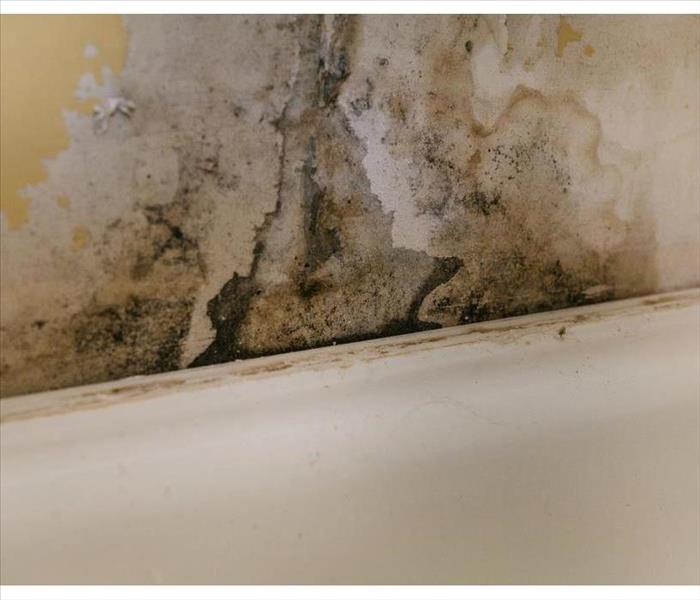 Flood damage a wall in a Flourtown, PA home.
Flood damage a wall in a Flourtown, PA home.
Content Cleaning After a Flood
After flooding, homeowners are faced with the hard labor of cleaning and drying out their homes. When those homes are affected by black water, that hard work often includes tearing out walls, discarding carpeting, and tossing many furnishings and belongings. Fortunately, a content cleaning service from a Flourtown, PA, flood remediation company may be able to save some of the most precious items.
Items You Can Clean on Your Own
For those belongings that haven't been contaminated, you can use the following steps from FEMA for salvaging your valuables:
- Set aside those things that are most important to you.
- Let items gently air-dry, handling them as little as possible.
- Carefully remove dirt and debris with soft brushes or cloths.
- Rinse and air-dry photographs.
- Freeze any items that you can get to within 48 hours. This protects books and documents from further damage.
After flood waters have fully receded, it's time to get everything dried out as quickly as possible. Remove wet items from the home, and document the damage while you work with a camera or cell phone.
Belongings That Should Be Discarded
At this point, many homeowners either want to chuck everything or save everything. Neither option is appropriate. Some items must be thrown out. These include composite flooring, particle board furniture, and any furnishings with signs of mildew. Upholstered furniture is often cheaper to replace than to recover. The same is true for mattresses.
Many of your valuables can be saved by professional content cleaning services. For example, if you have silver, contact a qualified restorer. If you have framed art, expensive rugs, or solid-wood furniture, the pieces can be saved if you get them out of the water quickly enough. Contact the appropriate professionals for help in your restoration efforts. Photographs, books, documents, and family heirlooms are usually worth the cost of hiring professionals.
Content cleaning efforts are a vital resource for homeowners who've experienced flooding. Separate out belongings to be discarded, those that can be saved by your own efforts, and those that require the work of professionals for the most successful flood recovery.
Protecting Your Business' Wind-Damaged Roof: 3 Steps To the Repair Process
1/8/2022 (Permalink)
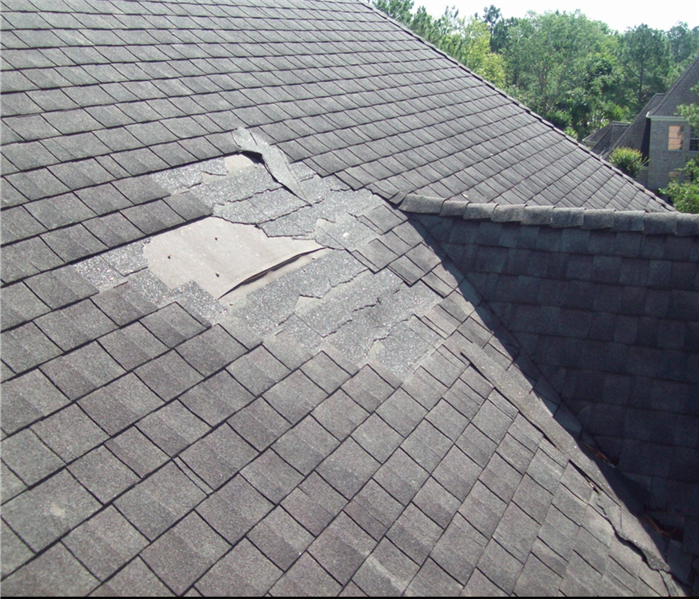 Missing roof shingles in a home in Plymouth Meeting, PA.
Missing roof shingles in a home in Plymouth Meeting, PA.
Protecting Your Business' Wind-Damaged Roof
The exterior of your Plymouth Meeting, PA, commercial building can be vulnerable to weather damage, including high winds. Wind storms can have an especially serious affect on your building’s roof and cause many different issues, including a roof leak and damage from flying debris. If your business’ roof has been affected by high winds, there are a few steps you can take to reduce the risk of additional issues and to facilitate the repair process.
1. Call a Mitigation Service
If your roof is missing shingles and has loose building material that may cause damage to nearby structures, it is a good idea to call a storm damage and mitigation service to have the roof cleared and damaged materials torn out. Mitigation techs can also use tarps and plywood to temporarily patch up any holes that may let in rainwater and cause damage to the interior of your building.
2. Asses Risks From Nearby Structures or Landscaping
If high winds continue to blow once your roof has been damaged, it might be vulnerable to blowing debris from a nearby property. For example, if you own a small building located in an area with many trees, broken branches could exacerbate any existing damage to your roof. Consider having any trees on your property trimmed back and ask nearby business owners to maintain their property’s trees as well.
3. Contact Your Insurance Provider
Filing a claim for your damaged roof as soon as possible can fund repair costs with more efficiency. While mitigation can help protect a broken roof to some degree, it may be prone to further damage or failure if repairs are delayed. It is a good idea to work with your provider throughout the filing process, whether you are dealing with a roof leak or a more serious issue.
High winds can damage your Plymouth Meeting, PA, commercial building’s roof in a variety of ways. However, knowing how to protect it from a roof leak and other problems until repairs can be made may reduce costs and prevent business loss.
How To Protect Your Building After a Fire
12/26/2021 (Permalink)
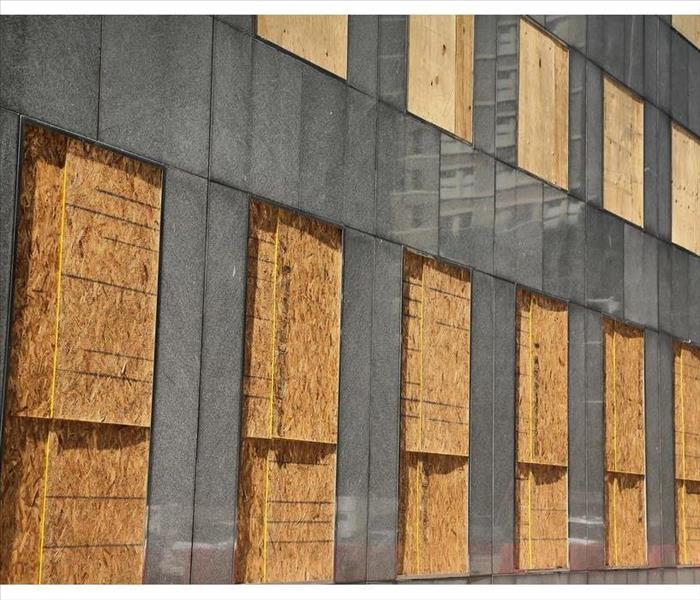 Board up building after a fire in Cheltenham, PA.
Board up building after a fire in Cheltenham, PA.
How To Protect Your Building After a Fire
After a fire, your business property will likely sustain extensive fire damage. Not only does fire destroy everything it touches, but the water firefighters use to put out the fire can cause problems with the structure, too. When a fire breaks out in your commercial building, your best course of action is to quickly call fire cleanup experts. They can help you take the following steps to safeguard your building from further damage.
Board the Windows
The heat from a fire often breaks any glass in the building. Windows are especially susceptible to breakage because they give the hot air a place to escape. This can leave your building in Cheltenham, PA, vulnerable to the following:
- Vandalism
- Animals
- Bad weather
While technicians are working on the roof repair and waiting for replacement glass to arrive, have them board up the holes left by the fire. This can help prevent secondary damage that would be added to your insurance claim.
Secure Tarps Over the Roof
It is unlikely that your roof will be repaired in one visit. However, the holes in the surface can lead to more damage if left exposed, so it can be a challenge to finish the repair in a timely manner if the roof is uncovered when repair personnel are not present. Tarp services are an essential part of the fire cleanup process. Depending on the extent of the fire and smoke damage, technicians may cover the whole roof or just the affected portions. Using a tarp prevents additional water and debris from getting into your building.
A fire in your building can cause significant fire, smoke and water damage. You can help keep outside elements from exacerbating these problems by using tarp services in Cheltenham, PA. Your fire cleanup crew can recommend the tarp and board-up services that you need to keep your building safe and secure until repairs are complete.
Common Signs of Water Damage in Your Commercial Building
12/13/2021 (Permalink)
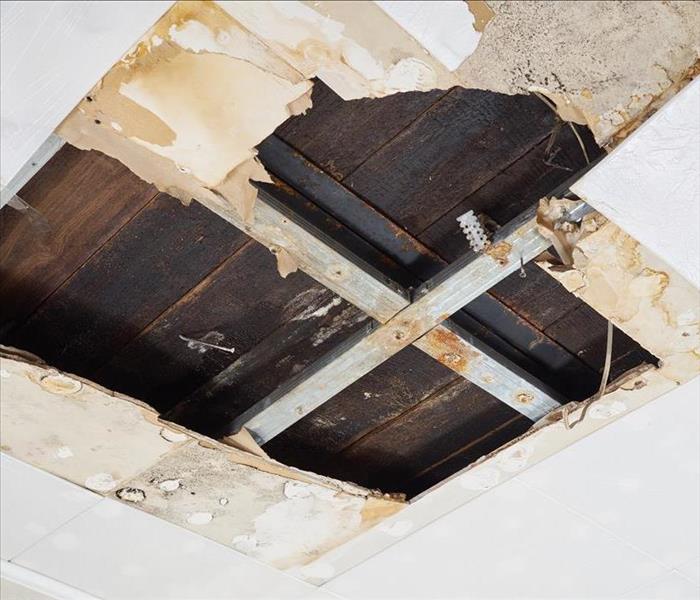 Leakage from the roof can create problems.
Leakage from the roof can create problems.
Common Signs of Water Damage in Your Commercial Building
Water damage is a common issue in commercial buildings. With so many systems and fixtures running through each structure, one broken pipe can lead to disaster. Water repair professionals near you can help you with these problems, but it’s a good idea to be aware of potential risks. Here are a few common ways flooding occurs in commercial areas in Cheltenham, PA, and how you can stop them from disrupting business.
Corroded Toilet Parts
If your commercial building has one or more public bathrooms, you might have to deal with toilet leaks, especially in buildings where these restrooms are used a lot such as clothing stores or restaurants. Toilet parts can wear down quickly and cause leaks, flooding, or clogged pipes. Luckily, toilet parts can be replaced easily.
Leaking Roof
Any roof can lead to water damage problems. Leakage from the roof can create problems for the rest of the structure, whether that be mold or damaged fixtures. A few ways your commercial roof may cause you problems may include these common issues:
- Clogged gutters
- Old roofing system
- Improperly installed skylights
- Damaged roof flashing
With roof maintenance and periodically checking up on gutters and other roofing features, you can stop water damage from occurring as severely.
Broken Pipe
Water pipes run through the walls and floors of your commercial building. When they burst, they can immediately cause damage to an area of the building. Take note if the pipes in the building are getting old. Swollen walls and stained ceilings are pretty good signs that there is a leak or burst somewhere in your building.
Although water damage can’t always be avoided, you can look for key signs that can help you prevent the worst damage. A broken pipe or toilet issue should be taken care of immediately, and the roof should be watched carefully, especially in the winter. With these tips in mind, you can take good care of your commercial building.
4 Steps To File a Fire Claim
12/13/2021 (Permalink)
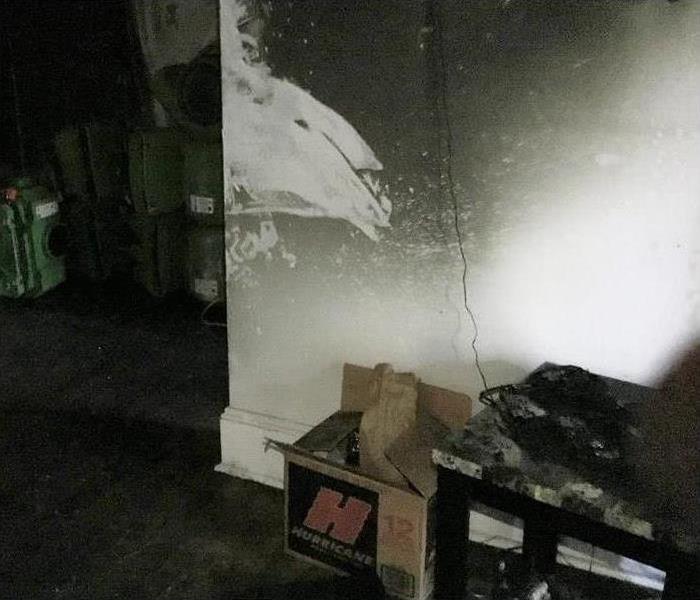 Fire damage in a home in Plymouth Meeting, PA.
Fire damage in a home in Plymouth Meeting, PA.
Filing a Claim After a Fire
An insurance claim can cover most fire restoration expenses. Throughout the filing process, it is crucial to document damage to the best of your ability and remain in contact with your insurer. Follow these four steps to file a claim after a fire at a residence in Plymouth Meeting, PA.
1. Notify Your Insurance Agent
Contact your insurer immediately after a fire. Your agent should arrange for an appointment with an adjuster. There is no reason to wait until this meeting takes place to start documenting damage and pursuing mitigation. Be sure to keep a list of representatives you speak with and make an extra copy of any documents you submit.
2. Document the Damage
It is important to obtain footage of primary damage before taking measures to limit secondary damage. Take photographs or record videos of fire damage. You may also want to contact a fire restoration firm to obtain an estimate. Footage that captures the condition of your home prior to the fire can strengthen your claim.
3. Take Mitigation Measures
Once you have finished documenting, it is time to start mitigating damage. This may involve boarding up broken windows, damaged doors, and any holes in the walls of the structure. It is also a good idea to tarp over a damaged roof. You may want to rely on professionals to do this work.
4. Meet With an Adjuster
When an adjuster visits your home, you should provide documentation of damage and allow this representative of your insurance provider to inspect the premises. After this home visit, you should prepare to file proof of loss and complete the filing process.
Filing a fire insurance claim can cover the costs associated with damage mitigation and restoration at a residence in Plymouth Meeting, PA. After you take all of these steps, it is advisable to pursue fire restoration and smoke cleaning immediately.
How To Handle Water Damage in a Commercial Building
12/13/2021 (Permalink)
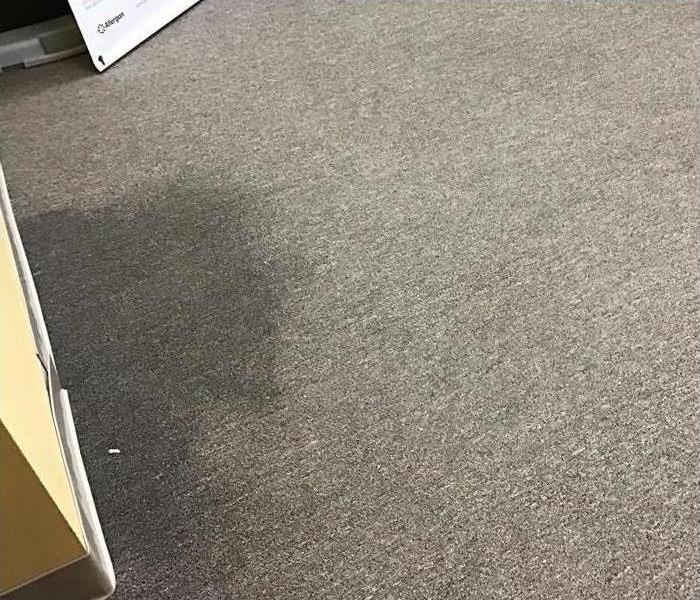 Water damage in Flourtown, PA.
Water damage in Flourtown, PA.
Water Damage In a Commercial Building
Whether it’s a pipe burst, a plumbing issue, or storm flooding, water damage can cause serious issues for a business. If this happens to your commercial building, your main priority should be drying up the moisture as soon as possible. Here are five damage tips you can use to make the process easier.
1. Identify the Source
The first thing to focus on is to stop whatever is causing the flooding. If it is through an internal system, shut off the water. Once you have done this, try mopping up extra moisture and removing carpets and rugs. Don’t forget to wear protective gear while dealing with potentially contaminated water.
2. Open the Windows
Natural ventilation is one of the best damage tips for preserving the structure of the building. Heat or forced drying can warp wood and prevent contents from drying completely. Open windows if it isn’t humid outside and turn on fans for air circulation.
3. Remove Valuables From Affected Areas
When it comes to damaged technology, documents, and other precious items, water is a known culprit. Move valuables upstairs or away from flooded areas and freeze exposed documents to prevent further exposure and deterioration.
4. Get Professional Help
If you want to get the restoration process going as quickly as possible, call in remediation professionals. A restoration company can give you immediate advice, share cleaning tips, and suggest where to go next. They can also help dry the building, prevent mold from spreading, and restore the structure.
5. Take Pictures of Everything
If your business in Flourtown, PA, has insurance, it’s a smart idea to call them and get compensation for your losses. Try to document all affected areas so that the insurance adjuster can assist you in the best possible way.
These water damage tips can help you avoid the most aftermath following a flood. By keeping a cool head and acting quickly, you can get started on the restoration process.
Flooding Basement? Follow These Steps
11/23/2021 (Permalink)
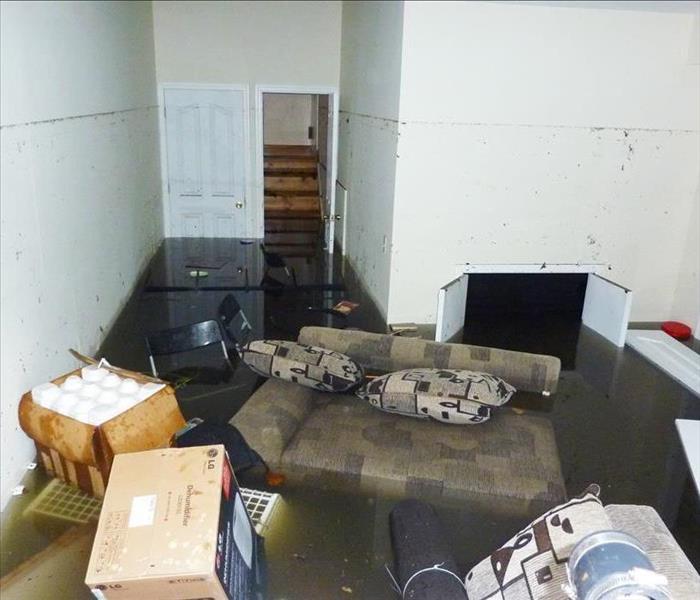 Flooded basement in Whitemarsh, PA.
Flooded basement in Whitemarsh, PA.
Flooding Basement? Follow These Steps
As a homeowner, one of your biggest nightmares is to discover a flood in your Whitemarsh, PA, house. Of all the places in your home where you might find flooding, the basement could be the most common. Knowing how water can enter your home and get into the basement can help you prevent water damage. If your best efforts still can't hold back the water, make sure you call a professional company to clean up.
Clear the Area
Once you discover a basement flood move any items in or near the water to higher ground. Don't turn on any electronics. It may be helpful to unplug them. However, if black water is in your basement, do not get near it for these reasons:
- Black water contains hazardous materials such as feces and silt.
- You could become ill if you come into contact with black water.
- Black water can be lethal if ingested.
Get the Right People on the Case
If the flooding is minor, you may be able to use a wet vac to extract water. For more widespread floods, you should hire a water cleanup specialists. Professionals not only have the experience you can rely on, but they also possess the necessary tools and equipment to effectively clean the area. Technicians are accustomed removing floodwater, regardless of how the flood started.
Removal, Drying and Disinfecting
The team will first extract standing water in your basement as well as water that saturated carpet or furniture. Once there is no more water, the crew will thoroughly dry the area with dehumidifiers and dryers. Lastly, technicians will sanitize the floors, walls and other affected materials.
Restoration
Once the crew has cleaned the basement, it's time to replace any items that were damaged. Pipe repair may be necessary, and the team may have to replace flooring and drywall.
Your basement doesn't have to be a loss after flooding. Call in the pros to make the area look as good as new.
3 Ways To Prepare Your Business for Flood Damage
11/23/2021 (Permalink)
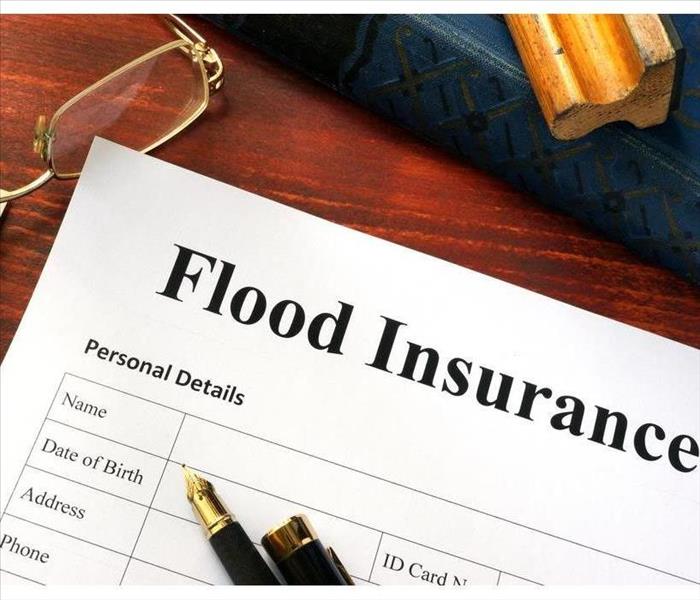 It's important to have flood insurance.
It's important to have flood insurance.
Prepare Your Business for Flood Damage
Flooding can cause your business in Cheltenham, PA, to sustain major damage, and the cleanup process can be expensive and lengthy. However, preparing your business for flood damage can help your business return to normal quickly after a flood.
1. Protect Valuable Items
When floods occur, they often occur without warning, giving you little time to move items in your business. Items that are left unprotected could be badly damaged or destroyed as a result of black water, or water that is contaminated with potentially hazardous bacteria. Keeping valuable documents and other items in higher areas within your building can protect them from water damage. Additionally, you should store your most valuable items in water-resistant containers.
2. Back Up Essential Data
Data helps a business run smoothly, and without necessary data, your business can face time-consuming setbacks. Since you may not have a chance to back up all of your data as soon as you hear about the possibility of a flood, it’s best to routinely save your data and make backups. There are various ways in which you can backup data by using cloud services or external hard drives. Having multiple places to store your data is best, in case one form of backup happens to fail.
3. Purchase Flood Insurance
To ensure your business can recover financially from the effects of a flood, it’s important to have flood insurance. Many insurance companies do not cover the costs of flooding, and it’s important to check your business’s policy to know what will and will not be covered in the event of a flood. If you already have flood insurance, make sure to renew it when needed.
Preparing your business for the impacts of flooding can offer you peace of mind and can save you money and time. In addition to taking preventative steps, make sure to contact the experts in flood damage restoration so your business can open its doors as soon as possible.
"Maintain Your Furnace to Avoid House Fires "
11/9/2021 (Permalink)
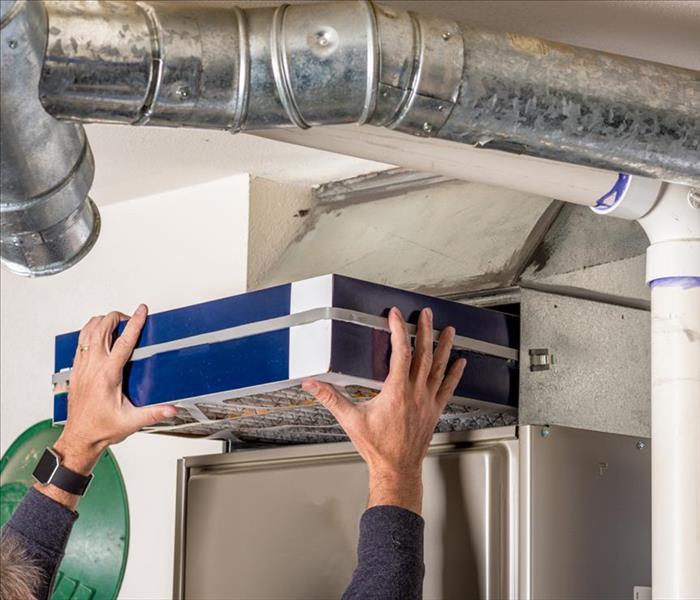 Keep your furnace running to avoid house fires.
Keep your furnace running to avoid house fires.
"Keep Your Furnace Running to Avoid House Fires"
If you've ever had reason to schedule fire cleaning, you know how frustrating even small home fires can be. Fortunately, some basic safety habits and routine furnace maintenance can reduce the possibility of fires in your Whitemarsh, PA, home. Heating systems are generally pretty self-sufficient and don't require much attention. With just a few quick and easy steps, you can keep your furnace in top condition for safe operation during the winter.
Visually Inspect Components When the Seasons Change
When your heating or cooling system does malfunction, one of the following components are probably at fault.
- Thermostat
- Power supply
- Ignition switch
- The blower
Keep the Units Clean
One of the worst enemies of heating and cooling systems is dirt. A buildup of dust and household dirt can lead to decreased fuel efficiency and increased wear and tear. Protect the efficiency of the furnace and heating system by regularly cleaning components and lubricating and adjusting belts.
Handle Repairs As Soon As They Appear
Whenever a problem occurs, begin your troubleshooting efforts with the simplest fixes. Sometimes, a little bit of common sense and patient efforts are all you need to avoid residential fires and the fire cleaning that follows. If you can't handle the repair yourself, you'll probably find that paying for minor repairs and upkeep is much less expensive than more extensive damage.
Maintain Personal Safety Throughout Repairs
Don't forget to turn off all power to your furnace or heating system before you complete any maintenance or repairs to avoid a household fire and the ensuring fire cleaning work. This may entail tripping the circuit breaker or even removing the fuse that controls the unit. If you notice electrical problems or smell of gas in your home, contact a professional to handle the problem. If you're not sure what to look for during inspections or how to move forward with repairs, you may want to contact a fire and smoke cleaning and restoration company to handle the maintenance.
Salvaging a Flooded Company: How to Ensure Your Employees Are Protected during the Cleanup Process
9/27/2021 (Permalink)
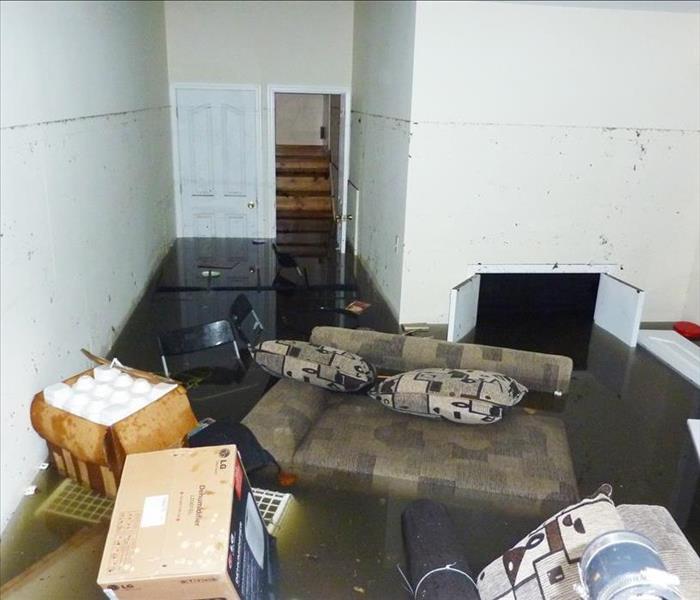 A flooded company, while devastating, can provide opportunities for team building.
A flooded company, while devastating, can provide opportunities for team building.
A flooded company is a devastating thing that can stem from a broken pipe or a flood in the Germantown, PA, area. When this type of disaster occurs, it can be second nature to want to begin the cleanup process immediately with all hands on deck; however, there are certain precautions that you may want to take to protect the health and well-being of your employees.
1. Enforce Hygiene Practices
Standard practice when cleaning up any water damage should be the washing of hands before eating or touching your face. Depending on the type of water damage, you may be working in a contaminated space that can pose health risks just from contact.
2. Enforce PPE Requirements
As to avoid any further health risks, workers should wear Personal Protective Equipment (PPE). This equipment includes facemasks, waterproof gloves, rubber boots, goggles, and water-repellent coveralls.
3. Enforce Vaccination Requirements
In addition to any protective clothing, employees should be up-to-date on their tetanus shots as well as hepatitis A and B vaccines. You can speak to an emergency manager to find out if there are any other vaccinations required.
4. Ensure Appropriate Training
Before entering a flooded company, you may want to provide employees with the appropriate training necessary for the particular damage they will encounter. This training should cover the above requirements and practices, ensuring that everyone is aware of their risks and responsibilities.
5. Call in the Calvary
Depending on the level of damage and the significance of the health risks, it may be beneficial for a company to pursue restoration specialists with the appropriate certifications, training, and experience to protect their employees and their business. While a burst pipe may result in a small flood, corrected with wet vacs and a dry cleaning delivery, that is simple enough for an in-house team to handle, large floods may require more skilled hands.
A flooded company, while devastating, can provide opportunities for team building; however, it is essential to prepare employees for the cleanup process by ensuring they abide by the appropriate requirements, practices, and training. Their safety is your ultimate responsibility.
How Vinegar Can Help You Salvage Moldy Belongings
9/16/2021 (Permalink)
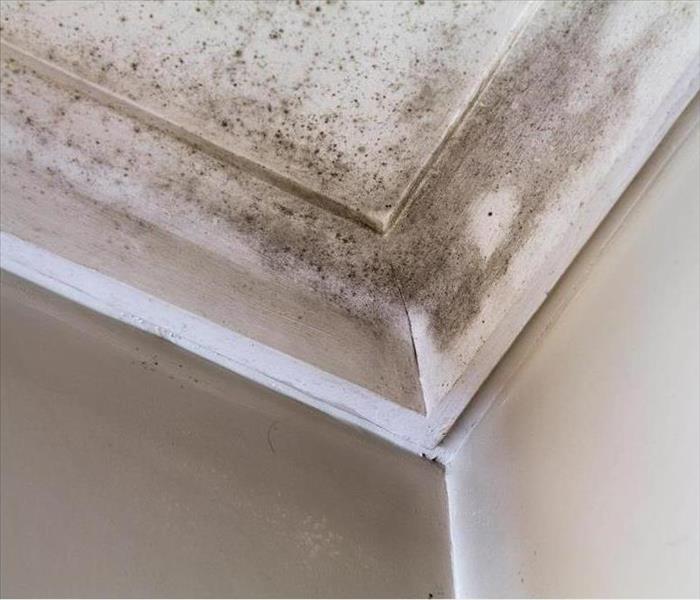 White vinegar is an efficient mold cleaning product, but it is not an ideal solution for every item in your home.
White vinegar is an efficient mold cleaning product, but it is not an ideal solution for every item in your home.
A flood or burst pipe can cause significant destruction inside your Whitemarsh, PA, home, including mold damage. Some items inside your home may not respond well to mold cleaning and may need to be discarded. However, you can increase your chances of salvaging many of your possessions, if you act quickly. A variety of chemicals can aid your mold remediation efforts including one that may surprise you, vinegar.
Vinegar’s Mold-fighting Power
The white vinegar inside your pantry is a mild acid that can efficiently kill most mold types. Unlike bleach, which can damage colored cloth, vinegar is safe to use on numerous objects.
1. Non-Porous Materials
Glass and tile are examples of non-porous materials that you can easily clear of mold. To clean these items, spray or wipe the affected area with vinegar, and allow it to sit for approximately one hour. Then, rinse with warm water. To prevent regrowth, spray the area again and allow it to air dry.
2. Wooden Items
Vinegar can also help you clean and salvage moldy wooden items if you address the problem quickly. To accomplish this task, mix white vinegar, soap, and water and wipe the contaminated wood. You can also scrub the solution into the wood with a brush.
3. Clothing and Upholstery
Fabric is porous and offers many potential hiding places for mold spores. Hidden spores that are not properly removed during mold cleaning may re-contaminate your home. For this reason, you may need to dispose of heavily contaminated clothing and upholstered furniture.
You may, however, be able to salvage lightly soiled items. You can add a cup of vinegar into your washing machine, along with detergent. Once the clothing is clean, allow it to dry in the sun, if possible.
Additional Assistance
White vinegar is an efficient mold cleaning product, but it is not an ideal solution for every item in your home. Mold-damaged books and other paper objects are not usually salvageable. Leather products and electronic equipment are other items potentially susceptible to mold damage. Because these belongings are delicate, you should consult a mold remediation expert to help you properly clean them and assure they are mold-free.
Removing Smoke Odor
9/9/2021 (Permalink)
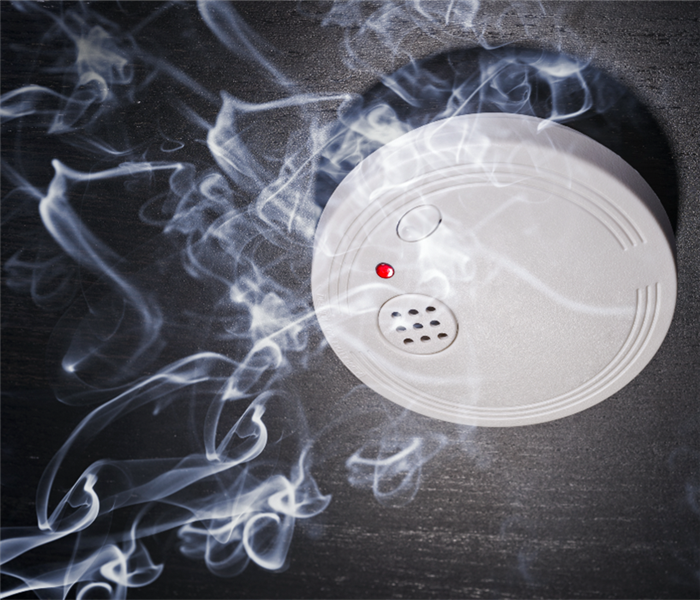 Whether you've experienced a minor fire or a major fire, you shouldn't have the life with the awful smell of smoke.
Whether you've experienced a minor fire or a major fire, you shouldn't have the life with the awful smell of smoke.
If you've experienced smoke damage in your home, then you probably know the smell tends to linger. It stays with the furniture and interior walls and flooring of the home. Removing the smoke odor can prove challenging, and possibly even impossible for the do-it-yourselfer. For homeowners in Cheltenham, PA, the best way to go about smoke cleaning is to work with a restoration company equipped with the training and tools to remove smoke odor for good.
How Professionals Remove Odor
Professionals have several options for smoke cleaning and odor removal. All of the equipment used by restoration professionals is industrial grade and requires hours of specialized training. This allows them to clean your home thoroughly and quickly.
Special Equipment
They'll likely start with an air filtration device. This device will suck in the air from your home and resupply it to the home after it has been filtered. The filtration device may be equipped with special filters made of carbon or treated filters, especially for the smoke.
They may also employ an ozone machine. This machine creates ozone that is capable of neutralizing the odor in the home's current air. The home is left with air that smells as fresh as the outdoors.
Thermal foggers can permeate the air and materials in your home with deodorizing droplets. The fog is light enough to penetrate any areas the smoke reached. When the treatment is complete, the lingering smell of smoke damage will be gone.
Whether you've experienced a minor fire or a major fire, you shouldn't have the life with the awful smell of smoke. Not only is it unpleasant, but it's a constant reminder of the disaster you experienced. Getting your home back to normal is an important part of the process of moving forward. Professional smoke cleaning will completely eliminate the odor with minimal inconvenience and little investment of time.
Mold Emergency: What To Do When You Have a Mold Problem
8/20/2021 (Permalink)
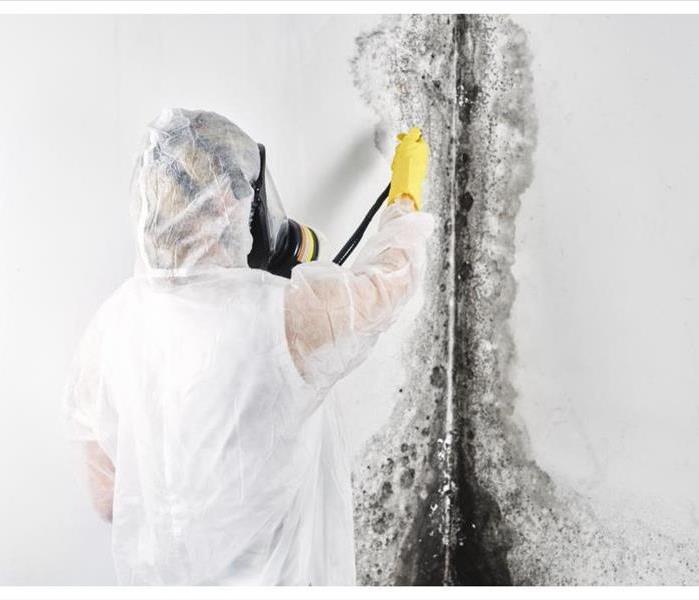 SERVPRO can help you contain the mold problem in your home and start to fix it.
SERVPRO can help you contain the mold problem in your home and start to fix it.
What To Do If You Have A Mold Emergency
When your home experiences water damage, it is important to have it cleaned up quickly, because black mold can start to grow within 24 to 48 hours. If you have a moisture problem, it is likely that you will eventually also have a mold problem. Here are a few tips on what to do and whom to enlist to help.
Immediate Action
Mold only needs three criteria to thrive:
- Air flow
- Moisture
- A little time
Mold spores are transported through the air. Then, they settle in wet places and start to grow. To prevent the spread of mold in your home in Cheltenham, PA, you must control the airflow and moisture. The first thing you should do is turn off your HVAC system. This slows the spread of mold spores through the air and hopefully will protect your air ducts from an infestation of black mold. The second thing you must do is turn off the water. This helps to control moisture by cutting off any leaks throughout your home at the source.
Calling In the Experts
Depending on the type and extent of the damage, you may need to contact several professionals to help you with mold cleanup and the issues that exacerbate further growth. Your first call should be to a mold remediation specialist. The specialist can help you contain the mold problem in your home and start to fix it. It is also a good idea to have your air ducts inspected and, if a problem is found, cleaned before it can spread any further. Finally, as it does no good to fix a mold problem without addressing the moisture problem that led to it, you may need a plumber or some other water damage professional to take care of the root cause.
Black mold is not a problem to be taken lightly. If you act quickly, however, in initiating mold cleanup, you can fix the problem and prevent it from spreading.
Dealing With Water Damage: Know What To Expect
8/19/2021 (Permalink)
 If your home suffers from water damage, call SERVPRO immediately!
If your home suffers from water damage, call SERVPRO immediately!
Knowing What To Expect When Dealing With Water Damage
Dealing with water damage in the home can be a frustrating and time-consuming process, if you don’t know what you’re doing. Fortunately, the professional water cleanup team in Whitemarsh, PA, has several tricks it can employ to make the recovery process easy, quick and hassle free. Whether your problem stems from bursting pipes or a severe flood, here is what you can expect from professional cleanup efforts:
- The process should take as little as three to five days to complete, though it can take as long as 10 days.
- Mold growth begins as little as 24 hours after water damage occurs, which is why it is so important to start remediation efforts ASAP.
- Some of your items may not be salvageable, so be prepared to throw some belongings out.
- Your insurance may or may not cover the damage, so speak with your insurance representative as soon as damage occurs to get an idea of cost.
Duration of Cleanup
How long your home takes to cleanup really all depends on two factors:
- Cause.
- Materials used in your home.
If bursting pipes were the cause of your damage, cleanup may be easier and less time consuming. However, if your home was flooded with black water, cleanup could take exponentially longer. If the damaged area of the home had tile or cement floors, cleanup should take just a few days. However, if your floors are wood, it could take as many as 10.
Mold Prevention
Your Whitemarsh, PA, cleanup crew may focus on mold prevention first and foremost. This may include cleaning up, sanitizing and drying out the area.
Recovery
Depending on the extent of damage, you may or may not have to replace several of your belongings. Talk to your insurance company about what is covered and what is not. Some insurance companies may cover the cost of cleanup but not belongings or vice versa, while others may only cover the cost to fix broken pipes. Know what your policy covers so you can plan accordingly
Whether the damage to your home was caused by bursting pipes or a flood, it’s nice to know what to expect. Talk to your local water restoration company to learn more.
How to Protect Your Rented Building from Flood Damage and Loss
8/10/2021 (Permalink)
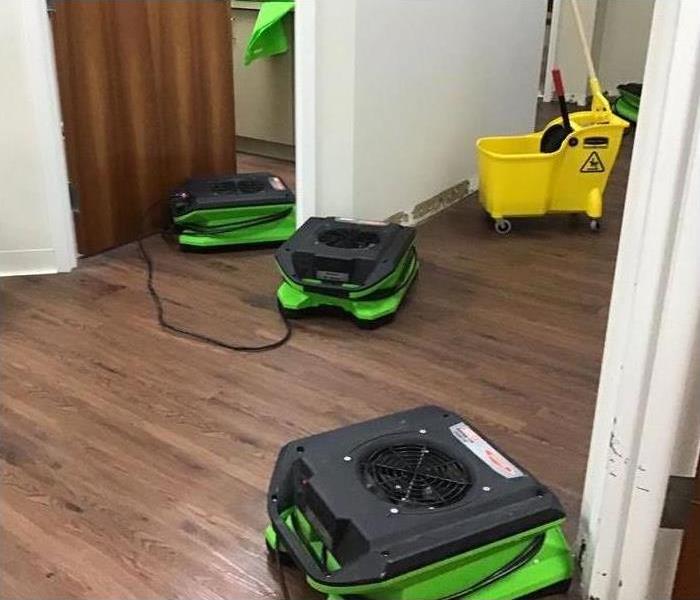 Drying equipment in Lafayette Hill, PA.
Drying equipment in Lafayette Hill, PA.
How to Prevent Flood Damage and Loss in Your Rented Building
If you rent a building in Lafayette Hill, PA, for commercial purposes, you may be preparing to take out renter’s insurance to protect your inventory and other belongings. One instance you may want to protect yourself from is flood damage, as floods can cause considerable damage to a building and its contents. However, before you sign off on a policy, it is important to understand what is covered, what the property owner is responsible for and the steps you can take to ensure you have the type of coverage you desire.
Know Your Responsibilities
When you rent a building to house your business, understanding your insurance responsibilities can be vital, whether you are renting one floor or the entire structure. When it comes to flood insurance, it is typically your responsibility to insure whatever you bring into the building. This includes any store inventory, machinery or electronic equipment. It is a good idea to go over each item with your insurance agent so you are guaranteed coverage in case of a flood.
Understand the Property Owner’s Insurance Requirements
When it comes to flood insurance coverage, your building’s owner is largely responsible for the structure itself. This means that he or she must provide coverage for whatever space you rent and cover repairs as well. You may want to ask the owner if they have a storm cleanup and restoration company on retainer for the removal of black water or mold that occurs after a flood.
Protect Your Business With Forethought
While renter’s insurance can protect you from the damage a flood can cause, you can also take steps to guard your business beforehand as well. Store important documents on a cloud service or back them up on a device you keep elsewhere. Avoid storing boxed records on the ground floor or pay to have them stored offsite.
Renting a building in Lafayette Hill, PA, for business purposes can be convenient and affordable. However, knowing what renter’s insurance you need before you sign off on a lease can help protect your investment from being lost in a flood.
Take These Steps to Minimize Flood Damage
7/26/2021 (Permalink)
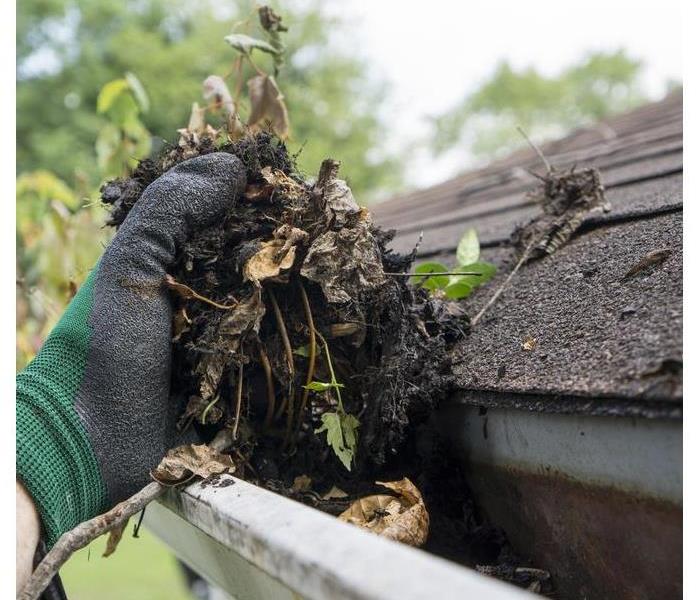 It is important to check your rain gutters once a year.
It is important to check your rain gutters once a year.
Minimize Flood Damage by Following These Steps
Do you worry every time a storm rolls through Wyndmoor, PA, that water will get into your home? Do you think you’ve prepared your property for incoming floodwater? If you’re not sure, it’s time to evaluate your storm preparation plans and ensure you’ve got things ready to keep water out and avoid damage. There are a few things all homeowners should do today to protect their homes.
Secure Your Valuable Belongings
While you should be most concerned about your loved ones and about your home itself, water damage can wreak havoc with your most treasured keepsakes and possessions. There are some things you simply can’t replace, so you need to find methods to keep them out of harm’s way.
- Place treasured materials in waterproof containers.
- Keep important documents such as insurance policies, tax information and mortgage papers in a safe deposit box.
- Take inventory of your precious keepsakes by taking photos.
Clean the Gutters
It’s important to get on your roof once a year (or more frequently if necessary) and check your rain gutters. If they are full of debris, you need to clear them immediately so when major storms come through Wyndmoor, PA, floodwater doesn’t gather around your foundation. Make sure the gutters are sending water far from your home.
Seal Vents and Lower-Level Windows
If you have vents that lead from the outside into your basement, you should seal them to prevent water from entering. A flooded building usually has problems start in the basement, so make sure there are no entry points for water in these areas of your home. Also, double-check your windows that they are secure and free of cracks or gaps.
Flood water can be devastating to your home and possessions. If you want to reduce your risk, you need to put these protective measures in place today. When you do this, you can have the confidence that you’ll be safe when a large storm drops significant precipitation.
How To Avoid Kitchen Fires
7/15/2021 (Permalink)
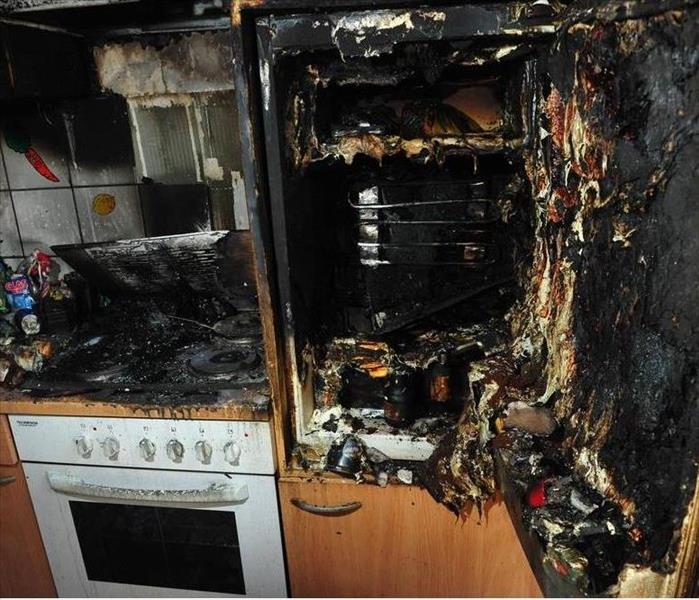 Protect your home and your loved ones from danger by paying attention when you're cooking.
Protect your home and your loved ones from danger by paying attention when you're cooking.
How to Prevent Home Kitchen Fires
There are few things so warm and comforting as inviting people to your home in Wyndmoor, PA for a meal you have prepared. What is meant to be relaxing can turn into an emergency if a fire breaks out in your kitchen, though. Fortunately, kitchen fires are easily avoided if you take a few key safety precautions. Here are three tips on how to avoid kitchen fires.
1. Give It Your Attention
Do not leave cooking food unattended. If a burner is on, you should be in the kitchen. It only takes a moment for something to boil over and catch fire or for small fingers to find their way to the burner in your absence. It may seem like a hassle to turn the stove off just to retrieve something from another room, but it's well worth the trouble if it keeps your home from suffering fire damage from a kitchen fire. Protect your home and your loved ones from danger by paying attention when you're cooking.
2. Keep Your Stove Clean
A dirty stove is a recipe for a disaster. Not only does built-up grease have the tendency to draw insects, it can also cause a grease fire. Cleaning all cooking surfaces regularly can help you avoid fire caused by oil residue.
3. Keep Flammable Objects Away From Heat Sources
If something can catch fire, it should not be near the burner on the stove. Pay attention to the tips on food packaging that warn you to keep it away from heat. Wear form-fitting clothing while cooking, especially on your arms so that sleeves don't dangle into danger. Potholders, recipe cards and kitchen towels have their place in the kitchen. That place is just not on the stove.
To be able to feed yourself and others can be a wonderful feeling, but having to call fire restoration specialists to fix your kitchen is not. By following these tips, you can avoid a kitchen fire and enjoy your meal.
Tips for the Mold Remediation Process
7/15/2021 (Permalink)
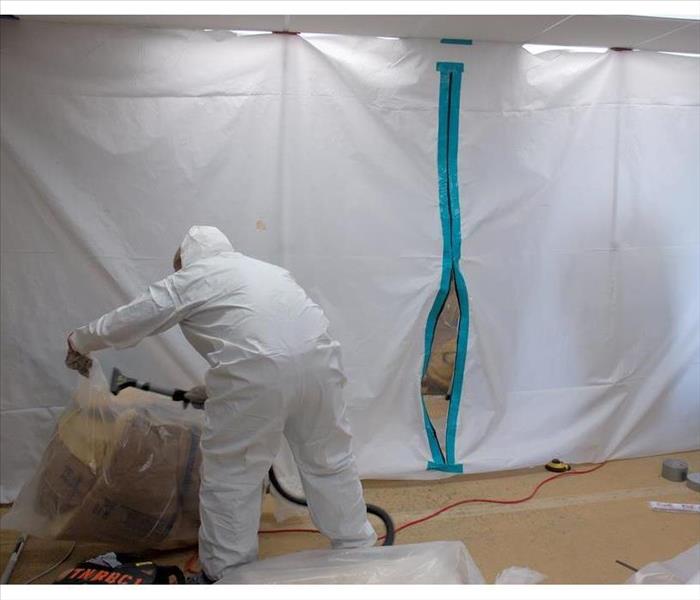 Mold containment in a Wyncote, PA property.
Mold containment in a Wyncote, PA property.
Mold Remediation Process
Mold is everywhere. It is naturally a part of the environment, and this includes the indoor air space of your commercial property in Wyncote, PA, as well as the outdoor area surrounding it. It doesn't become a problem until excess moisture in the building leads to mold growth on surfaces. If you see black mold or notice a musty smell, it may be time to call mold remediation experts to start the process of containing and eliminating the mold.
Containment
The first thing the specialists are going to do is try to contain the problem. After donning the appropriate protective gear, they may start to block off the affected area. If you are anywhere near the area, you need to wear the appropriate gear too:
- Goggles
- Coveralls
- Face mask with respirator
- Gloves
- Protective footwear
To limit the spread of black mold, it is a good idea to block off HVAC intake from affected areas. This can minimize the amount of mold that is spread throughout your vents and thus throughout the building.
Removal
During mold cleanup, it may be necessary to tear out walls where the mold has put down roots. It is often not enough to clean the surface of a wall or other porous structures, because mold does not just grow on the surface. It gets down in all the tiny cracks and pockets once it starts to grow, and it can do so rapidly. Remediation experts may have to remove and replace walls and insulation in order to resolve the issue.
Dehumidification
To avoid a return of the mold growth, it is a good idea to dehumidify the whole building, particularly the area where the mold was growing to begin with. Mold must have a moist environment to thrive. If you deny it moisture, you can prevent future mold problems.
If you need mold remediation, trust the experts. Their knowledge and skill can help you rid your building of black mold growth and keep it from returning. You can help by calling as soon as you suspect there is a problem and by keeping the humidity level low in the building.
How To Replace a Toilet
6/22/2021 (Permalink)
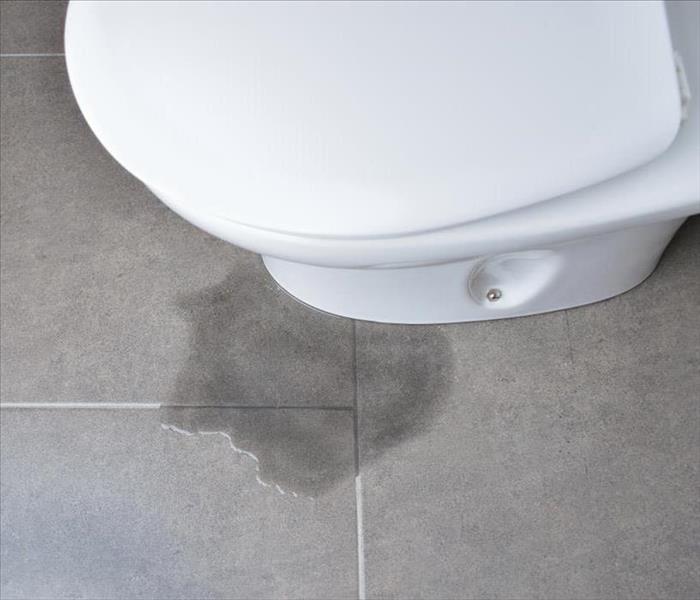 No one wants to deal with a leaking toilet.
No one wants to deal with a leaking toilet.
How To Replace a Toilet
If you have a leaking toilet in your Cheltenham, PA, home, you need to start making repairs as soon as the problem presents itself. Sometimes repairs are not enough to keep water from building up in your house. When this is the case, you may want to replace the toilet. Replacement can help you avoid major damage that would require you to work with a professional water remediation team.
1. Turn off the water. Before you can replace the old toilet, you need to get the field ready for work. This means turning off the water that goes to the toilet by twisting the shutoff valve. You may need to temporarily turn off the water to your entire house. If you skip this step, the liquid can spray into your bathroom.
2. Drain the water. Once you know no more water will be introduced to the toilet, you need to remove any that still remains. Flushing the handle allows you to drain extra water from the fixture, which can reduce the overall mess of the project.
3. Disconnect the supplies. Disconnecting the water supply hose will free the leaking toilet from its surroundings. Your plumber can help you make sure all the hoses are properly disconnected.
4. Remove the fixture. The next step is to take the entire toilet out of your bathroom. The cleanup professionals can help you carry the heavy, awkward fixture out of the house.
5. Install the new toilet. The final step in this toilet repair is to put in the new fixture. Because you want to make sure the installation is done correctly, you should turn to a plumber. This professional can help you hook up the supply lines to avoid a leaking problem in the future.
No one wants to deal with a leaking toilet. Doing a replacement can help ensure you don't have to hassle with standing water in your bathroom in the future.
3 Steps To Put Out a Grease Fire
6/22/2021 (Permalink)
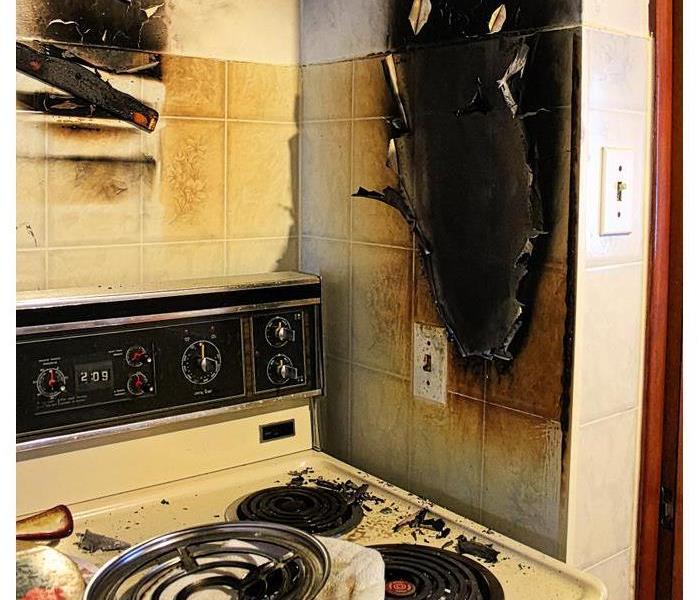 Kitchen fire in Plymouth Meeting, PA.
Kitchen fire in Plymouth Meeting, PA.
3 Steps To Put Out a Grease Fire
There are many flammable objects in a kitchen, making it one of the most dangerous rooms of any house. Without adequate cleanup regularly, a grease fire can develop. While you will need to hire professionals in Plymouth Meeting, PA, to take care of the fire cleanup, it may be possible for you to extinguish the fire on your own for the time being. Naturally, you want to follow the tips of the National Fire Protection Association and never do anything that makes you uncomfortable or puts you in harm’s way in relation to a fire.
1. Avoid Pouring Water on It
One of the worst things you can do for a fire caused by grease is pour water on it. Although it sounds counterintuitive, water does not mix with oil. Therefore, it will seep through the grease and evaporate on the hot stove.
2. Turn Off the Heat Source
You can prevent the grease fire from getting worse by turning off the heat source if you can do so safely. You can also attempt to starve the fire of any oxygen by placing a pot or pan over the grease. You will need to have protection for your hands, so you do not burn them once the pot gets hot.
3. Extinguish the Flame
There are a few methods available for getting rid of the grease flame. You can try pouring baking soda over the fire. You will need to pour a lot for it to work. Another option is to use a fire extinguisher, but you need to make sure you are several feet away from the fire. If you are too close, then the extinguisher will simply spread the flame around due to the force of the spray.
Make sure to clean your stove regularly to avoid a grease fire in the first place. If you are unable to put out the fire on your own, then contact professionals and evacuate your home for the time being.
Understanding the Difference Between Mitigation and Restoration
6/22/2021 (Permalink)
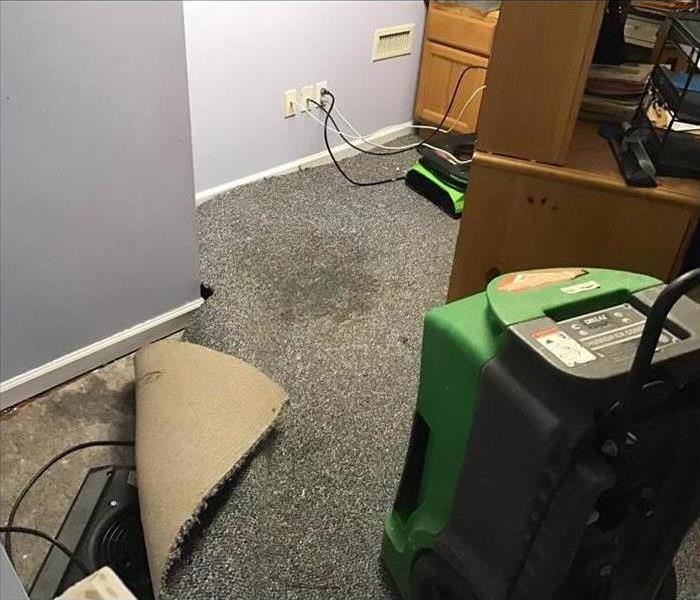 Call SERVPRO after storm damage.
Call SERVPRO after storm damage.
What's The Difference?
If storm damage affects your commercial property in Flourtown, PA, you need to do what you can to get your site back to normal. When you work with a local flood cleanup company, you may hear a lot of confusing terminologies. Some companies may talk to you about mitigation while others talk about restoration.
Mitigation
Mitigation is the initial clean-up right after a storm damages your property. This quick action may include the following:
- Boarding up holes in the roof
- Covering broken windows
- Removing standing water
- Creating a safety perimeter around the property
When you call in a flood cleanup company to tackle mitigation, the professionals will do whatever they can to stop the damage from getting worse. If your roof was left with a hole in it, for example, more rain may be able to enter your building. The mitigation process stops this from happening.
Often, this course of action is required before any restoration efforts can begin. After mitigation is done, you may still be able to see signs of damage and your building may not be ready for everyday activities to resume.
Restoration
Restoration, on the other hand, is a much slower process. A restoration company has to make sure the initial problem has been completely resolved. If a storm flooded your building, for example, the team would make sure all the water is removed and your entire space is properly dried out before starting any of the refurbishment efforts. Once that's done, they start cleaning up soot, removing damaged items and making necessary repairs. After the restoration is complete, your building should be back to its former glory and ready for regular business to resume.
After a storm damages your commercial building in Flourtown, PA, you may need to undertake both mitigation and restoration. A flood cleanup company should be able to help you plan and tackle both types of storm repairs.
3 Essential Things To Know About Black Mold in Homes
6/10/2021 (Permalink)
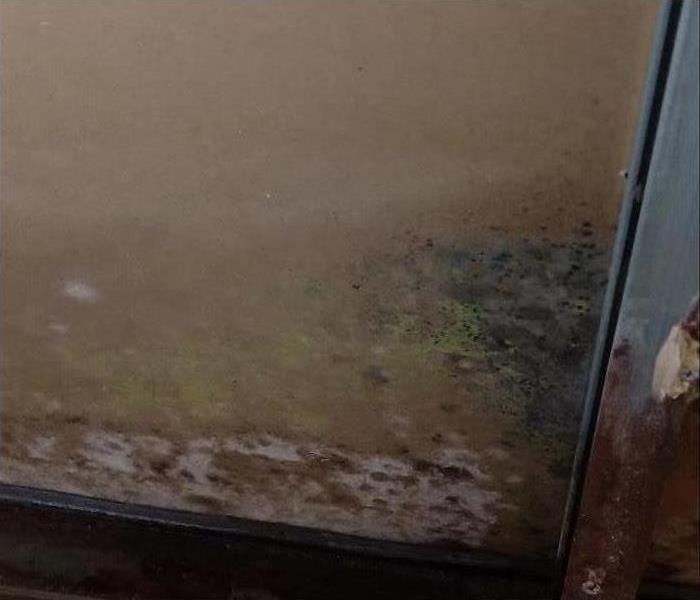 Mold development in a Whitemarsh, PA home.
Mold development in a Whitemarsh, PA home.
Three Things To Know About Black Mold In Homes
As a Whitemarsh, PA, homeowner, you may be worried about developing mold in your house. However, you may also be unaware of how home-based mold works. If you're looking to learn more about this subject, here are three essential things to know about black mold in homes.
1. What It Is
This type of mold is also known as Stachybotrys chartarum. It generally looks somewhat green-black, hence the popular label. The mold is partly unique because it grows on materials with high levels of cellulose. These are a few materials that fit this description:
- Paper
- Fibrewood
- Gypsum board
Since this type of mold releases spores, it can easily spread throughout the home. However, it's highly important to find the original source for mold cleanup.
2. Where It Grows
Black mold needs moisture in order to grow. Therefore, it tends to develop in the wetter areas of houses. One of the most important places to check is your bathrooms. Since so much water is introduced to bathrooms, many areas can sustain the growth of Stachybotrys chartarum. You'll also want to keep an eye on your kitchen and basement. If you live in a tropical area, you should regularly check these spots for signs of mold. It's also wise to immediately clean any spills or leaks you notice.
3. Next Steps
In the event that you find Stachybotrys chartarum in your home, you'll need to act quickly. Look for a mold damage restoration company to complete the mold remediation process. No matter what, don't try to clean the mold yourself. However, you should turn off your HVAC (heating, ventilating and air-conditioning) systems. Doing this can prevent mold from spreading, especially if it's in your HVAC systems. If the mold is extensive, you may also want to leave your home until an inspection is completed.
If you think there may be black mold in your home, it's essential to act quickly. Consult professionals and stay on top of the situation.
Why Commercial Insurance Can Be a Lifesaver for your Company
5/12/2021 (Permalink)
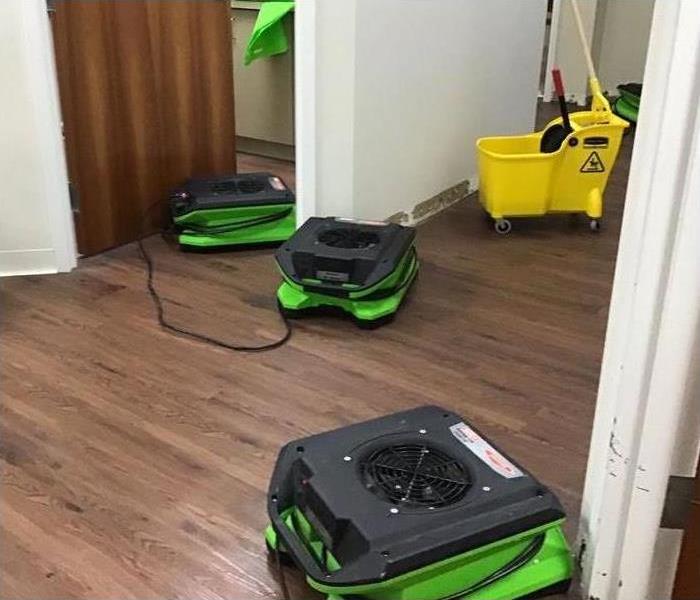 Commercial storm damage in Lafayette Hill, PA.
Commercial storm damage in Lafayette Hill, PA.
Business And Commercial Insurance
Powerful storms sweep through parts of the country nearly every day. They cause multiple billions of dollars to companies in the U.S. every year. A business that does not have robust storm insurance is at a much greater risk of failure than other businesses. The impacts of storms are many and far-reaching:
- Extensive damage to property
- A business interruption
- A potential loss of income
- Added costs and expenses
- Harm to employees and customers
Just one bad storm is enough to cost a company many thousands of dollars. Proper insurance coverage will pay many of the expenses caused by storm damage. This will enable a company to restore and rebuild damaged property.
What Storm Insurance Covers
Every insurance policy is a little different, but a comprehensive policy typically covers damage from storms and fires. Polices are normally structured in a way to have deductibles that must first be paid before insurance payments kick in. Larger deductibles tend to reduce the overall cost of the premiums. Here are some examples of what a comprehensive insurance policy will cover:
- Roof damage caused by high winds
- Hail damage as the result of large hailstones
- Wind damage that breaks windows or doors
- Water damage from roof leaks
In general, so long as the damage from a storm is not caused by the failure of a company to maintain its property, many expenses will be paid through the claims process. In a big storm, this can add up to a large amount.
How Restoration Services Help
While proper insurance coverage will pay for many types of damage, a company will still need the services of a local storm restoration company in Lafayette Hill, PA. These experts will arrive on the scene after a storm and restore the building to its original condition. Storm insurance is one of the main foundations of a strong business. It pays the way for a fast and successful recovery.
3 Steps to Take in Case of a Fire Sprinkler Leak
4/29/2021 (Permalink)
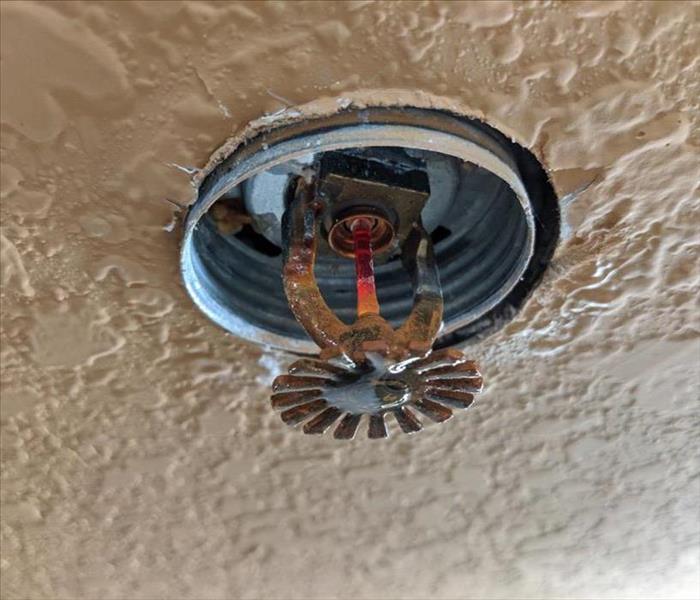 Leaking fire sprinkler.
Leaking fire sprinkler.
Steps To Take In Case Of A Leaking Sprinkler
Property owners in Wyndmoor, PA, know that having a fire sprinkler system installed on their property means added security and peace of mind. Keeping the system maintained is important to ensure its functionality for fire suppression. When you notice a sprinkler leak, you should act immediately to prevent damages.
Sprinklers can leak for many reasons, including:
- Corrosion
- Bad installment
- A damaged sprinkler head
When a sprinkler leaks, it can cause damage to the area where the water drips, especially if it is not repaired fast. Here are some steps to take in case of a leaking sprinkler.
1. Determine the Cause
The first step to take in case of a leak in your system is to determine the cause. In an older system, check the sprinkler head thoroughly to make sure it has not been damaged or corroded. If your sprinkler system is new, the fittings may have been tightened too far and need replacement. You can opt to do this yourself or to call a repair company to help.
2. Contact the Company That Installed Your Fire System
Many companies will provide a warranty for your fire sprinkler system. Contact the installment company to check if the company will cover the leak before searching for other services. If your system is not under warranty, search for the best repair company for you. It is best to collect quotes, compare prices and read reviews before settling for a service.
3. Contact a Fire Damage Restoration Service
If the cause of a leak is that the system has activated due to a fire, a fire damage restoration service will help to clean and restore your property to prevent loss. Contact your local restoration service for fire sprinkler cleanup. Doing this will save you the headache of cleaning after a fire.
Fires are one of the top reasons for property loss. Property owners will benefit from having a well-maintained fire sprinkler system. This will help with fire suppression and protect you from costly damages.
Exploring the Different Types of Fire Extinguishers
4/8/2021 (Permalink)
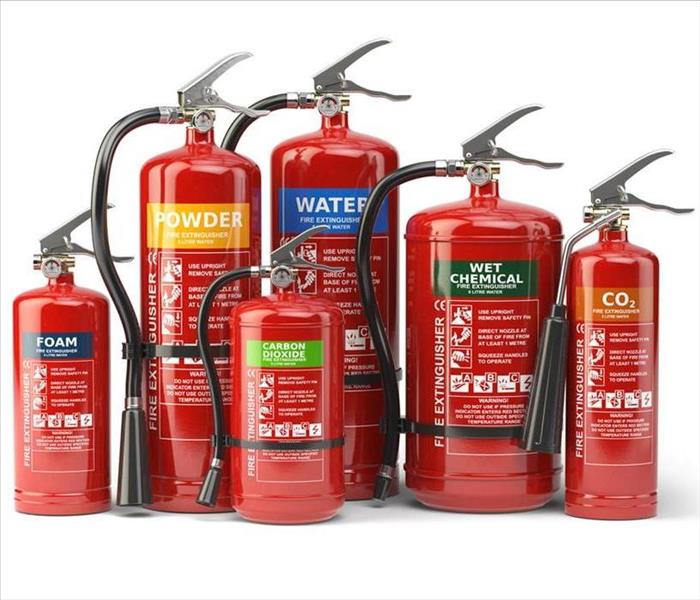 Keeping a fire extinguisher in various rooms is also part of a complete plan.
Keeping a fire extinguisher in various rooms is also part of a complete plan.
Types Of Fire Extinguishers
Responsible homeownership means having an insurance policy that covers damages to your house and its contents due to a fire. Usually, entities with a financial interest in your house, such as a mortgage company will require borrowers to carry this coverage, including properties in Flourtown, PA. Being a good homeowner also means staying on top of fire preparedness. This includes being careful about the use of open flames in your property. It also means having the means to put out or control a blaze, such as having a sprinkler system that operates when a home fire is detected. Keeping a fire extinguisher in various rooms is also part of a complete plan, but not all types are created equal. Here’s what you should know.
Taking a Closer Look at Extinguishers
Extinguishers come in three different classifications based on effectiveness against a type of blaze. Class A refers to fires caused by trash, wood and paper. Class B includes fires started by flammable liquids, while class C is for blazes caused by live electricity. Each fire extinguisher has a label with the classification and a number that corresponds to the device’s effectiveness. Extinguishers come in different sizes that correspond to usage:
Stove-top: Ideal for mounting above a range or oven
2-pound: Good for use in a vehicle
5-pound: Easily accessible in a kitchen or utility room
10-pound: Best for garages or workshops where a blaze can rapidly spread
Taking Care
It’s important to make sure that these fire defense items are stored properly. Should a home fire occur, you don’t want to learn that the extinguisher is not where you need it or has lost pressure. Extinguishers should be replaced or refilled after a single-use.
While you never hope to experience a home fire, you should be knowledgeable of what to do in advance. Professional fire remediation experts can help restore your home to pre-damage conditions, but proper use of a fire extinguisher can reduce overall damage. It can minimize the time it takes to repair your home.
What Is Business Interruption Insurance?
4/8/2021 (Permalink)
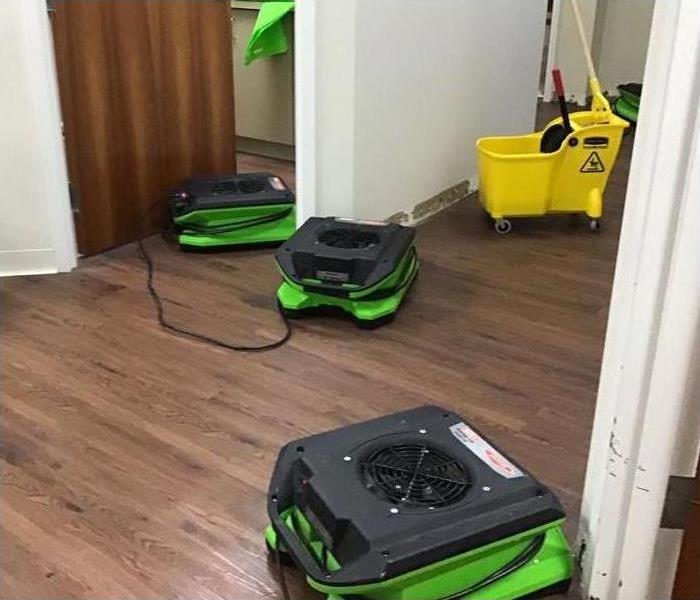 Drying equipment in Wyncote, PA.
Drying equipment in Wyncote, PA.
Running a business is tough when you don't have the right insurance. A coverage option that business owners must have is interruption insurance. This is designed to help cover income loss while you rebuild your livelihood.
What Does It Cover?
Unlike property insurance, this will not cover costs associated with your rebuild in Wyncote, PA. Instead, it will cover operating expenses, such as:
- Revenue
- Mortgage, rent, or lease payments
- Loan payments
- Taxes
- Payroll
- Relocation costs
- Extra expenses
- Training costs
What Is a Restoration Period?
Your restoration period is the time that you can receive benefits from your interruption policy. Generally, it takes two or three days for your period to start. Typically, it lasts long enough for you to rebuild your business.
How Much Coverage Do You Need?
Every policy has a specified coverage limit. The limit is the maximum amount of money you can receive from filing a claim. Unlike property insurance, which covers undetermined costs like hiring a storm remediation company, interruption coverage is easier to calculate. You can calculate appropriate coverage based on your regular gross earnings. Keep in mind that any costs going over your policy limit will need to be paid for by you, so it is better to estimate growth rather than be left without funds.
What Does It Cost?
Each policy has a unique cost. Typically, it depends on your industry, employee numbers, and the coverage you need.
What Are the Exclusions?
This type of insurance is designed to support the income of a closed business. It does not cover damaged items, flood damage, undocumented income, utilities, and communicable disease-related shutdowns.
If a disaster happens, business interruption insurance can protect you and your company. It is a good way for small businesses to protect themself financially. It does this by offering a source of income when a business is shut down. However, it does not cover any damage directly related to a disaster.
Everything You Should Know About Water Damage
3/3/2021 (Permalink)
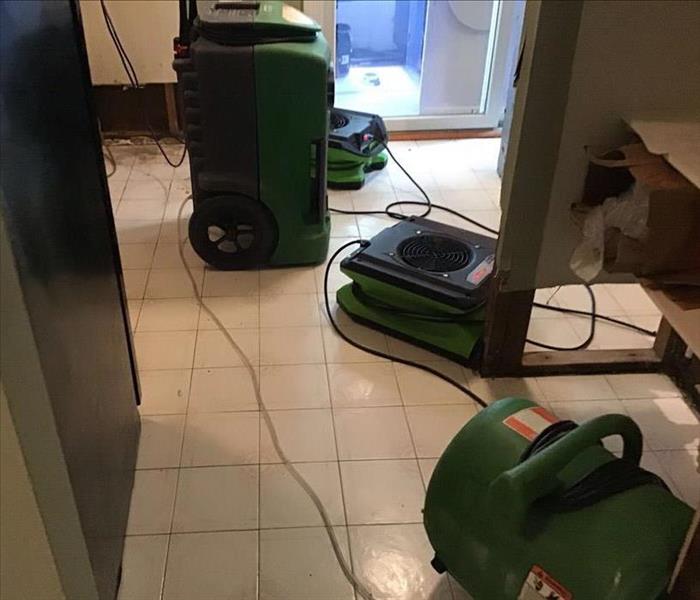 Water damage restoration in a Plymouth Meeting, PA home.
Water damage restoration in a Plymouth Meeting, PA home.
A pipe burst, a rooftop leak or a flooded basement are stressful situations, especially if you are a new homeowner in Plymouth Meeting, PA. Water damage can devastate your home and your belongings if you do not act fast and appropriately. Prepare for these situations by learning more about them, including potential damage causes, the cleaning process, and the restoration of the affected area.
Water Damage Causes
Your house can be damaged by a variety of water-related incidents. As you look for the culprit behind the damage, consider the following causes:
- Leaking/broken water line and pipes;
- Natural disasters (thunderstorms, tornadoes, etc.)
- Firefight aftermath;
- Sewage backups
- Malfunctioning bathtubs, sinks and toilets
- Leaking water appliances;
If possible, repair the source or hire an expert to fix it immediately. Record any information so you can provide it to your insurance company and water damage repair technicians. Consider these likely incidents as you enact preventative measures.
Cleaning Process
Once the pipe burst or leak is controlled, the remediation crew will inspect the damage, remove the water and dry every impacted surface. After those steps are complete, they will move on to cleaning the location. Any water damage, from leaks to flooding, carries some degree of contamination. The professionals guarantee your household's safety by eliminating as many germs as possible. They might use antimicrobial, antibacterial or disinfectant treatments as needed.
Final Restoration
After the damaged area is completely sanitized, the crew will start the restoration process. This service can be as minor as repainting walls, repairing wet drywall and installing new carpet. It can also be as extensive as rebuilding entire sections of the building. The employees will try to repair contents as much as possible to keep your expenses low. They will only replace when the material has been damaged beyond salvation.
Disasters that cause water damage such as a flood, a broken appliance and a pipe burst can be overwhelming, especially if it is your first time dealing with them. Learn everything you can to anticipate these specific circumstances.
How To Create an Inventory
2/19/2021 (Permalink)
 Keeping an inventory of all of your items ensures that you get paid for any losses you make on your insurance claim.
Keeping an inventory of all of your items ensures that you get paid for any losses you make on your insurance claim.
How To Create an Inventory
When filing an insurance claim, you are going to need to provide documentation of the damage. The best way to do this is with an inventory. Having a detailed list of everything in your business can ease some of the stress of the situation. This means you can focus on choosing a disaster restoration company and getting your business back to normal.
Include Important Information
To file a claim, you are going to need to prove your loss. This means you will need a detailed record of everything in your business in Cheltenham, PA. Otherwise, you will have trouble recounting all of your items and their details to your insurance agent. Here are some important details you need to include in your list:
- Photographs
- Descriptions
- Make, models, and serial numbers
- Receipts
Be Thorough
Creating this list may seem daunting, but it is important that you are thorough and don't skip any items. When you make your list, you can ensure that you don't miss anything by breaking your business down into sections. Then, you only have to worry about staying organized as you move between these areas. As you work, make sure to take pictures and videos of individual items and entire rooms. Once you have finished your list, create multiple copies and store them in safe locations, so you know you won't have to worry about your only copy getting destroyed or lost. Also, make sure you add any new items to your list as soon as you purchase them.
Use an App
Today, you no longer need to rely on written lists for taking inventory. You can download a mobile app to your smartphone that allows you to create and organize your list and easily send it to your insurance company and chosen remediation professionals, such as SERVPRO.
Keeping an inventory of all of your items ensures that you get paid for any losses you make on your insurance claim. This can help your business get all the replacement items it needs to start operating again.
5 Ways To Prevent Frozen Pipes
2/10/2021 (Permalink)
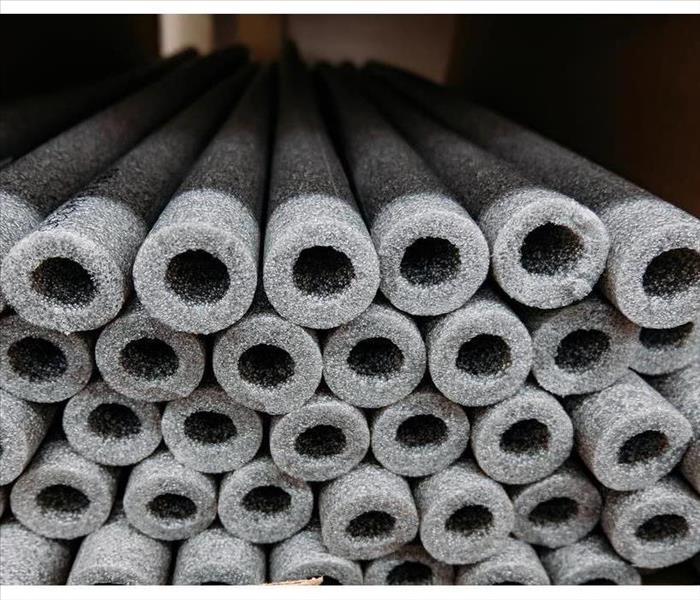 Insulate your pipes.
Insulate your pipes.
Here Are Some Ways You Can Prepare
The snow and holidays of winter can make it a fun season for many, but it can be less so for business owners with unprepared plumbing. Indeed, freezing temperatures are often a leading cause of broken pipes. For this reason, you should take steps now to make sure your commercial property is ready for the cold season. If you want to reduce the chances of needing the help of a water damage remediation expert, consider the following ways you can prepare.
1. Keep the Water On
Even if it might cost you more with energy bills this winter, spending the extra money can be worth it. By keeping some faucets turned on, you can allow water to continuously flow. This can prevent lines from freezing.
2. Turn Up the Thermostat
In order to keep pipes warm, you need to keep the building warm. Even when you are not open, make sure you keep the thermostat set above 55 degrees Fahrenheit.
3. Close the Doors and Windows
Another way to minimize your risk of expensive water cleanup is by ensuring you close doors and windows. This includes any basement or garage doors as well. If there is anywhere frigid air can seep in, it can lead to one of the most common causes of frozen pipes which often results in water damage.
4. Open Backroom Storage and Cabinets
While you are closing your doors, you may want to open backroom storage and cabinets that surround plumbing. Doing this can allow warm building air to find its way into the enclosures.
5. Insulate Your Pipes
One of the most straightforward ways you can prevent freezing of your pipes is by making sure you insulate them well. A good way to do this is by installing heat tape. You can ask a professional if you need assistance.
When it comes to preventing frozen pipes and the subsequent water damage that can come with them, there are several things you can do. With a little planning, you can rest easy knowing your business is ready for the winter.
3 Tips for Dealing With Mold
1/26/2021 (Permalink)
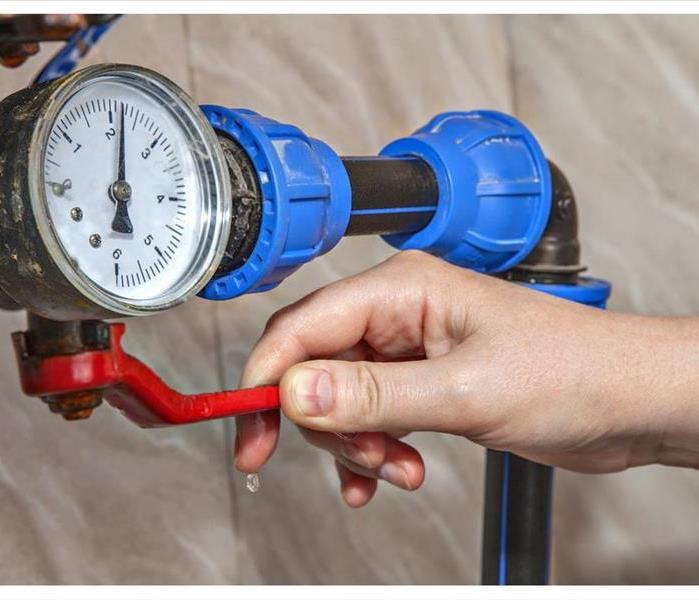 By shutting off your water, you limit any opportunities for mold to expand
By shutting off your water, you limit any opportunities for mold to expand
Tips That Will Help Slow The Spread Mold
Does your building in Whitemarsh, PA, have a moisture problem? If you've noticed any black mold or other microfungi, it's best to call in a mold cleanup professional right away. Until they arrive, there are some tips to follow that will help slow the spread of mold.
1. Turn Off Water
Mold needs a few key environmental conditions to grow — moisture being a big one. By shutting off your water, you limit any opportunities for mold to expand. This is especially important if the original mold growth was caused by a leaky faucet, pipe, or other fixture. Shutting off the flow stops the leak and the mold; it also has a beneficial side effect of stopping any possible further water damage.
2. Shut Off HVAC
One of the other major environmental factors that mold requires to grow and is airflow. Any mold must continuously have a food supply in order to stay alive and continue to multiply. Usually, that food source is sugar and starch in the cellulose in the material of your building. To reach new food sources, airflow is needed. Thus, by shutting off your HVAC system, the spread of mold is limited. Another benefit to shutting off the system is a temperature change. Black mold and many other kinds require a specific temperature range to grow. While mold isn't as picky as your typical houseplant, it still can only tolerate temps as low as 40 degrees Fahrenheit.
3. Clean Nearby Surfaces
While it's advised to leave the dirty work to the experts, you can limit mold growth by cleaning other areas. Any places around where mold has grown should be disinfected with a water and bleach solution. The most common mixture is 1/3 cup of bleach per single gallon of water.
With the right knowledge under your belt and a licensed professional, any mold (even black mold) doesn't stand a chance.
5 Ways To Prevent Water Damage
1/12/2021 (Permalink)
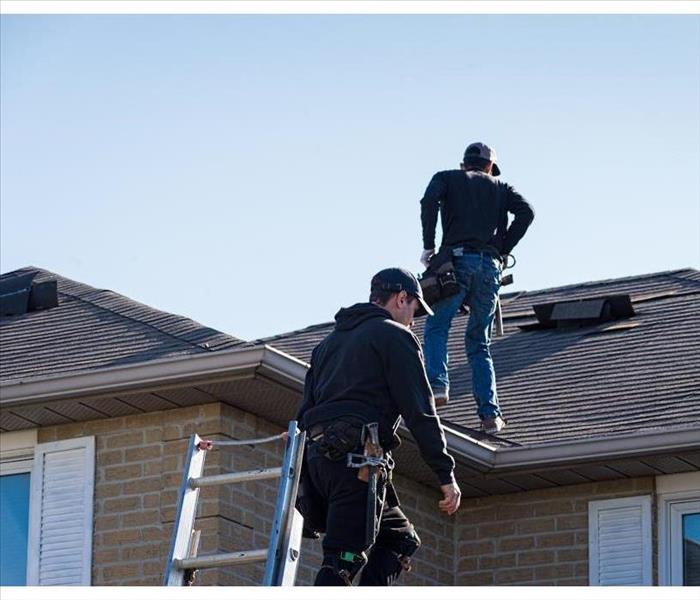 Inspect your roof
Inspect your roof
Prevent Water Damage In Your Home
It is not uncommon to have damage from water in your home in Lafayette Hill, PA, but it can be costly. Taking the time to keep your house and plumbing well-maintained reduces the likelihood of dealing with frustrating pipe cleanup.
1. Check for Leaks
Inspect the areas around pipes for signs of moisture:
- Stains on the ceiling
- Dark spots inside sink cabinets
- Dripping faucets
- Leaking around the base of toilets
- Discoloration on windowsills
2. Locate Your Shut-Off Valves
Make sure you know how to shut off the water in case of an emergency. Locate the following shut-off areas:
- Inline valves to your sinks and toilets
- Valves to turn off the water to your washing machine or dishwasher
- Hot water shut-off for your water heater
- The main water line valve
Turning off the water can prevent additional damage. Test the valves routinely to ensure they are working. If flooding does occur, call a professional water restoration service to get your house back to its best.
3. Inspect Your Roof
Routinely check the roof and insulation for discoloration or other water damage signs. Inspect recessed lighting in the attic for rust or stains indicating moisture. Repair loose, missing or worn-out shingles and moisture barriers as needed to prevent water in your home.
4. Clean Your Gutters
Clean your gutters twice per year. If you live around many trees, you may want to clear them out more often. If gutters are clogged by leaves, nests, and debris, rainwater runs down the side of your house. This poor drainage causes damage to the siding and the foundation, creating pathways for moisture to flow inside.
5. Prevent Pipe Damage
Protect your pipes from freezing in cold weather. Install a leak detection system to alert you to a possible broken pipe or low temperatures. Taking measures to avert damage is easier to deal with than pipe cleanup from burst lines.
Sometimes, issues from water in your home are inevitable. However, with regular home maintenance checks and repairs, you can often prevent costly flooding situations.
3 Tips for Returning Your Building to Normal After a Fire
1/12/2021 (Permalink)
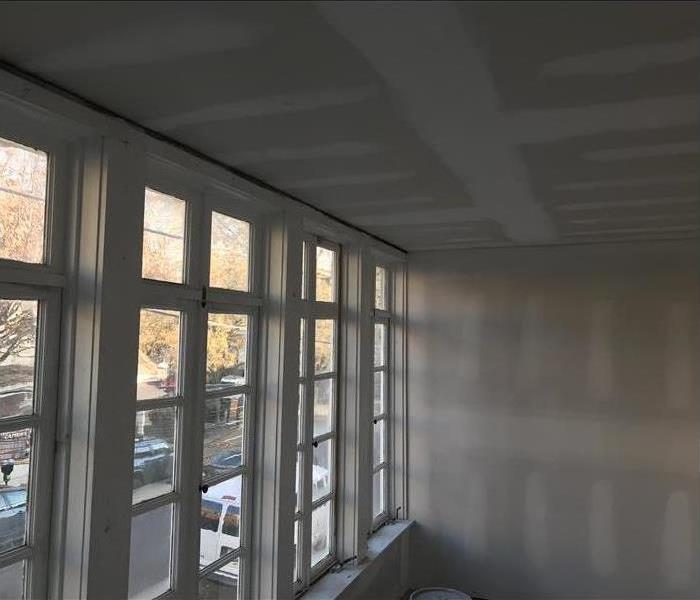 Commercial fire restoration in Whitemarsh, PA
Commercial fire restoration in Whitemarsh, PA
3 Tips for Returning Your Building to Normal After a Fire
If your building in Whitemarsh, PA, has suffered from a fire, it can feel like things will never return to working order. Rest assured that even the most stubborn of smoke damage or sooty walls can be cleaned or replaced with the right knowledge.
1. Be Informed
Many business owners overlook smoke damage. This is understandable, as the sheer visual impact of the direct fire damage itself seems overwhelming. However, before the cleanup process, be informed that soot damage and the like are just as important. These smoke-related damages need to be addressed just as you would serious fire damage.
2. Assess the Damage
Though it can be hard to look past the evident fire damages, try to determine the state of any smoke-damaged items such as walls, furniture, electronics, and more. Remember that smoke permeates everywhere — no item is completely untouched. Due to its chemical composition, smoke acts as an acid-like corrosive. So, as you're inspecting items, look closely. The effects may already be noticeable.
3. Call In a Professional
The best part is that even if some of your building is already damaged by smoke, most items can still be saved. The most important tip is to call in a professional smoke cleanup service as soon as you can. These experts arrive equipped with special tools to restore all types of materials. Furniture is saved with powerful smoke detection and removal, and soot is cleaned off walls with precision and care. Smoke cleaning is a delicate task that is best left to these specialists. Rest assured that your building is on its way to being restored to working order with efficiency and diligence.
Fire and smoke damage can feel like a lot to take in, but, with the right knowledge and a professional at your side, you can feel confident knowing that your building is in good hands.
3 Things To Know About Mold Damage After a Flood
1/12/2021 (Permalink)
 Mold can grow anywhere
Mold can grow anywhere
Mold After Flood
One of the reasons that flooding can cause such devastating damage to a home is that damage, such as mold growth, often continues to occur long after the floodwater has receded. These are three things you should know about mold after a flood.
1. Mold Begins To Grow Rapidly
Mold spores naturally occur in the air and are already present in your home. Mold grows rapidly in the moist conditions created by standing water. It may begin to multiply in 24 to 48 hours after floodwaters enter your home. Because the mold will continue to grow rapidly as long as damp conditions exist, it is important to dry your property out as soon as possible. A water mitigation company in Cheltenham, PA, can assist you with this process.
2. You Can Take Steps To Prevent Mold
As soon as it is safe to enter your home after a flood, open windows and doors to provide ventilation and help dry out the property. Remove all wet items and debris. Clean hard surfaces with disinfectant or sanitizer. Discard porous materials that may have mold growth. Dispose of the carpet if you can. If you can not, use a wet/dry vacuum or carpet extractor to remove moisture. Use fans to increase air circulation. Run dehumidifiers to reduce the amount of moisture in the air.
3. Mold Can Grow on Your Contents
Mold isn't just a problem for wet furniture, carpets, and walls. It can grow on anything in your house. Dispose of any food that has gotten wet. Not only is wet food likely to mold, but it may also contain harmful bacteria. Wash and sanitize your clothing, children's toys, and other personal items.
Mold growth is one of the many problems caused by flooding that can damage your home. These three tips can help you prevent or slow growth and avoid unnecessary damage.
What is Business Interruption Insurance?
12/26/2020 (Permalink)
 Business interruption insurance can help your company stay afloat during an expensive rebuild
Business interruption insurance can help your company stay afloat during an expensive rebuild
There are a lot of moving parts to worry about when it comes to purchasing insurance for your company in Flourtown, PA. One policy that many business owners tend to overlook is business interruption insurance. This type of coverage helps cover your losses while you rebuild after your commercial building suffers massive amounts of property damage.
What Does Business Interruption Insurance Cover?
Business insurance is extremely handy when a covered loss forces your company to close down temporarily. It covers operating expenses such as:
- Relocation costs, if applicable
- Taxes, both monthly and quarterly
- Rent, lease, and mortgage payments for your commercial building
- Employee salaries
- Any necessary loan payments
- The revenue you'd normally take in if your business was open
It's important to remember that these types of policies only cover operating expenses. They do not reimburse you for the actual damages, as those are listed under separate policies. Interruption insurance also does not reimburse you for utilities during the rebuild, as there's no reason to have electricity, water or gas running in a building that no one is using.
How Much Does the Insurance Policy Cost?
There are several factors that contribute to how much you'd personally pay for your closed business insurance. These include which industry you work in, the amount of employees you have, your building's location and the amount of coverage you actually want. Buildings that are located in areas that are more prone to natural disasters, such as hurricanes or wildfires, might have to pay more than companies that are located in places that are less danger prone. Talk to your insurance agent to see which types of policies you can acquire and how much you would have to pay for them.
Don't let expensive property damages destroy your company. Business interruption insurance can help your company stay afloat during an expensive rebuild. In the meantime, contact remediation experts for assistance resolving any property damages your commercial building may have suffered.
What if You Find a Leak Under Your Sink?
12/26/2020 (Permalink)
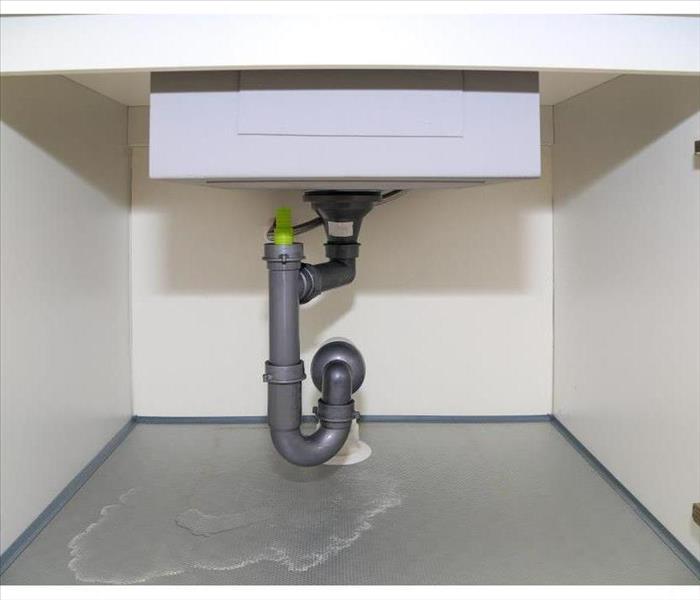 Fixing the leak should be the key priority now
Fixing the leak should be the key priority now
A hidden water leak is potentially a dire situation in Wyncote, PA. It can give the water time to cause severe damage, seeping behind barriers and gradually warping absorbent construction materials. It also can cause hidden flooding.
A leak under a sink often falls into this category. You need to be attentive for the symptoms and act quickly once the problem is discovered.
What Are the Signs?
Some sinks are above cabinets you may regularly access, but others may not be accessed for months (or longer). If you open the cabinet and see that it’s wet, you need to act immediately. Other signs are more subtle, including
- Musty or moldy odor
- Warped wood
- Yellow, green or black mold growth
- Stains or discoloration
- Peeling paint or warped wallpaper
A common way the problem is discovered is a strong moldy odor when the cabinet door is opened. That’s a sure sign of water in home areas it doesn’t belong.
What Should You Do First?
Immediately locate the nearest water shutoff valve and close it. Even if there’s no flooding, a reoccurring drip can cause mass damage over time.
If there’s a shutoff valve in the cabinet and the leak is stopped by it, you can take that sink offline while still having water in your house. That gives you time to consider your options.
What Next?
Fixing the leak should be the key priority now. Whether it’s a bathroom issue or a significant kitchen repair, a licensed plumber and water damage restoration technician should perform an inspection to determine if there’s hidden water damage.
Water damage is insidious and can be a long-term problem. It attracts wood-boring insects, such as termites, and it needs to be removed. If the leak caused flooding, there will be extensive damage, possibly even including structural issues.
In some cases, insurance will cover much of the costs of restoration, assuming you found the leak in a reasonable time. However, if you know about a leak and do nothing about it, that can seriously prejudice your claim.
Top 5 Places to Check for Mold
12/26/2020 (Permalink)
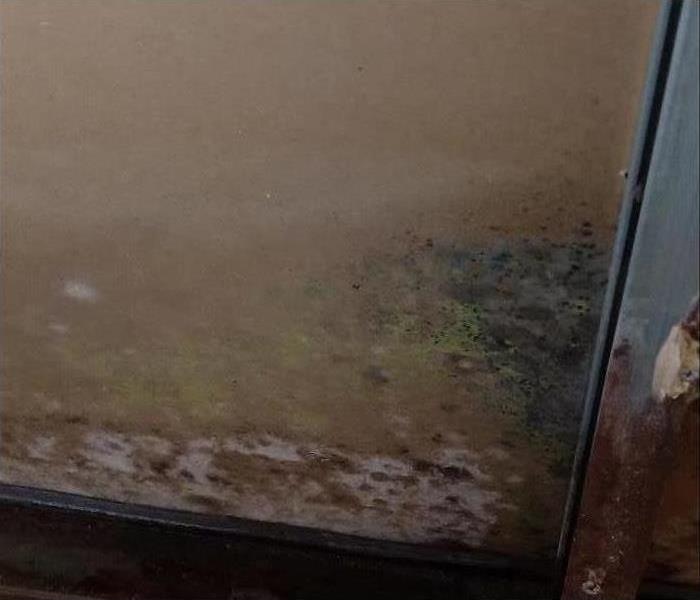 Mold growth in a Windmoor, PA home
Mold growth in a Windmoor, PA home
Top 5 Places to Check for Mold
Mold damage has the potential to ravage your Wyndmoor, PA, home if the situation isn't handled properly. Performing regular home inspections to check for mold and mildew can help you catch the problem while it's still small and ultimately save you time and money in costly mold remediation. If you're not sure where to start looking, try checking the following locations.
1. Your Bathroom
Where there's water, there's the potential for mold growth. Your bathroom comes into a lot of contact with water. Check for mold in the shower, the bathtub, underneath the sinks, around any exposed piping and in the window sills.
2. Your Kitchen
You need to make sure that you regularly remove old food items from your refrigerator and pantry, as these can sponsor unwanted mildew growth. It's also important to check around and underneath the sinks as well.
3. Your Laundry Room
Your washing machine also has the potential to house mold. You need to make sure that you properly air the drum out after each cycle. At least once a month, you should also run an empty cycle on high heat with a cup of white vinegar in the drum. This can help prevent future mold growth and keep your laundry fresh.
4. Your Living Room
While you might not be able to see it as easily, your living room's carpet can also fall victim to mold damage. Neglecting to clean up spills right after they happen can lead to moisture getting trapped underneath the carpeting, causing black mold to grow on the flood boards beneath.
5. Your Basement
If you have an unfinished basement with exposed water pipes, then you need to take extra time checking for mold. Inspect your water pipes and around the water heater for signs of mold.
Performing regular home inspections can help you catch the problem before it has the chance to spiral out of your control. Make sure to contact mold remediation experts for assistance if your inspection does uncover signs of mold damage.
Tips for Mold Prevention in Commercial Buildings
12/14/2020 (Permalink)
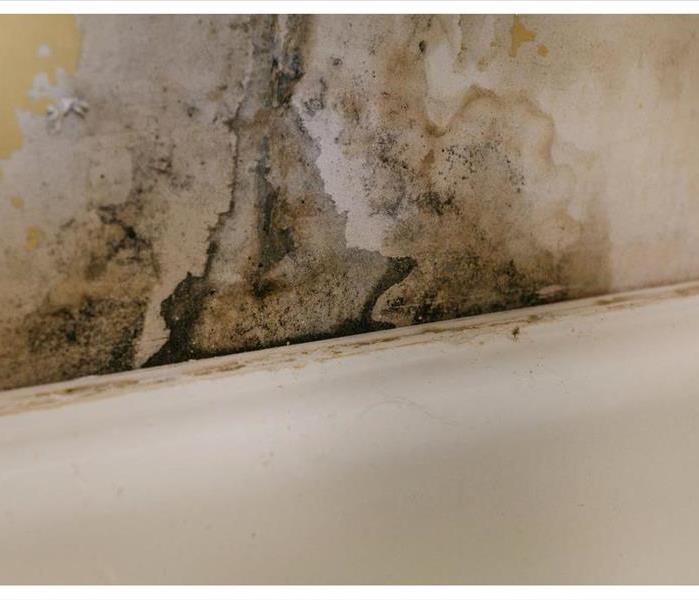 Mold growth in Whitemarsh, PA
Mold growth in Whitemarsh, PA
Ways To Prevent Mold Growth
Unattended mold growth will cause damages to commercial buildings in Whitemarsh, PA, leading to unexpected financial expenses. Mold prevention will keep these damages from accruing and becoming burdensome to the property owner. Prevention consists of routine maintenance to facilities that keep building conditions at a standard that prevents mold colonies from developing. Some ways to prevent mold growth are:
- Routinely inspecting the building for water stains
- Checking for hidden water leaks
- Maintaining HVAC systems year-round
Regularly Inspect Plumbing Systems
Water damages can develop for numerous reasons ranging from old plumbing systems to inclement weather. Property owners should ensure their maintenance plans include routine inspections to their plumbing systems. This will prevent leaks from developing and creating a worsening condition for property construction materials.
The most dangerous type of water damage is the one that goes unnoticed. Inspecting pipes often will decrease the likelihood that leaks will cause severe damages to construction materials. Leaks that go unnoticed will create a habitat for mold in the dampened construction materials they damage. Mold will then decompose the construction materials of a building, which can cause severe risks to the building's structure.
Ensure HVAC System Settings are Optimal
HVAC systems should be well maintained to prevent poor air quality in a building. This will also keep humidity levels optimal for mold prevention. Fungus thrives in humid, dark spaces that give it the proper nutrients. HVAC systems provide this type of environment for mold in air ducts and drip pans. It is essential to inspect these regularly and clean them as soon as mold is found.
A mold remediation company will help to rid a facility of mold growth. Addressing water leaks quickly by hiring a plumber and a water damage restoration service will decrease the likelihood that damp materials will develop mold. After cleaning, steps for mold prevention should be implemented into regular maintenance routines to prevent costly damages in the future.
What is Category 2 Water Damage?
12/14/2020 (Permalink)
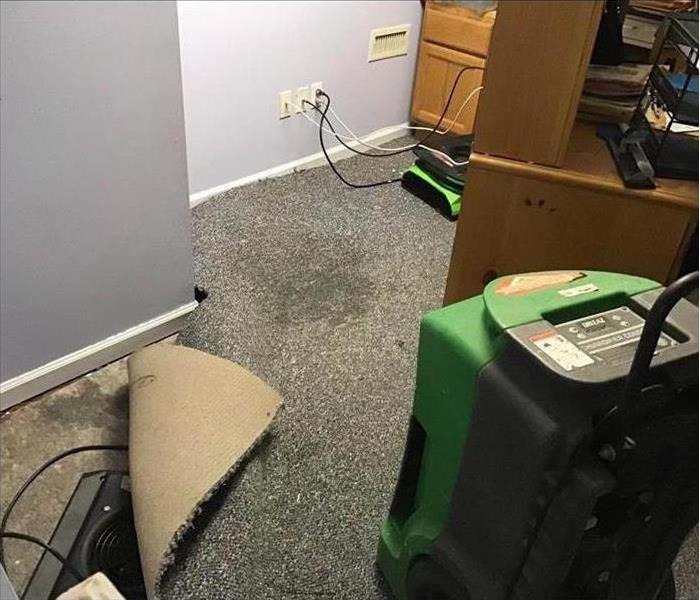 Water cleanup in an office space
Water cleanup in an office space
How To Identify Category 2 Water Damage And What To Do
Some water damages are more hazardous than others, and require professional assistance every step of the way, from water pipe repair to carpet replacement. If your business in Whitemarsh, PA, suffers water damage, it is important to know what you are facing. Here are a few tips to know how to identify category 2 water damage and what to do.
Category 2 Water Damage Sources
Category 2 water damage is damage caused by water that contains chemical, biological, or physical contaminants that cause discomfort, irritation, or illness to those exposed to it. This type of water damage includes intrusions of water from the following sources:
- Flooded toilets with urine
- Sump pump failures
- Discharge from dishwashers or washing machines
- Clean water that sits too long
- Water that starts at a higher level and seeps down through building materials
Because the water that causes category 2 water damage can cause irritation and illness, it is essential that restoration specialists are contacted for cleanup.
What You Can Do
When you discover a leak or flood from a broken pipe or malfunctioning appliance, turn off the water source if it is safe to do so. If you are unable to reach the water source, contact a plumber or professional. Professionals can advise you if water pipe repair or replacement is necessary. Do not attempt it on your own. Remove all furniture, carpets, and other items not yet affected by the water intrusion and place them in a safe and dry area. Your work stops there. Contact professionals for cleanup. The water that causes category 2 water damage should only be dealt with by professionals.
What Professionals Will Do
Plumbers will handle water pipe repair and replacement. They will also address and fix any sewer issues and restore your water lines to safe and working order. Restoration specialists will use specialized equipment to dry and sanitize your carpets, walls, and other structural materials. They will repair and replace any structural materials as needed and ensure that every part of your business is cleaned, sanitized, and safe to get back to business.
Tips for Surviving Home Fire Damage Reconstruction
12/14/2020 (Permalink)
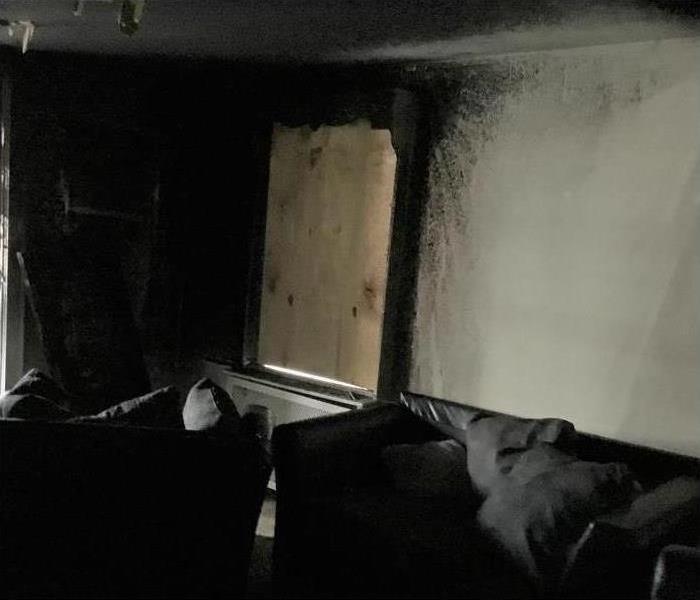 Fire damage in a Whitemarsh, PA property
Fire damage in a Whitemarsh, PA property
Home fires cause a lot of lasting damage, leading to extensive cleanup efforts. The tasks involved in this process take time and require a certain amount of expertise. This is because fires often cause weakness in the structure of the home. It's also because smoke damage includes many unseen types of harm. The most important reason to reach out to Whitemarsh, PA, restoration experts is to ensure the safety and health of your family.
Learn as Much as Possible
It's natural to feel overwhelmed by the cleanup and reconstruction processes. As you face the fire and smoke cleaning process, there are several things you should keep in mind:
- It takes a long time for professionals to put your house back into an inhabitable condition. Be patient with yourself and with workers during this time.
- Involve your insurance company as soon as possible. You'll get a quicker response from fire and smoke cleaning technicians, along with reliable information about how to proceed.
- Fire and smoke damage often leaves your home vulnerable to the elements and trespassers. Technicians can take steps right away to cover holes in the roof. Make sure windows and doors are boarded up, and think about security fencing. Discuss these options with the restoration team and your insurance company.
Sometimes, homeowners look for DIY methods for cleaning their homes, but technicians have access to tools, supplies, and special training for dealing with soot damage, weakened floors, and lingering smoke smells.
After the flames are gone, there may still be health and safety hazards throughout the home. These include toxic volatile organic compounds that are released when some types of furnishings and upholsteries burn. Technicians have the necessary personal protective equipment to avoid exposure to chemicals and toxins.
Don't Tackle Everything at Once
Your home may have suffered a lot of fire and smoke damage, but this doesn't mean that your life won't return to normal. As you leave the reconstruction work to professionals, you'll find that a one-day-at-a-time approach is the easiest way to work through cleanup and repairs.
Fire Insurance: What it Covers, and Do You Need It?
11/4/2020 (Permalink)
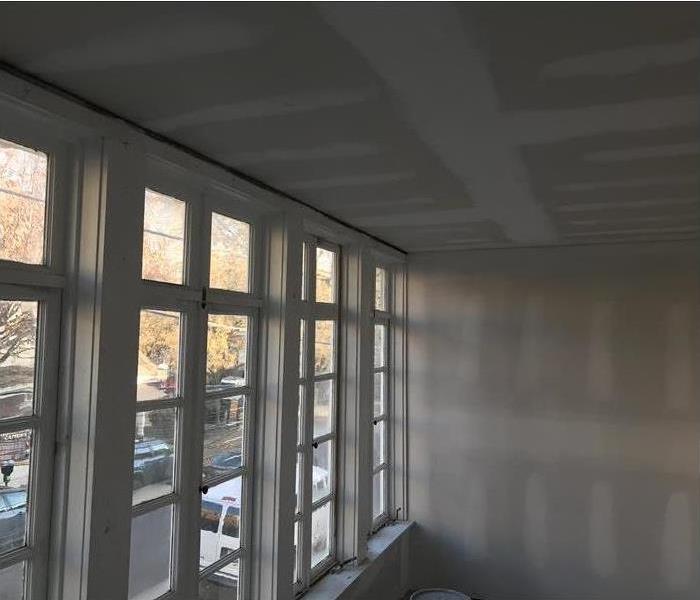 Commercial fire restoration in Cheltenham, PA
Commercial fire restoration in Cheltenham, PA
Fire Insurance: What it Covers, and Do You Need It?
Of all the disasters that could affect your office building, fire is among the most destructive. Fires can start in a wide variety of ways. Even small fires can cause extensive damage, destroying materials and making it impossible to work in the building until professional cleanup teams restore it. The financial toll can loom large too, especially if you suffer significant losses in the fire. The good news is that if you have a good fire insurance policy, you can receive a settlement amount you need to replace those items you lost.
What the Insurance Protects
Insurance is one of those things that you don't think much about until you need it. When you do, you are grateful for the monetary aid it provides. Fire insurance will cover the following:
- The cost to replace building materials destroyed in the fire.
- The cost to rebuild the facility due to the fire.
- Replacing damaged or destroyed furniture.
- Replacing office equipment and tools.
When the Policy Won't Take Effect
Fire restoration in Cheltenham, PA, can be costly. Having a reliable insurance policy gives you peace of mind and guards against financial ruin following this disaster. However, there are situations where your insurance company wouldn't honor your claim. You can't file a claim if you set the fire intentionally. This, in fact, is illegal and could result in serious penalties, including jail time. The insurance company may not cover losses from the fire if it occurred due to your neglect at maintaining and repairing electrical systems or other equipment in the building.
The Aftermath
The fire itself can be devastating, but smoke damage can be just as widespread. Your policy should also cover smoke cleanup and the effects that soot and ash will have on the building and the items inside.
Getting fire insurance is a smart way to protect you and your business. If it is not included in your commercial policy, talk to your agent about adding it today.
Cleaning Category 2 Water Damage
11/4/2020 (Permalink)
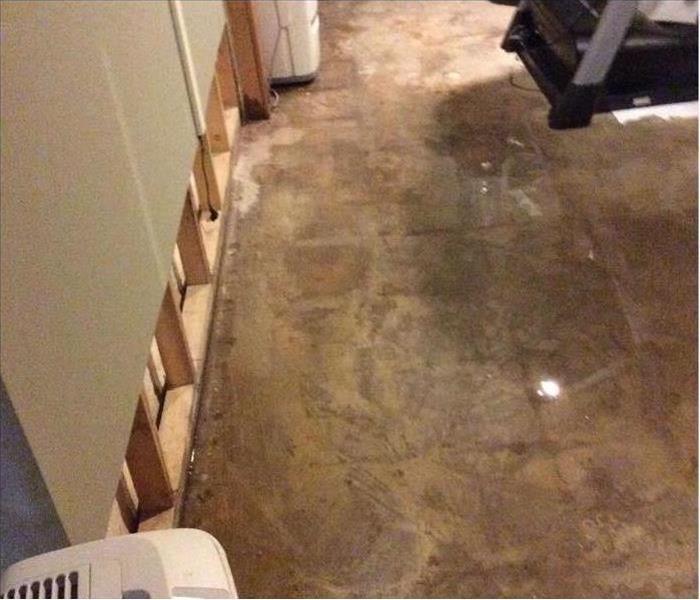 Clearwater damage in Plymouth Meeting, PA
Clearwater damage in Plymouth Meeting, PA
When your commercial property is flooded, emergency restoration professionals can assist with the water pipe repair. First, they must first categorize the type of water loss present.
Water Loss Categories
Category 1 losses involve clean water and are thus the least severe. Category 3 losses involve major contamination.
Category 2 losses, meanwhile, fall somewhere in the middle. They involve water that contains biological, physical or chemical contaminants. This grey water also frequently features microorganisms and the nutrients that help them grow. Typical causes of Category 2 water losses include:
- Hydrostatic failure
- Sump pump malfunction
- Washing machine or dishwasher discharge
- Toilet bowl leaks (without feces)
Clean water that sits in a building for an extended period of time can also become contaminated and cause Category 2 water losses. That is why you should call water pipe repair specialists in Plymouth Meeting, PA, as soon as you discover a flood.
Water Loss Remediation
Once the experts arrive at the scene, they will find the broken pipe and stop it from causing further damage. They will then remove small items from the scene and block off any furniture in the affected area.
Next, the pros will utilize special tools to extract water from carpets. They might additionally rely on drying chambers and dehumidifiers to assist with the cleanup.
Experts will also use biocides to limit the growth of microbials. Still, you may have to discard and replace some of your contaminated assets.
Make sure that you or the restoration experts keep detailed records of the damaged items and the work performed on the premises. This will expedite the insurance claims process.
A water pipe repair may involve potentially harmful Category 2 damage. Category 2 losses can occur if the water comes from an unclean source or has remained inside the property for an extended period of time. Because these water losses are dangerous, they should only be handled by trained professionals.
4 Tips To Get the Most Out of Your Storm Shutters
10/20/2020 (Permalink)
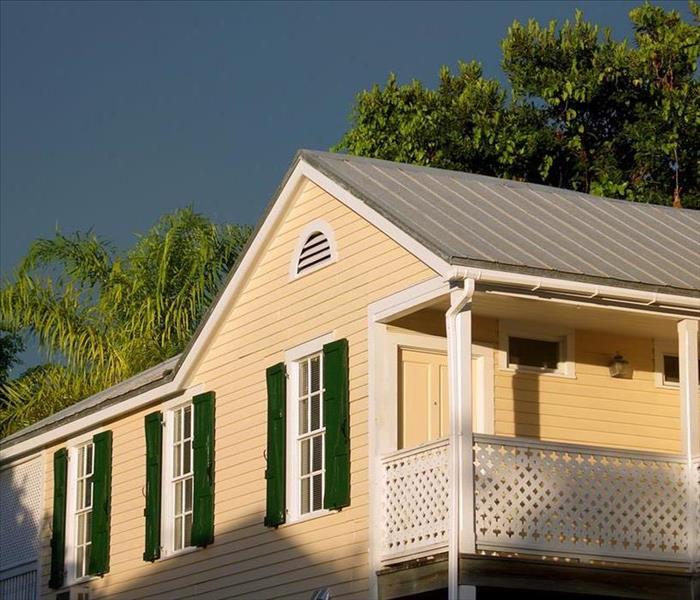 Storm shutters are a smart way to protect your home and family from damage
Storm shutters are a smart way to protect your home and family from damage
Here Are Some Tips To Ensure That Your Shutters Will Be Up To The Task
Storm season means high winds and heavy rains. Storm shutters are a smart way to protect your home and family from damage and minimize storm cleanup, but they’re only effective if they’re in good working order and correctly deployed before a storm hits.
1. Do a Trial Run
Practice securing your shutters completely at the beginning of each storm season. This is the best way to get a feel for how long it will take you to install them when a storm is on the way. By doing a full test run, you can also be sure that you have all the tools, hardware and equipment you will need.
2. Protect Your Hands and Feet
Aluminum shutter slats have dangerously sharp edges, so wear heavy gloves when handling them. Don’t be tempted to carry a stack of panels, as one might fall and cut your foot or leg. Long pants and closed-toe shoes are smart choices.
3. Leave Yourself Plenty of Time
Allow yourself more time than you think you’ll need to install the storm panels when a storm is approaching. If your trial run took three hours, for example, give yourself five hours. You may have time to install your shutters once a storm “warning” is issued for Whitemarsh, PA. However, high winds can be unpredictable, so it’s a good idea to go ahead and gather your supplies when a storm “watch” is issued.
4. Use the Buddy System
Don’t hesitate to ask for help if you need it. By pairing up with a neighbor, you can share equipment and tools and help one another with installation. Work together to fully shutter one home at a time; that way, if you run out of time, you can both take shelter in the house that is fully protected.
Follow these tips to get the most out of your window protection system and to keep your home and family safe until the high winds have passed.
Keep or Pitch? Your Guide to Which Items You Can and Cannot Save from Mold Damage
10/7/2020 (Permalink)
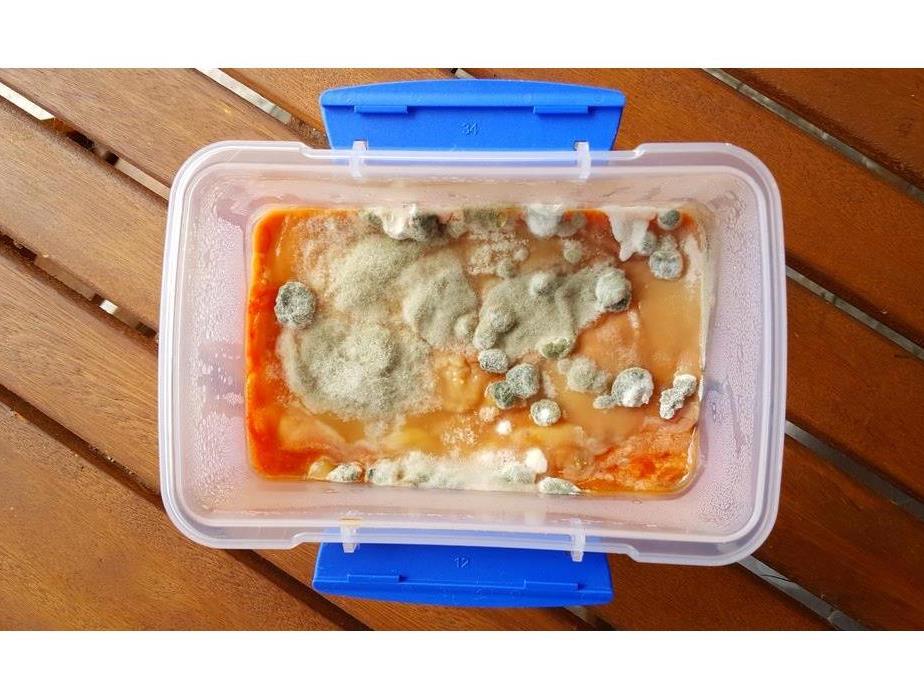 Moldy or water damaged food must be thrown away
Moldy or water damaged food must be thrown away
Mold and floodwater can inflict devastating amounts of damage to your home in Wyndmoor, PA. Picking through the wreckage can be heartbreaking, especially when sentimental items have been affected. While all hope might seem lost, there are certain mold cleaning techniques you can use to save your possessions.
Items to Throw Away
It's important to know which items simply cannot be saved when attempting to expedite your mold cleaning efforts:
Porous Objects: Because of their tendency to absorb water quickly, it's unlikely that you'll be able to save objects with porous surfaces. This includes items made of cardboard, padding, stuffed animals, upholstered furniture, carpeting, and mattresses.
Paper Products: While it is possible to restore these items, the process is rather costly and should be saved for sentimental items. Place any possessions you wish to preserve in the freezer to prevent mold damage from spreading.
Food Items: Moldy or water damaged food must be thrown away. The same goes for any water damaged food preparation appliances.
Items to Keep
Likewise, there are many types of objects that you can easily disinfect and keep:
Glass, Metal, or Plastic Materials: Clean these items using either antibacterial hand soap or a homemade mixture comprised of 1 gallon of water and 1/2 cup of bleach.
Most Clothing Items: Time is of the essence with clothing, so make sure to wash them using regular laundry detergent as soon as possible. Leather clothing needs to be taken to a cleaning professional.
Electronic Devices: Appliances exposed to mold damage vary on a case-by-case basis. Any water-damaged electronics or appliances are potentially dangerous and need to be thrown away. You should consult a professional if you wish to restore these types of items.
Knowing which items to keep and which you need to get rid of can certainly help expedite your mold cleaning efforts. If you have any further questions or require additional help getting rid of mold, contact mold remediation experts as soon as possible.
Water and Electricity: A Volatile Mix
10/7/2020 (Permalink)
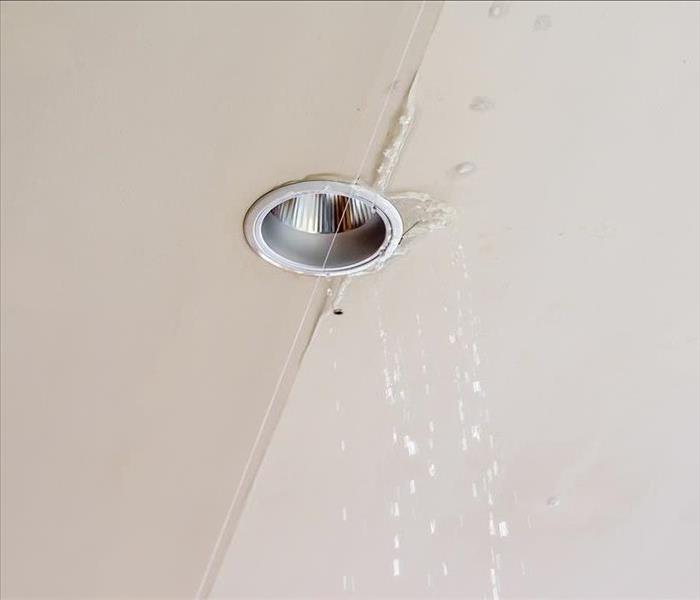 Water in light fixtures presents threats other than electrocution
Water in light fixtures presents threats other than electrocution
Occasional water leaks are part of homeownership in Lafayette Hill, PA. Faucets, pipes, and toilets drip and overflow from time to time. However, there's one category of water leakage that's not only stressful but highly dangerous—water in light fixtures such as a chandelier. It not only results in ceiling damage but, importantly, it can cause a serious or deadly injury to you or someone in your home.
The reason? Water conducts electricity. It carries an electrical current, making electrocution a real possibility if you touch leaking water that's pooling around an electric light fixture. In fact, merely touching the fixture's light switch can give you an electric shock.
This water emergency demands quick action.
Here's A Safety To-Do List
Turn off the electricity in your home's breaker box.
Ensure the electricity is off by testing a dry electric light, preferably with a non-contact voltage tester.
Turn off your home's water supply at the main shut-off valve.
If damp, don't touch any of your home's electrical sources (or light switches).
Avoid wet or sagging ceiling bulges around the affected light fixture.
Block access to the water-affected room.
Do not attempt to fix the ceiling's water leak by yourself.
Water in light fixtures presents threats other than electrocution. It's a fire risk because—as the water infiltrates the fixture's electrical wiring—it can cause sparking that ignites into flames. Corrosion or mold may have developed over the course of the leak, damaging wires and creating unsafe short circuits. There's also the possibility of a ceiling collapse as the drywall around the light fixture softens and loses its structural strength.
Once initial safety checks are in place, it's time to call in professionals skilled in neutralizing the hazards surrounding water in light fittings. Contact an electrician to repair the leak source as well as a water damage company experienced in cleaning and restoring your home's affected areas.
How To Avoid a Grill Fire
9/25/2020 (Permalink)
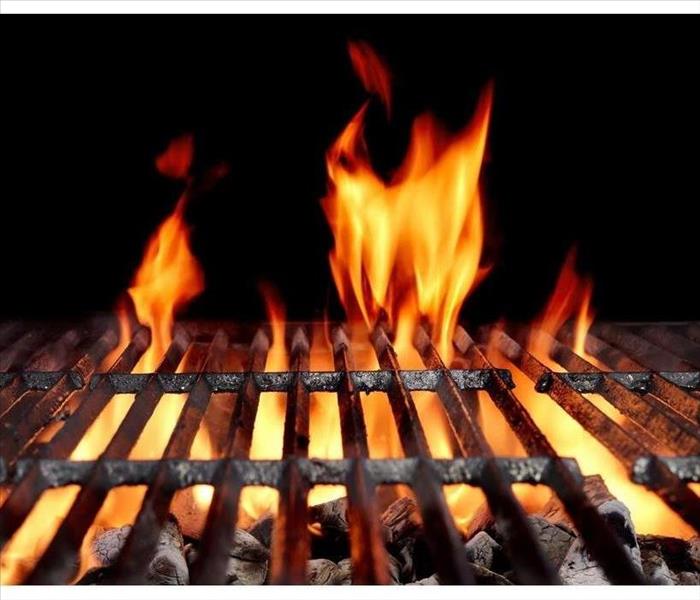 How to avoid a fire grill
How to avoid a fire grill
As Labor Day approaches and the close of summer brings cooler weather in Wyncote, PA, this time of year offers the perfect opportunity to fire up the grill one last time. As you enjoy your holiday weekend, be sure to practice safe habits to avoid a grill fire. If you do experience a grill fire, know what to do to keep everyone safe.
How To Avoid a Grill Fire
Each year, thousands of homes experience fires caused by grills. If you know your grill is in need of repair, don't use it until it has been repaired. Follow these safety measures to ensure you don't experience a barbeque fire.
Always remove old grease from the grill and tray below the grill.
Check for leaks on the gas tank prior to use.
Open the lid before lighting the grill.
Make sure the grill is placed away from the home, tree, and other flammable structures.
For charcoal grills, only use starter fluid that is designated for use with charcoal.
If You Experience a Grill Fire
Know what actions to take in the event of a grill fire before using your grill. A fire extinguisher should always be easily accessible. If a fire does get out of hand, shut off the grill if you can do so safely to cut the fuel supply. Also, close the grill lid so the fire is deprived of oxygen.
After using the fire extinguisher, if the fire is beyond your control, call for help and evacuate the home. If your home experiences smoke damage or fire damage, it can be restored. Your priority should be your home's occupants and guests.
A grill fire can happen at any time. Knowing how to avoid and how to handle a grill fire can help lessen the severity of the fire. Keep these tips in mind as you enjoy the holiday weekend.
Why Does My Toilet Leak Every Time I Flush?
9/24/2020 (Permalink)
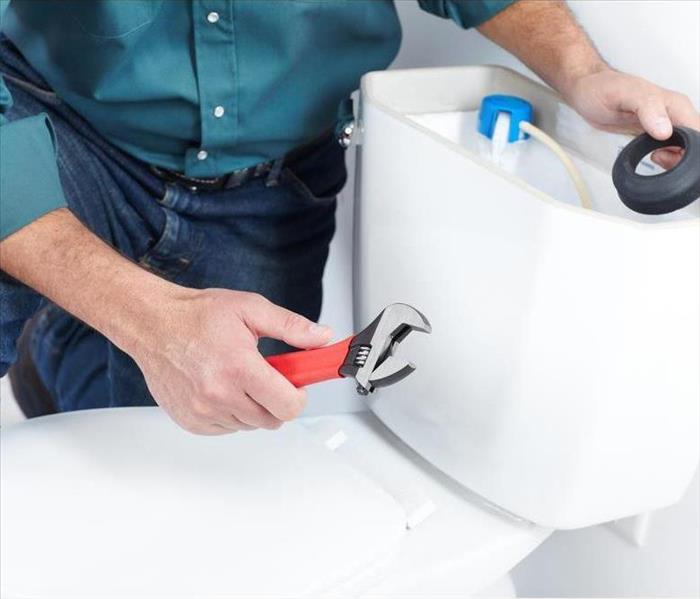 Leaking toilets will become an issue at some point during your homeownership.
Leaking toilets will become an issue at some point during your homeownership.
Experiencing plumbing problems is an issue every homeowner in Whitemarsh, PA, will have to contend with every now and then. Consider it to be your house letting you know something needs your attention. When it's a leaking toilet giving you signs something is wrong, you'll want to attend to it fast to avoid serious damage to the structure of your home.
When Your Toilet Is Leaking
One of the most common problems of an aging toilet is to experience water leaking at the base. While this may seem like a catastrophe, it really isn't as long as you take fast action to correct the issue.
It's likely the dry wax ring around the base of the toilet has failed. To make sure the issue isn't coming from the tank, clean up the water around the base of the toilet, and flush the toilet again. When a new puddle begins to form, inspect to see where the water is coming from.
Fixing Your Leaking Toilet
Bathroom leaks aren't difficult to diagnose. If the leak was coming from under the toilet, try tightening the bolts that hold the toilet to the floor. You don't want to tighten them too much, though, or you could damage the base.
If that doesn't help, replace the wax ring beneath the toilet. To do this, you'll have to turn off the water using the shutoff valve behind the toilet.
1. Once the water is off, flush the toilet to completely empty the tank.
2. Disconnect the water-supply tube.
3. Rock the toilet to break the seal.
4. Moe the toilet to the side.
5. Remove the old wax gasket.
6. Inspect your flange to make sure yet isn't broken.
7. Replace the wax ring and install a new flange if it was an issue.
If you discover the leak had been occurring for some time, call a restoration company to inspect the area around the toilet to ensure your structure is stable and doesn't require further repair.
If you aren't comfortable with repair work, call a plumber. Leaking toilets will become an issue at some point during your homeownership. Catching a problem early and correcting it can save you money.
5 Flood Prevention Tips for Your Business
9/14/2020 (Permalink)
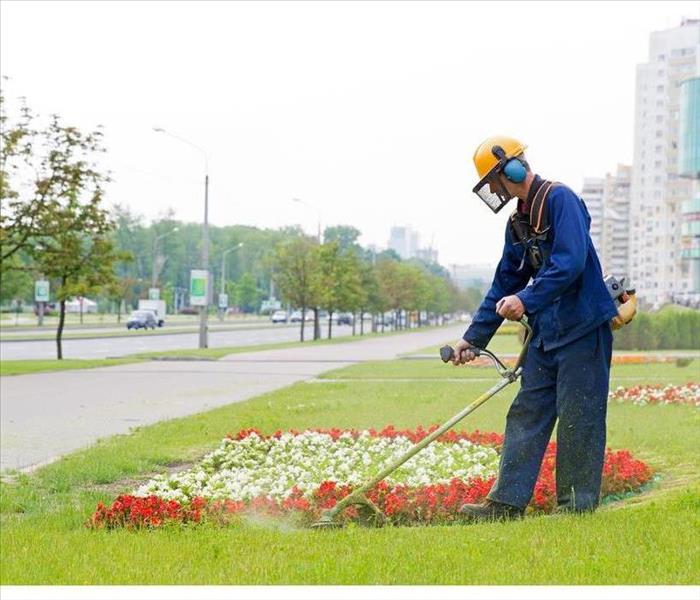 Maintaining your landscaping can also help stop flooding
Maintaining your landscaping can also help stop flooding
Follow These Five Tips To Prevent Flooding And Flood Damage
If you experience high water after a storm in Flourtown, PA, then you may need to contact storm damage restoration service. These professionals can help with cleanup and repairs, and may also be able to recommend prevention measures before the storm arrives. Here are five tips they may give you.
1. Keep Drainage Clear of Debris
One of the first steps you can take for flood prevention is to keep drainage areas clear of debris. This will help prevent water from backing up and overflowing into undesirable areas such as the room or a basement area.
2. Maintain Your Landscaping
Maintaining your landscaping can also help stop flooding. Both because removing debris can keep drainage pathways clear, and keep loose objects from being blown about by the winds and potentially damaging the building. You may also wish to bring lawn objects inside before a storm.
3. Use Flood Barriers Where Needed
If your business property is at risk for high water you may want to consider the use of a flood barrier. This should be places around doors and window wells in such a way as to redirect water flow away from the building.
4. Move At-risk Items Away from Entry Points
It's a good idea to move items that may be sensitive to water damage away from at-risk locations such as near entry points or windows. You may wish to relocate these tools temporarily to the center of the building or an upper floor until the storm is over.
5. Back Up Your Data
Just in case water does get inside it’s important to back up any electronic data. If possible use an external server. This will help prevent the loss of important files, even if the electronics themselves are damaged.
If you do experience high water after a storm, a restoration service can help. Following these five tips may help prevent flooding and flood damage to begin with. Keep any drainage clear of debris, maintain landscaping, and make use of flood barriers. It’s also a good idea to move at risk office items away from entry points and back up all your electronic data just in case.
Mold Minutiae
8/21/2020 (Permalink)
 Mold spores are almost everywhere
Mold spores are almost everywhere
Mold Minutiae
Mold is a hardy little microorganism that usually isn’t associated with anything good. Normally, you find mold growth when your food has spoiled, or it could be the result of a leaky pipe in your Cheltenham, PA, commercial building. It’s not all bad, though — look how penicillin has changed the world for the better. Good or bad, mold is relentless.
1. Mold Creates Healtheir Gardens
Mold may have a bad reputation, but not all mold is damaging. It can play a valuable role in your garden, decomposing organic matter. This decomposition makes for healthier soil.
2. Mold Spores Are Almost Everywhere
Like most fungi, mold produces cells called spores which is their way of reproducing. These spores are always in the air (often by the millions) almost everywhere in the world. There’s no getting away from them, only keeping your environment uninviting to them (mainly by keeping humidity low).
3. Mold Can Damage Materials
Mold growth is a process of constant multiplication, which explains why it spreads so quickly. Nutrients upon which mold feeds can come from a variety of sources (e.g., fabric, drywall and wood). The decomposition process that mold accelerates can do permanent damage to some materials.
4. Mold Comes in Many Colors
Different kinds of mold can vary widely in color. You may have only seen it around the house in dark black or brown splotches, but some molds are other colors, such as white, green or orange.
5. Mold Remediation Can Be Complicated
If you discover mold in one place in your building, it’s probably hiding in less conspicuous areas as well. What looks like a very minor infestation could turn out to be a major problem. The only way to address the problem is to remove all mold-infested materials and thoroughly clean the affected area. Hiring mold cleanup professionals is the best route to go if you’re unsure about the extent of your infestation.
High humidity is the main cause of mold growth. Once your mold and water damage issues are resolved, make sure to keep your indoor humidity around 40% to avoid future issues.
How To Stop a Continuously Flushing Toilet
8/21/2020 (Permalink)
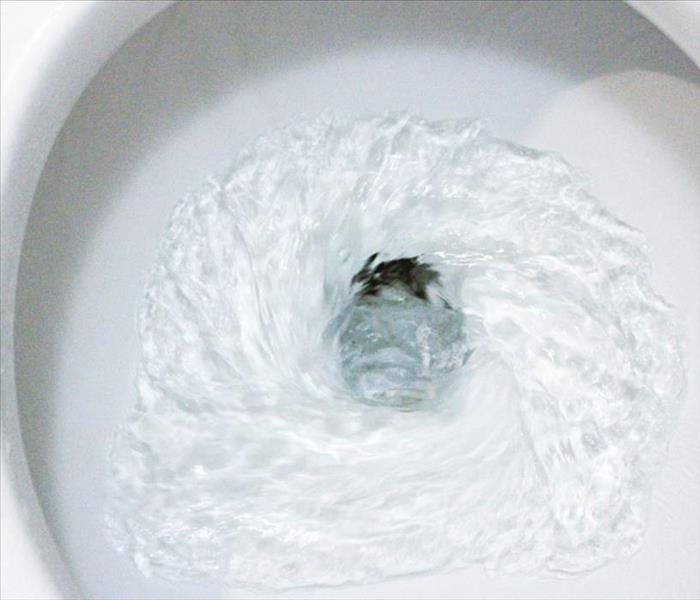 A malfunctioning flushometer may also continuously flush, driving up the cost of your water bill
A malfunctioning flushometer may also continuously flush, driving up the cost of your water bill
While flushometers usually work quite well, a toilet overflow can still occur. A malfunctioning flushometer may also continuously flush, driving up the cost of your water bill.
You may not need to call a plumber to deal with this issue. As long as you have some handyman skills, you can stop a constantly flushing toilet on your own.
Stopping a Toilet With a Manual Flushometer
You only need some basic tools to fix a manual flushometer. Start by grabbing the following:
- Flat screwdriver
- Wrench
- Cleaning products
There should be a slot on the side of the flushometer. Put the screwdriver in there and turn the tool to shut off the water. This way, you will not have to deal with a toilet overflow while you fix the flushometer.
Next, use a wrench to screw off the flushometer's top lid. You can then remove the flange cover to reveal a gasket. Take the gasket out of the flushometer and wash out the sediment. Be sure to clean the weep hole, as well.
Finally, put the gasket back into the flushometer and restore the flange cover and lid. Do not forget to turn back on the water before trying to use the toilet.
Stopping a Toilet With an Automatic Flushometer
If your flushometer flushes automatically, try holding down the chrome button after you turn off the water. If you hear clicks within two seconds of each other, you need to remove the top of the flushometer and clean the diaphragm kit. You may also want to make sure the solenoid is properly tightened.
The above steps should help you stop a toilet that keeps flushing. Yet your toilet may still develop problems even after you fix the flushometer. For instance, a clog could cause a toilet overflow. If this happens to your property, you should not attempt to clean up the toilet flood on your own. Instead, you should utilize emergency restoration professionals in Plymouth Meeting, PA.
How to Prepare for an Emergency Evacuation of Your Business
8/19/2020 (Permalink)
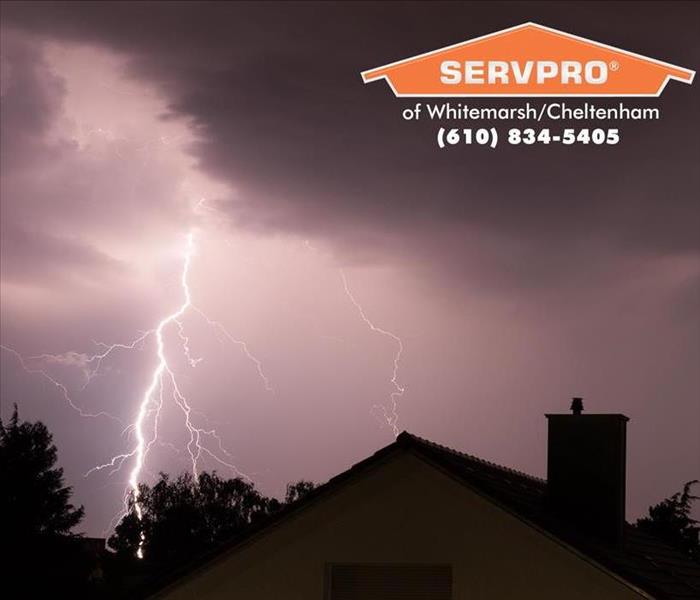 Creating an action plan is the best place to start preparing for trouble.
Creating an action plan is the best place to start preparing for trouble.
One of the most neglected areas of business planning is the emergency evacuation plan. No one ever expects a crisis, and when it comes, it’s too late to prepare. But having something as simple as a fire drill is a proven way to save lives, reduce property damage, and possibly avoid lawsuits.
Workplace Emergencies Are Surprisingly Common
The list of potential emergencies is huge. Those that are likely to require evacuation aren’t as numerous, but still considerable. The most likely include
Floods
Severe storms
Fires
Hazardous material spills
Natural gas leaks or explosions
Civil disorder
If you’re thinking that no one can prepare for everything, you’re right. However, studies indicate that simply having a solid fire drill plan in place and tested for effectiveness is enough to dramatically change the odds.
Your Emergency READY Profile
Creating an action plan is the best place to start preparing for trouble. The simplest way may be to start with the SERVPRO Emergency READY Profile. Not only will this help organize your thoughts for your evacuation plan, but it’s also an excellent way to reduce damage to your business.
You can download the free smartphone app to help you set up a profile. This will aid in locating items that should be shut off in a crisis if it’s safe to do so, such as natural gas. It also includes all the resources you need at your fingertips to return to normal operations, as well as contact and insurance information.
Your Evacuation Plan
When you create your escape plan, consider the type of emergency, where it’s likely to occur, and how anyone in your business can get out. Start with fires since they are so common and so dangerous.
Where is a fire most likely to happen? Where are the fire extinguishers? Which exits are designated? Ask lots of questions, then design and execute a fire drill. Once that’s done, simple modifications can allow you to expand it to any sort of evacuation.
When everyone’s safe, you’ll need a top restoration company in Whitemarsh, PA, to inspect and repair the damage. They can help with insurance claims and get your business reopened quickly!
How To Mitigate Damage to Your Roof
8/11/2020 (Permalink)
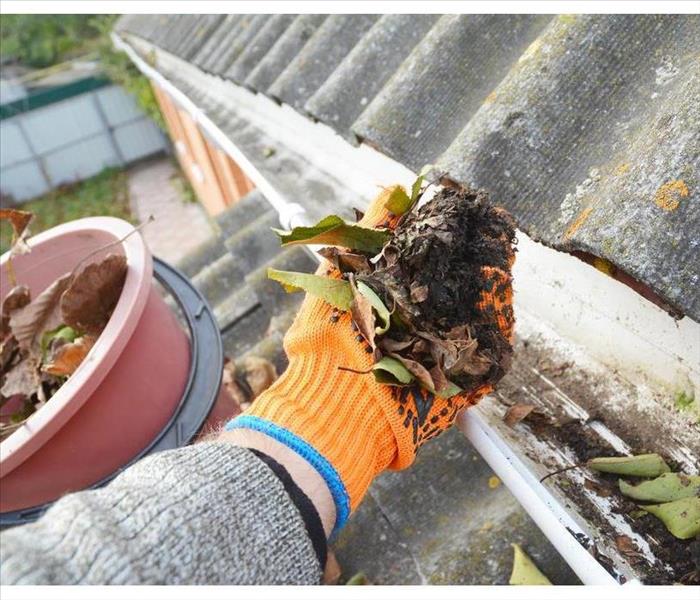 Gutters can get clogged with leaves, sticks, and dirt
Gutters can get clogged with leaves, sticks, and dirt
Preventive Measures To Implement Before a Storm Comes
When a storm hits in Lafayette Hill, PA, your roof is exposed to the elements. Heavy wind, rain, and snow can cause significant roof damage. You aren't able to completely protect your roof during a storm, but there are some preventive measures you can implement before a storm comes your way.
1. Stay Alert to Weather Reports
In the winter, it's a good idea to check the weather report every day. During tornado or hurricane season, the same approach is recommended. Since weather can change quickly, it's wise to keep abreast of weather changes all year. If you are aware of an coming storm before it hits, you will have time to make some preparations. Using a sturdy ladder with a loved one keeping it steady, climb up to the roof and inspect it thoroughly. If you find weak areas anywhere on the roof, call a storm damage restoration service right away. In the interim, cover any weak or damaged shingles with plastic tarps.
2. Trim Trees Near the House
Wind damage during a storm can be caused by trees that are situated near your house. Trees that overhang the roof are especially precarious. Loose branches can break off during strong winds and cause serious roof damage. It's a good idea to keep the trees near your home trimmed all year long, but especially before a storm hits.
3. Check the Gutters
Gutters can get clogged with leaves, sticks, and dirt. When this happens, it prevents the gutters from properly removing the water from your roof. This will eventually lead to a leaky roof. Gutters that are well-maintained will be able to keep water off your roof more effectively. Check the gutters periodically, but especially before a storm comes, and remove all of the debris.
While you can't totally eliminate the possibility of roof damage, these tips will help to mitigate any potential problems.
The 3 Types of Flood Water
8/5/2020 (Permalink)
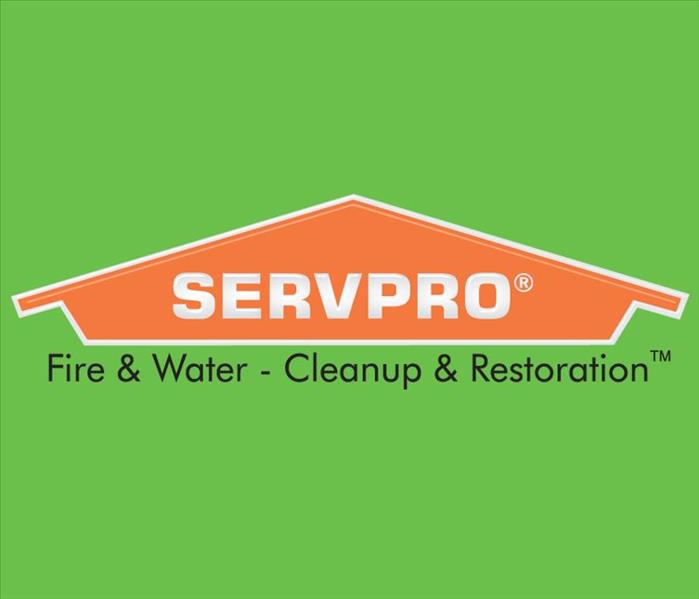 While all floods can cause problems, Category 3 flood water is, by far, the most dangerous type of contamination.
While all floods can cause problems, Category 3 flood water is, by far, the most dangerous type of contamination.
Flooding is one of the biggest headaches for homeowners today. They always pose an issue, but the type of floodwater present can make a big difference in how the situation needs to be handled. Arm yourself with knowledge and protect your home in Whitemarsh, PA, from all types of overflow.
Types of Water
Flood water is categorized by the contaminants present in the overflow. There are three major types, each more dangerous than the last:
Category 1: This is the safest type of water on the list. It is completely sanitary and does not pose a threat to humans or animals if consumed. That being said, you should never attempt to drink any type of water in a flood. If this water comes into contact with contaminants, it can transform into one of the other two types on this list.
Category 2: Category 2 damage is not completely sanitary, but it's also not the most dangerous type of water. It usually originates from a dirty dishwasher or water that was used in a washing machine.
Category 3: This is the most dangerous type of water contamination. Category 3 water is more commonly referred to as blackwater or sewage. It can result from a toilet overflow, sewage backflow or some other type of dangerous spillage. It is an extreme biohazard and should never be handled alone. Instead, you should contact professional assistance.
Category 3 Water Damage
It's natural to want to immediately rush in and save your possessions when faced with a Category 3 flood. You should never attempt to interact with blackwater yourself, especially without proper protective gear. Taking the proper protective measures prior to a major flood is the most effective way to defend your property. Move all-important possessions and documents to high shelves on the top floor of your house.
While all floods can cause problems, Category 3 flood water is, by far, the most dangerous type of contamination. Because of the dangerous biohazards present, you should never attempt to handle the situation yourself. Instead, contact flood remediation experts if faced with dangerous levels of blackwater.
Fascinating Facts About Mold
7/25/2020 (Permalink)
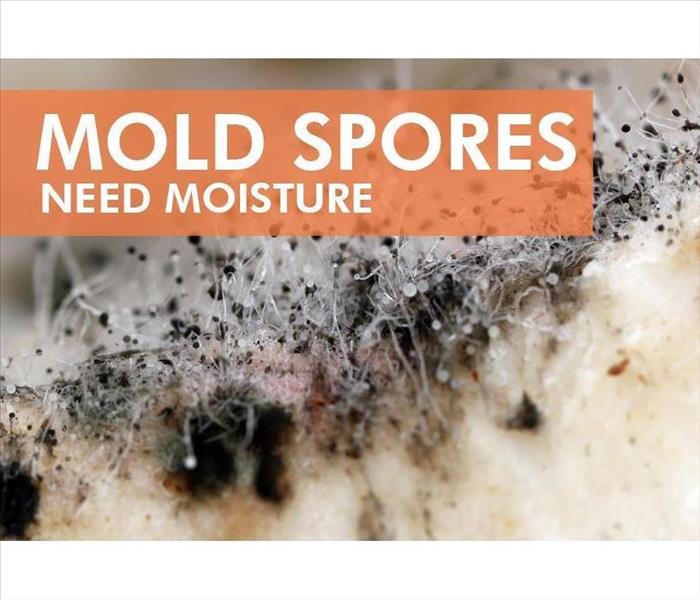 Mold spores need moisture
Mold spores need moisture
Facts About Mold That You May Not Know
Mold is a hardy living being, stealthily moving throughout its indoor haunts, invading the tiniest of crevices and spreading quickly. As much of a nuisance as mold growth is, it’s still a very interesting organism when you think about it. Here are some fascinating facts about mold that you may not know:
1. Mold Is Common
Mold is common, causing problems for about 50% of homes. More houses today suffer from mold problems than they did 50 years ago.
2. There Are Many Varieties of Mold
There are over 10,000 species of mold. Mold spores are almost everywhere and can’t fully be eliminated.
3. Mold Needs Nutrients
Mold must have a food source to survive. However, it can thrive on nutrients from many different materials such as carpet, paint, wood, paper, and leather, just to name a few.
4. Mold Can Survive Virtually Anywhere
Mold spores are virtually everywhere, outside and in. No amount of cleaning will totally eliminate them. Spores collect and mold growth can occur practically anywhere with high humidity and a nutrient source (e.g., in carpet or under flooring, within drywall and under sinks). Mold will thrive in dark areas; it’s one of only a few living things that doesn’t require light to grow.
5. Mold Grows Quickly
Mold can begin to grow within 24 hours of the introduction of moisture. It’ll continue to grow quickly, potentially covering large areas within a short amount of time.
6. Mold Can Be Destructive
Mold can be very destructive if not caught soon enough. It’s responsible for causing more wood destruction than termite, fire, and water damage combined.
The key to keeping mold growth at bay is to clean often and keep indoor humidity below 60%. Dehumidifiers, air conditioners, and exhaust fans can help with this. If your Wyndmoor, PA, home experiences a mold problem, you can count on mold remediation experts to help.
3 Things To Know About Mold and Your Business
7/23/2020 (Permalink)
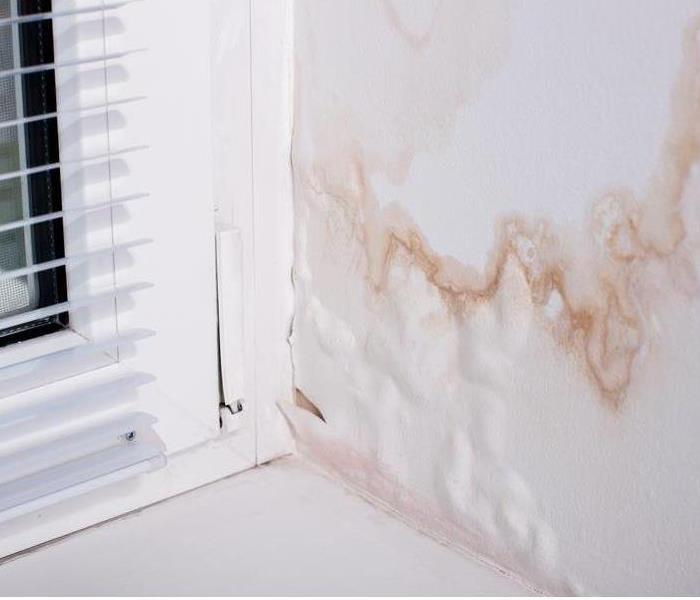 It’s important to know what the signs of mold are so that if there is a problem with mold at your place of business it can be quickly found and remove
It’s important to know what the signs of mold are so that if there is a problem with mold at your place of business it can be quickly found and remove
Finding ceiling tile mold at your Cheltenham, PA, place of business can be frustrating. But mold can grow other places as well. Here are a few things you should know about mold and your business.
1. You May Notice an Odor
It’s not uncommon to notice a musty odor in areas where the water damage has occurred. There is a chance this scent may be caused by mold. Mold odor occurred as a byproduct as the fungus spores and may be a sign that mold is slowly spreading through space. If you notice the odor by can’t see any mold, a professional can test the space to confirm if mold is present.
2. There Be Visual Signs
It's easier to determine if mold is present if visual signs are noticed. For example, you may see discoloration that indicates a ceiling tile mold. This tile discoloration may be slightly brown or yellow and color and look a bit like a water stain. Other visual signs can include fuzzy growth in dark corners or slightly slimy looking patches in areas where water temps to puddle.
3. Professional Help May Be Needed
If you believe mold may be present in your business, then it's highly recommended that you contact a local mold remediation service for help as quickly as possible. These professionals should be able to locate the mold, contain the area, and clean the spores from the business property. They should also be able to locate areas of water damage and make repairs there as well.
It’s important to know what the signs of mold are so that if there is a problem with mold at your place of business it can be quickly found and removed. You may notice mold odor or see signs like discoloration indicating ceiling tile mold. If mold is present a professional can help. They may also be able to answer any questions you may have.
Easy, Natural Gas Range Cleaning
7/14/2020 (Permalink)
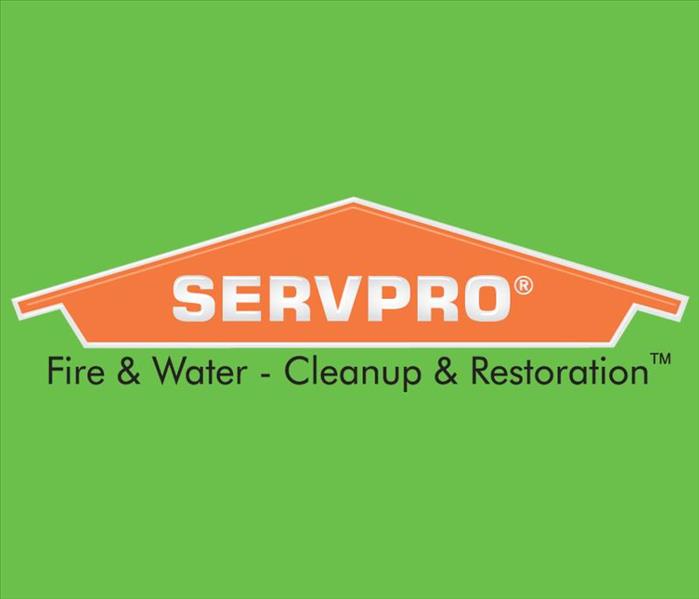 A gas range may seem like a daunting piece of equipment to clean, but it doesn’t have to be a big job.
A gas range may seem like a daunting piece of equipment to clean, but it doesn’t have to be a big job.
If your home in Whitemarsh, PA, has a gas range, it’s likely you’ll never want to go electric. They are durable, cost-effective, and heats p and cool down quickly. Like with any appliance in your home, care and maintenance are key to both home safety and pleasant kitchen experience. Surprisingly, range cleaning isn’t very complicated and can be done using natural ingredients likely already in your pantry.
Cleaning Tips
Whether trying to get rid of the smoke smell or some caked-on food, thoroughly cleaning a stove requires a little dish soap, water, vinegar, baking soda, and a sponge or rag. Below are five steps to get your gas range sparkling and smelling fresh.
Take grates and flame covers off and wipe down the stove surface to remove loose debris. Grates and covers can be soaked in warm dishwater for cleaning.
Ensure gas openings are covered. You can use cups or cupcake liners.
Place about a cup of baking soda into a bowl and gradually add vinegar to make a paste.
Start scrubbing with the paste. Leave on for about 20 minutes before wiping off with a wet towel or sponge. the rough side of the sponge to scoop paste from the bowl.
After everything is cleaned and dried, reassemble the stove parts. Be sure to test all burners.
Benefits of a Clean Range
A clean gas range makes the kitchen more inviting and smelling fresh. Regularly cleaning it also ensures that it is operating properly. Spills and food debris can affect the flow of gas, which may result in hot spots or unsafe conditions. If a fire does break out, the fire and smoke damage may require extra care to clean up. A fire and smoke damage remediation and restoration expert can quickly address the problem with the right tools for the job.
A gas range may seem like a daunting piece of equipment to clean, but it doesn’t have to be a big job. Regular cleaning will cut down on the time and keep it lasting longer.
How To Handle Furnace Puffback in Your Building
7/3/2020 (Permalink)
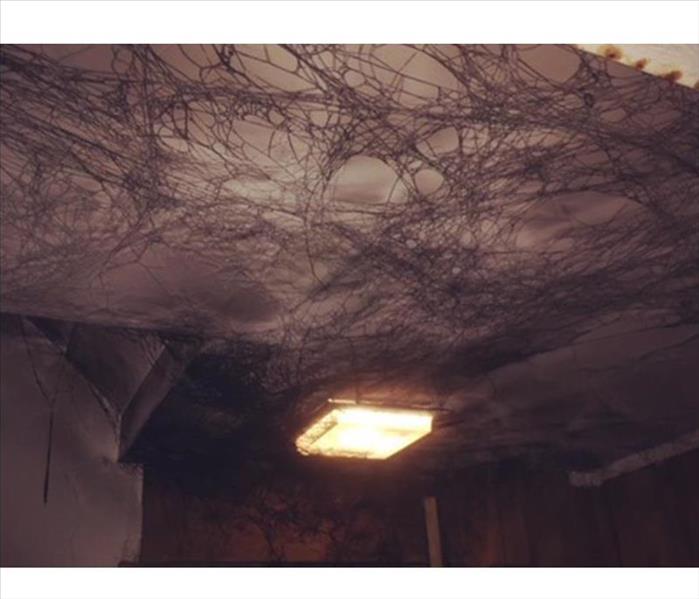 Puffback damage in a Wyncote, PA building
Puffback damage in a Wyncote, PA building
When a furnace misfires, smoke, and soot can be released throughout your building. This puffback damage can cause serious destruction to your commercial property in Wyncote, PA. You may be tempted to try cleaning the debris yourself, but it is imperative to call a fire damage assessment professional right away.
What Causes Puffback?
An oil furnace that isn’t operating correctly can leave un-burned oil on the floor and other surfaces. If this oil is ignited, it can cause an explosion.
Common causes of un-burned oil include:
Leaks in the piping - Heating oil can drip from leaking pipes when the furnace isn’t running, creating air bubbles in the pipes. When the furnace starts running again, the extra air compresses and pushes additional un-burned oil out of burner nozzle, causing a furnace puffback explosion.
Problems with the burner shutdown - If the oil burner doesn’t operate correctly during shutdown, oil can leak out of the burner nozzle.
Insufficient maintenance - If a burner isn’t maintained properly, dirt can prevent oil from combusting properly in the fire chamber. It’s critical to have a professional maintain your furnace at least once a year to reduce the risk of malfunction.
How Is Damage From Puffback Removed?
Since soot from puffback damage is sticky and contains oil, it is very difficult to clean. Soot can work its way into the ductwork and spread throughout the entire property. For these reasons, the damage should always be handled by a professional.
The trained technician will first assess the damage to ensure that the entire area is addressed safely and thoroughly. The professional team will remove the soot and smoke from all structures and surfaces using advanced techniques and equipment. The area is sanitized and deodorized to remove contaminants and odors. Restoration can take place once all surfaces are completely cleaned and sanitized.
If you are dealing with puffback damage in your building, call a professional to ensure you get your business back to normal as soon as possible.
3 Ways a Claims Inventory Service May Help Your Claim
6/25/2020 (Permalink)
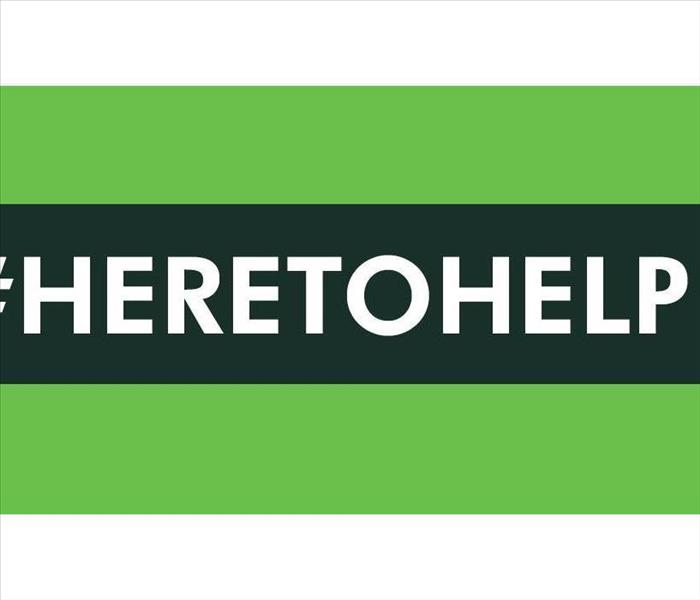 The inventory claims service offered by your local SERVPRO may beagle to help your agent with your insurance claim in several ways.
The inventory claims service offered by your local SERVPRO may beagle to help your agent with your insurance claim in several ways.
After a flood or fire at your Cheltenham, PA, business, you may want to contact a local damage restoration service, like SERVPRO, to help with any cleanup and repairs. Fortunately, these professionals may also be able to help your insurance agent with the insurance claim as they also offer an inventory claims service. Here are three ways this technology may be beneficial to your agent.
1. Remote Access To Documentation
One of the main features of this system your insurance agent may appreciate is the ability to access information remotely. This means that they can quickly locate any files they may need regardless of their location. It also allows them to complete work on your claim from their own office without having to constantly visit the location to talk to the restoration crew, or interrupt their work with a lot of phone calls.
2. Save Time Locating Information
The ability to access information remotely can also help your agent save time when working on the insurance claim. This means they can know exactly where to look for certain pertinent pieces of information and not have to search through various files or play phone tag. A lot of time may be saved.
3. Store Everything in one Location
This system can also store a variety of information types including photographs, lists, repair estimates, and progress reports. This means that much of the information your agent may need will already be kept in a single location. This can help them locate files they may need to work on your claim quickly.
The inventory claims service offered by your local SERVPRO may beagle to help your agent with your insurance claim in several ways. It can give your agent remote access to the documentation stored in its server which may help save time in location important information. Additionally, this service can store all the information the restoration team collects in a single place making it easy to locate.
What To Teach Your Kids About Escaping Fires
6/23/2020 (Permalink)
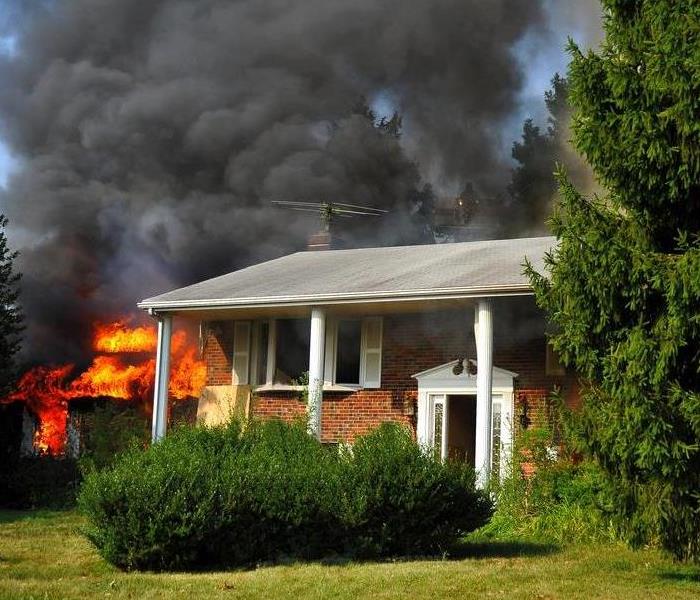 By following the above tips, you should be able to teach your children how to escape a home fire.
By following the above tips, you should be able to teach your children how to escape a home fire.
If you have children, then you know how important kids' safety is. You probably take special precautions such as keeping sharp items on high shelves. Yet teaching your kids how to properly escape a home fire in Wyndmoor, PA, is just as vital. Below are the various fire-safety behaviors your children need to know.
1. Rolling and Crawling
First, your children must understand that they cannot just walk from their room to the front door during a fire escape. They need to avoid the flames and heat as much as possible.
Just sitting up in bed can expose a child to extremely high temperatures. The heat is less intense at the bed level. You should teach them to roll to their side and safely slide out of bed during a fire. Have your children practice this several times on their own.
Next, teach your kids to crawl on the floor during a fire until they reach safety. You can even create obstacle courses in your home to make practicing the fire crawls more fun.
2. Testing Doors
As part of your kid's safety lesson, emphasize to your children that they should not simply open a closed-door during a fire. They first must see if the door or its handle feels hot. Make sure they know that a hot door is dangerous and should be left shut.
3. Staying Outside
Finally, make sure your kids understand that they should not go back into a burning home for any reason. Explain to the children that they will not have time to escape from the home a second time if they run back in to grab a favorite toy. You can also reassure them that fire cleanup professionals can restore the toy once the blaze is extinguished.
By following the above tips, you should be able to teach your children how to escape a home fire. They may even be able to pass on these kids' safety tips to their children when they get older.
Count on Trusted Experts for Large Loss Recovery
6/20/2020 (Permalink)
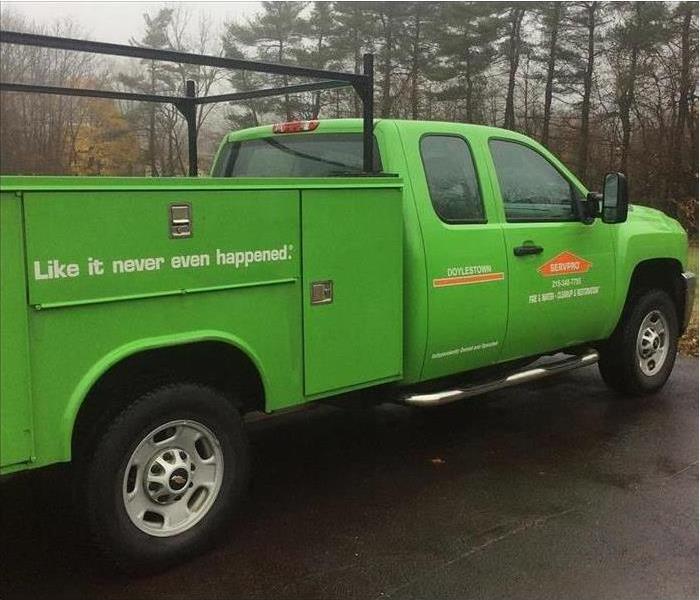 SERVPRO is Faster to any size disaster
SERVPRO is Faster to any size disaster
Flooding, hurricanes, and tornadoes can lead to a catastrophic loss for businesses and homeowners in Flourtown, PA. In many cases, it can leave devastation behind for entire communities, making recovery seem like a daunting task that may never be accomplished. Luckily, there are teams of experts trained, certified, and ready 24/7 to help people get their lives back on track.
What Is a Large Loss?
In the majority of situations, a natural disaster is the cause of a large loss. For property owners, broken pipes, home fires or storm damage also have the potential to create extensive damage. In most standard insurance policies, an insurer considers an event a single-structure massive loss when:
- Restorations require more than $50,000.
- The damage affects multiple floors of a building.
- A major portion of the structure has damage, requiring most of it to be repaired.
- A business has to temporarily close due to the damage.
Why Choose SERVPRO?
When a catastrophic loss happens, time is of the essence. That means you need a trusted large loss recovery team that is Faster to Any Size Disaster. With more than 1,700 franchise locations, you can count on professionals arriving on-site within four hours, as well as the ability to quickly get additional help from nearby locations. That quick action can greatly impede further damage and ensure the claim process goes more smoothly.
Along with local assistance, every recovery team is supported by the national corporation. For clients in desperate need of help, that means access to a comprehensive claims system, enhanced communications, and oversight by a specialized manager. Being a national corporation with local franchises ensures that every professional on the team has the most up-to-date training and certifications to handle any type of mitigation and restoration.
A catastrophic loss is unimaginable to most people. In the event you are forced into that situation, know that there is help just a phone call away.
3 Ways Cities Are Fighting Flooding
6/17/2020 (Permalink)
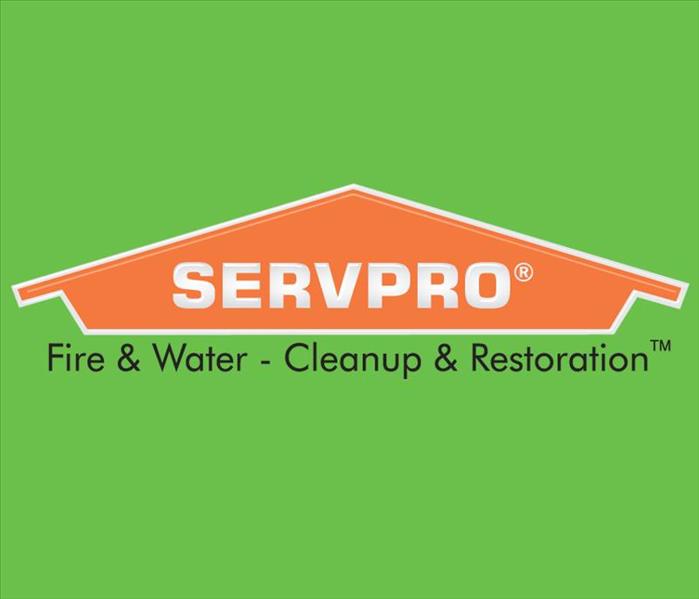 Staying aware and ready is necessary to reduce flood damage.
Staying aware and ready is necessary to reduce flood damage.
The toll of flooding in Whitemarsh, PA, can be devastating and extremely costly. When high water begins to permeate structures, streets, and homes, communities rely on disaster recovery teams to face unexpected dangers and extensive damage. While many cities have retaining walls, levees, reservoirs, or retention ponds to hold water, other methods to stop flooding are being explored to minimize damage. Below are three ways cities are tackling flood issues.
1. New Products
Instead of relying on sandbags, many are turning to new innovations to prevent high water from creating damage, as well as reduce contamination. Watergates are lightweight, easy to deploy, and self-stabilize from water pressure. Inflatable barrier systems make it easier to keep the water at bay and are typically longer and lighter than traditional systems. Modular devices are also now available that can be stacked to the height needed to prevent water seepage.
2. Vegetation
Nature itself offers many ways to minimize flood damage. Many cities are beginning to see the benefits of green roofs, which absorb rainwater and assist with storm management. Instead of additional runoff from buildings, which eventually hits concrete and causes overflowing, these types of roofs can use the water to grow vegetation. Planting gardens, trees, shrubs, and other plants also provide additional ways to absorb excess water. Areas prone to flooding are also re-engineering or creating floodplains to better accommodate the absorption of water, which is lacking in cities covered in concrete.
3. Enhanced Sewage Systems
The main issue with flooding is sewage water. Upgrades to these systems allow for better separation of rainwater and sewer water, reducing the potential for wastewater to surge. Newer piping within the systems enhances their ability to function properly and reduce corrosion and buildup from adding to the effects of high water.
While flood prevention comes in many forms, high water and flooding are still not something property owners can dismiss. Staying aware and ready is necessary to reduce flood damage.
The Top 3 Causes of Tile Discoloration
6/10/2020 (Permalink)
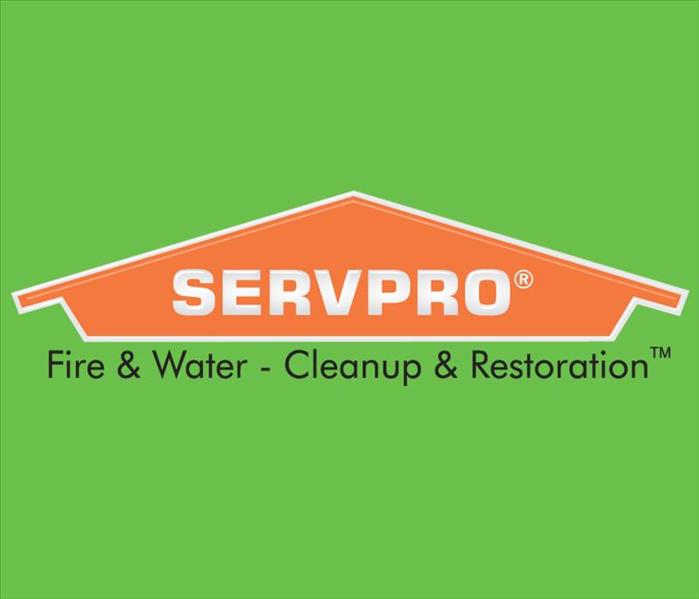 If you're quick to identify the cause, you can proceed with the necessary cleanup, repairs, or replacement equally fast.
If you're quick to identify the cause, you can proceed with the necessary cleanup, repairs, or replacement equally fast.
Ceiling tiles are a staple of commercial buildings. Despite this, they can easily be forgotten, which gives way to phenomena such as tile discoloration. Many causes of discoloration, such as age, are harmless and should not raise much concern. Other causes, such as tile mold, can be particularly alarming. Here are three of the most common sources of discolored ceiling tiles.
1. Water Damage
The most common cause of tile discoloration is water staining, but it can still be challenging to locate the source of the water damage. This is especially true when it comes to commercial buildings where plumbing systems and ventilation systems are very complex. When a pipe leaks or there is a problem with the HVAC unit, the water from either of these can stain the ceiling tiles below them. In just 24-48 hours, tile mold can build up and cause building materials to decay very quickly. When this happens, you should enlist the help of a mold remediation company.
2. UV Rays
Fluorescent lights are the most popular kind of light fixture used in commercial buildings, such as offices, schools, and medical facilities. This kind of lighting is also a source of ultraviolet rays. With enough exposure to these rays, the ceiling tiles surrounding them can slowly become a different color.
3. Age
Many kinds of ceiling tiles are designed to last around 10 years, so they do not have to be replaced too often. Like the rest of the commercial building structure, however, ceiling tiles do age. Brown, yellow, or other discolored areas on the ceiling can be a sign of this.
From old age to tile mold, discoloration in ceiling tiles is a common occurrence in many commercial properties in Wyncote, PA. If you're quick to identify the cause, you can proceed with the necessary cleanup, repairs, or replacement equally fast, allowing you to get your business back on track.
How To Spot a Leaky Shower
6/4/2020 (Permalink)
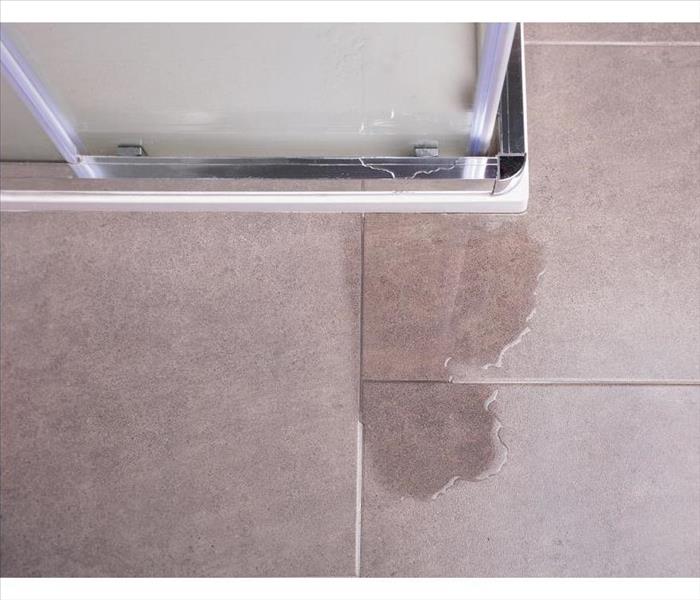 A shower or bathtub leak isn’t something to mess around with
A shower or bathtub leak isn’t something to mess around with
Dealing with a water leak, especially in a bathroom, can cost you a lot of money in water damage repairs. If you suspect that your home in Cheltenham, PA has a shower or bathtub leak, there are some telltale signs to watch out for.
How To Spot a Bathroom Leak
Visible mold or mildew - If you see any mold growing around the tub, you likely have a bathtub leak. Similarly, mold in the grout of shower tiles will indicate a shower pan leak or a leaky faucet.
Musty smell - Sometimes mold is easier to locate by the smell since it gives off a strong, unpleasant odor. If you can’t see it, but can smell it, chances are that the leak is extensive.
Damage to walls - Shower walls begin to warp or bow when a leak is present. The walls can also become stained. Water leaks can also cause wallpaper to blister or start peeling away from the wall.
Damage to flooring - If the bathroom floor starts to show signs of staining or cracking, you can bet you have a leak somewhere in your bathroom.
How To Handle the Leak
Once you have determined that you have a leak, you should contact a plumber right away. A trained professional will know how to pinpoint the exact source of the leak. If you don’t employ a knowledgeable expert to accurately locate where the problem originated, you won’t solve the problem, and it will wind up costing you a lot more money down the road.
If you see or smell mold, it is also important to contact a mold remediation expert to assess the situation. If mold isn’t handled quickly and professionally, it can cause serious damage to your home.
A shower or bathtub leak isn’t something to mess around with. The quicker you have it examined, the easier it will be to fix the problem.
Eliminate Your Home's Cigarette Smoke Smell With These Methods
6/4/2020 (Permalink)
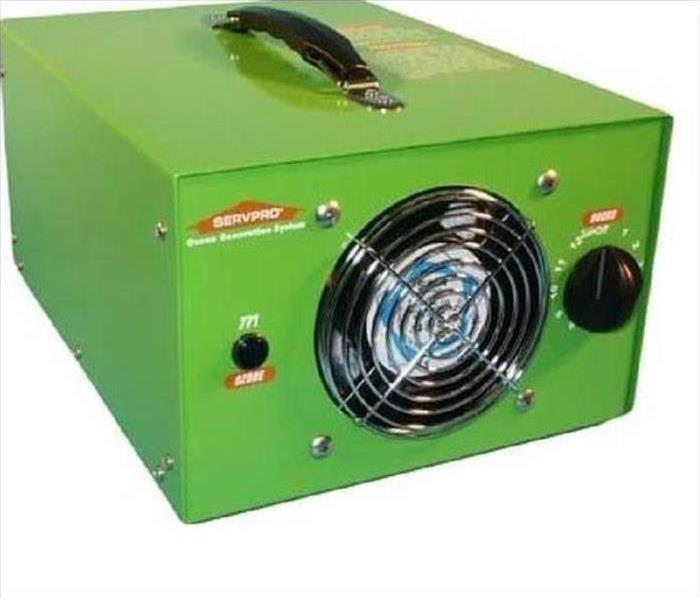 Commercial ozone generators can help you when nothing else is effective
Commercial ozone generators can help you when nothing else is effective
Eliminate Your Home's Cigarette Smoke Smell With These Methods
The overwhelming odor left by cigarette smoke is unfortunately difficult to remove. While this offensive smell can be annoying when it remains on a clothing item or inside the car, it can be worse when it infiltrates your home in Plymouth Meeting, PA. Thankfully, home deodorization can help you eliminate this element and make your house pleasant again. Learn about some of the most effective removal methods.
Improved Ventilation
The first and most cost-effective method for eliminating cigarette odors involves improving the building's ventilation. A strong airflow can reduce the impact of smoke residue, especially when following certain procedures, such as:
- Opening doors and windows
- Activating fans and other fresh air devices
- Keeping air ducts clear, clean and open
- Cleaning HVAC filters
This measure is mostly effective in milder cases where the smell is not that prominent. If it is far stronger, it will only temporarily hide the issue.
Clean or Remove Surfaces
If ventilation does not help you with your current situation, escalate your home deodorization by cleaning or removing the affected surfaces throughout the residence. Generally, you will want to disinfect most hard surfaces with a cleaning solution such as a mild soap, a combination of water and white vinegar or water, and bleach. When dealing with soft surfaces like carpets, mattresses, and most furniture, use specialized deodorizing products. If the smell persists, remove and replace the soft surfaces.
Ozone Generators
Commercial ozone generators can help you when nothing else is effective. These machines produce ozone gas, which has molecules composed of three oxygen atoms. The generators break down regular oxygen molecules into single atoms and then arrange them as ozone molecules. This gas reacts strongly to chemicals like cigarette smoke, efficiently eliminating it. These devices are best operated by professional deodorization technicians, so contact them if you are interested in this treatment.
Cigarette odor can be a problem, especially if it refuses to leave your Plymouth Meeting, PA, property. Try out different home deodorization methods to bring pleasant smells back to your residence.
Your Pets and a Home Fire
5/28/2020 (Permalink)
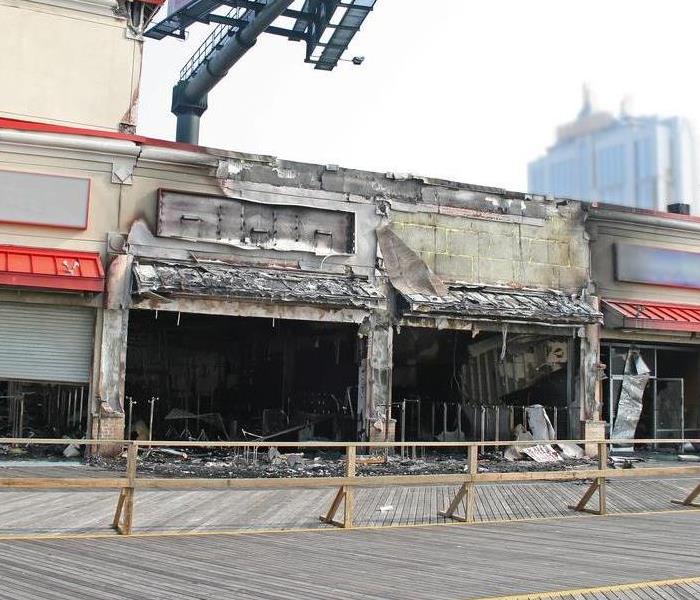 The right company can also record the damage and expenses to help when processing an insurance claim.
The right company can also record the damage and expenses to help when processing an insurance claim.
Home fires are among the most devastating situations you can face. The good news is that they are largely preventable. Most home fires are the result of something a person forgot to do or of something they should have never done. They are also among the most common disasters to befall homeowners and renters. A fire emergency in the U.S. is nowhere as rare as it should be. In addition to the standard plans for fire preparation and response, if you have pets you should include them in your planning. If a fire does break out, make sure you consider the vulnerability of your pets.
Why Pet Safety is So Important
In many cases, a dog or a cat will follow you out of the house in a home fire in Wyncote, PA. However, a fire emergency could make it so your pet cannot run to safety. Here are a few of the more common situations that could endanger a pet:
The animal is old
The dog or cat can no longer hear or smell so well
The pet is in a cage
The animal is confused by smoke or the fire alarm
The pet is a house animal and has never been outside
A pet alert window cling notifies firefighters that a pet resides in the home. The alert is a vital piece of pet preparation for fire and should list the number of pets in the home.
Why Fire Cleanup is Essential
Even a small fire emergency creates a lot of damage that is beyond the scope of most people to repair. A professional fire mitigation company has seen it all before and has the experience, technology, and training to restore your home. The company will follow a proven process that repairs damage, removes odors, and cleans the soot from all surfaces. The right company can also record the damage and expenses to help when processing an insurance claim.
Understanding the Causes of Common Water Heater Noises
5/26/2020 (Permalink)
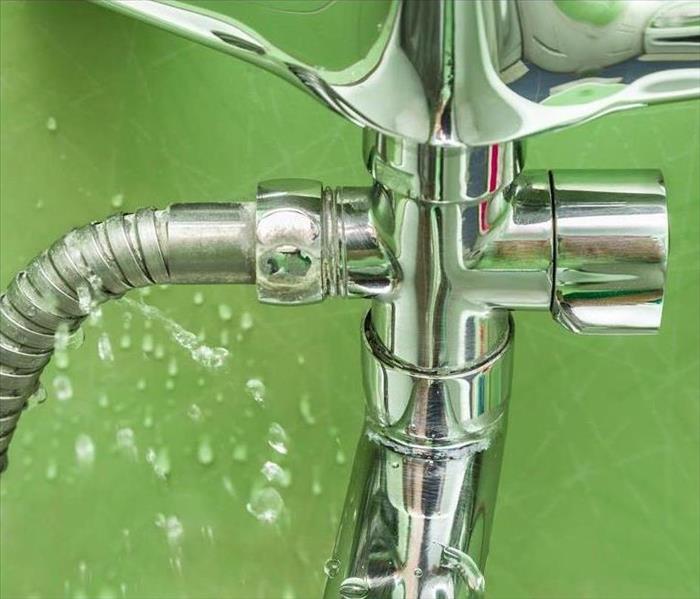 When turning on faucets or showers, have you been startled by a screeching or screaming sound?
When turning on faucets or showers, have you been startled by a screeching or screaming sound?
Every home has a water heater, and the majority have tanks. Most water mitigation companies in Cheltenham, PA, will tell you that tanks can create a lot of noise. While all the noises from these essential appliances don't automatically mean a problem is imminent, being aware of the potentially hazardous sounds is necessary.
Rumbling
Knocking
Humming
Screeching
Ticking
Rumbling
If you have an older unit, you may hear rumbling or popping sounds emanating from the heater. The noises often relate to sediment buildup around the element tubes. You can resolve most of the rumbling noises by performing a water heater flush. However, as these noises often occur in older units, you may want a replacement instead.
Knocking
Knocking sounds likely to relate to loose pipes. When water shuts off abruptly, the force causes the pipes to rattle and knock together or against the wall. The knocking is harmless to your water tank, but if left unchecked, you may end up with pipe and wall damage.
Humming
Humming often occurs in electric water tanks. The heating element in these tanks is vertical. As water moves around the component, it can cause vibrations, which sound like humming from outside the tank. By tightening the heating component, you can eliminate or prevent the hum in your water heater.
Screeching
When turning on faucets or showers, have you been startled by a screeching or screaming sound? When a system forces water through small openings, it can cause unpleasant high pitch noises. In most cases, the noise results from a partially open valve. Check and make sure that all valves are completely open.
Ticking
Ticking or tapping sounds are common in water tanks. The check valve or heat trap ensures that hot water flows in the correct direction, which may cause these odd and unnerving sounds. Replacing the heat trap with a dielectric nipple may eliminate the noise.
Every water heater makes noise. Knowing the difference between each sound is crucial for determining appliance needs and repair.
The Consequences of Water Damage During Construction
5/10/2020 (Permalink)
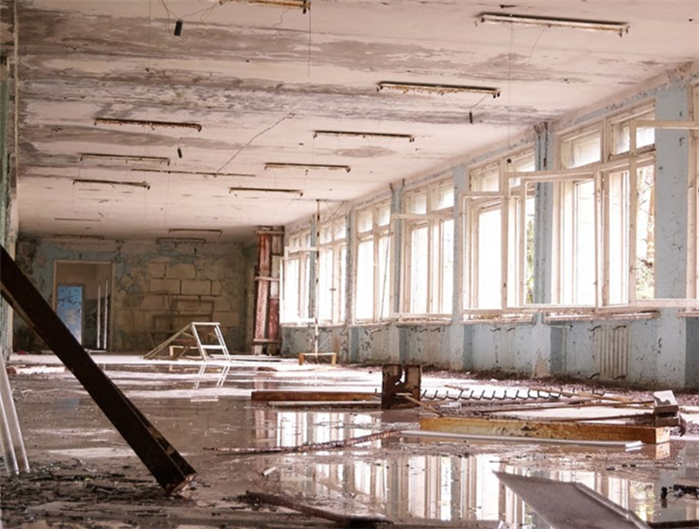 Water damage in a Lafayette Hill, PA
Water damage in a Lafayette Hill, PA
Consequences of Water Damage During Construction
Water damage during construction has a direct effect on building materials. Best practices for site management may prevent many potential causes of damage. Any incidents that occur must first be addressed, such as through water pipe repair, and damage mitigated and restored. Find out more about the consequences of water damage during construction and ways to minimize lasting effects.
Additional Costs
Water damage from any source can rack up the cost of a construction project. Pre-planning should account for a variety of risks:
- Broken pipe
- Exterior plumbing problems
- Rain backup
- Runoff
Water may enter a construction site from any of these sources. The amount and level of contamination will determine the additional cost of cleanup and restoration.
Structural Damage
Incomplete planning or a lack of water leak detection systems may allow problems to go unnoticed or unresolved until a structure has sustained damage. It is essential that exposure does not undermine the integrity of building materials. Piping systems should be tested with air pressure to identify leaks prior to charging with water. Following proper installation procedures may prevent the need for immediate water pipe repair.
Delayed Completion
The time it takes to extract water and dry a construction site can delay a project by days or weeks. Minor water damage that only affects a portion of a structure may cause less of an interruption than a flooded building. Proper site planning and quality assurance and control measures can help to limit damage and get a project back on track as soon as possible.
Although water damage mitigation and cleanup will disrupt the progress of a construction project, these measures can prevent problems down the line. Construction company and commercial property owners should consult with restoration experts about the best way to handle damage cleanup in the wake of water pipe repair or other damage on a construction site in Lafayette Hill, PA.
3 Ways To Stop the Spread of Mold
5/10/2020 (Permalink)
 Turning off the HVAC system is essential to stop spores from spreading throughout a building
Turning off the HVAC system is essential to stop spores from spreading throughout a building
3 Ways To Stop the Spread of Mold
Once mold has started growing in a structure, spores can spread if containment measures are not in place and conditions are conducive to growth. Whether black mold or any other type of fungi are infesting a building in Whitemarsh, PA, a property owner should take the following measures to keep the problem from becoming more severe before mold cleanup can take place.
1. Restrict Air Circulation
If mold is visible in any part of a structure or a musty smell is present, a building owner should shut down the HVAC system. Circulating air can carries spores to every part of a structure through air ducts, registers, and returns. Mold may then form on damp surfaces anywhere in the building or in ductwork.
2. Reduce Moisture
Mold cannot grow without a steady supply of moisture. Resolving a moisture problem caused by leaky plumbing or roofing or any other source will make mold less likely to thrive. Even after available moisture has been reduced, mold that has already formed may continue through the growth cycle and become dormant until moisture levels rise again.
3. Clean Up Mold
Remediation is advisable regardless of the species of mold growing in a structure. Some types of mold, such as stachybotrys chartarum or black mold, are toxigenic and may pose risks to the occupants of a structure. Mold cleanup is a process that starts with inspection and containment. Highly contaminated building materials such as cellulose-based insulation and drywall may need to be torn out and replaced. Other materials must be cleaned and dried before the affected area can be restored.
Turning off the HVAC system is essential to stop spores from spreading throughout a building. Reducing moisture can slow growth rates and discourage new colonies from forming. Remediation will be necessary to control an infestation and reduce risks associated with black mold and other toxigenic fungi.
Fire Insurance for Landlords and Tenants
5/8/2020 (Permalink)
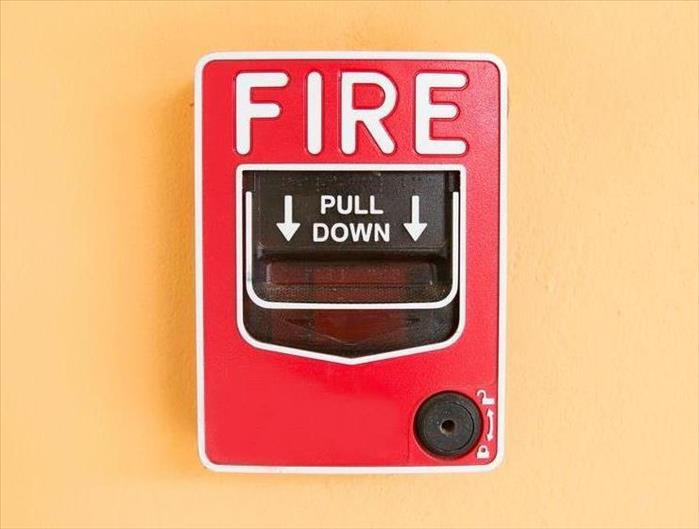 Ask your agent if you have any questions.
Ask your agent if you have any questions.
An apartment fire in Flourtown, PA, can be traumatic for all involved. Fortunately, the right insurance policies can help both landlords and tenants get back to normal as quickly as possible.
Insurance for Renters
When fire damage occurs to a rented apartment, the tenant is not responsible for damage to the building itself. However, the renter is responsible for his or her personal property. A renter's insurance policy will cover either the actual cash value of the contents or the replacement cost. Actual cash value means the insured will receive a payment that covers the value of the items directly before the loss. They will only receive the depreciated value for the property. A policy that covers replacement costs will provide the insured with enough money to repair or replace the damaged items. In addition to contents, renter's insurance typically covers a few other things:
Liability
Small medical payments to third parties
Temporary living expenses
Liability means that if the insured accidentally starts the apartment fire, the insurance company can deal with claims made by third parties against the tenant. The medical payments to others generally cover small medical payments that third parties may incur due to the fire, even when it has not been proven that the insured is liable for the fire. Temporary living expenses coverage will provide the insured with funds to temporarily relocate while their apartment is being restored.
Insurance for Property Owners
There are different types of insurance that property owners can purchase, including general liability, landlord's insurance, and specialized fire policy. You can talk to your insurance agent to determine which combination of policies is best for you and your apartment building. Make sure you read and understand the details of all your insurance policies.
Ask your agent if you have any questions.
Insurance policies help landlords and tenants financially after an apartment fire. If you need help with the restoration process, an experienced restoration service can help you get your property back to normal quickly and safely.
Can Landscaping Reduce Flood Risks?
4/28/2020 (Permalink)
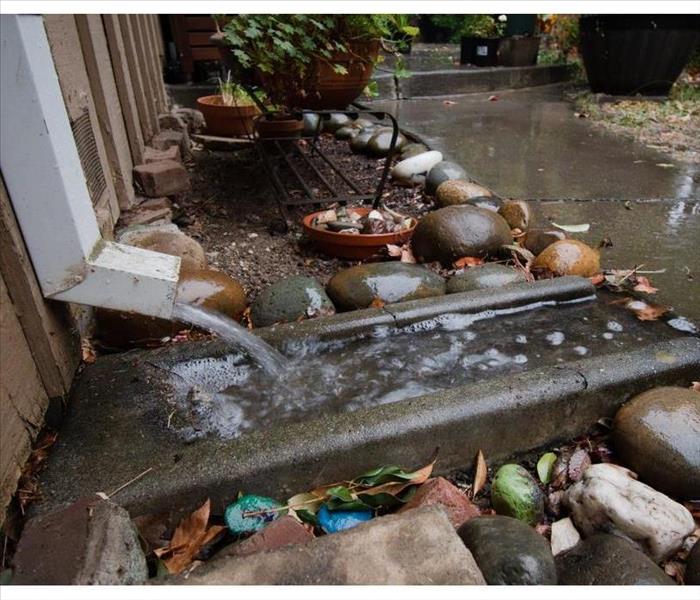 Make sure downspouts are extended to at least three feet away from your house to avoid flooding
Make sure downspouts are extended to at least three feet away from your house to avoid flooding
Ways To Minimize The Risk of Flooding
Heavy rain and severe weather pose an outside flooding risk to a residence in Wyndmoor, PA. Homeowners seeking effective flood proofing measures may need to adjust the lay of the land. The following priorities can minimize the risk of water damage.
Diverting Drainage
The roof of any residence should have functional rain drainage. A system with the following components can reduce the risk of flooding:
- Gutters
- Downspouts
- Downspout diverter
Gutters and downspouts collect rain from the roof and reduce the risk of roof damage that leads to leaks. A diverter directs water away from the base of the structure. It is important to make sure that drainage is clear and functional and that the diverter is angled properly to reduce pooling around the foundation and runoff.
Slowing Runoff
The landscape of a property should be designed for functionality as well as appearance. The most effective way to slow the rate of runoff is to improve the tilth or texture of soil. A six percent slope or six inches per 100-foot run with a layer of topsoil can be helpful for managing outside flooding. The flow of runoff can also be slowed by ground cover, such as perennial plants.
Promoting Absorption
Features such as rain gardens and swales are helpful for encouraging water to sink into the ground during and after a rain storm. Swales are depressions that may contain rocks or plants leading up to a drain. Rain gardens may be situated in a swale or on any other part of the landscape where absorption would be helpful for managing runoff or lowering flooding risks.
All of these measures can reduce the risk of outside flooding at a residence in Wyndmoor, PA. Many different types of landscaping materials and techniques are useful for floodproofing. Consult with local or regional landscaping professionals to determine the best solutions for managing runoff.
How To Tell if Your Air Ducts Have Mold
4/27/2020 (Permalink)
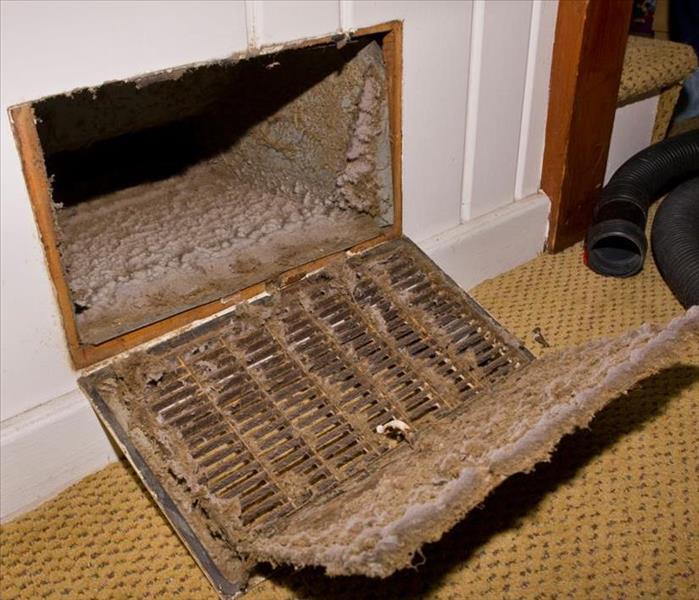 When it comes to HVAC cleaning, make sure to get the job done right.
When it comes to HVAC cleaning, make sure to get the job done right.
You may not realize it, but the heating and cooling (HVAC) system in your building provides the perfect conditions for mold to grow. The moisture that collects in your air conditioning drip pans and evaporator coils, as well as in the air ducts, creates just the right environment. As cool or heated air is blown into the building through the vents, it will bring mold and mildew along with it. A mold remediation specialist should inspect the system periodically and conduct a thorough HVAC cleaning.
Between inspections by a professional, there are some telltale signs to watch for that would indicate mold growth.
Look for Mold in Your Heating and Cooling System
Routine inspections are the best way to keep your building in Cheltenham, PA, from becoming overrun by mold. Look for any signs of mold in the following areas:
Ductwork - Run a flashlight into the ducts to look for mold and moisture. Mold is usually spotty and black or gray.
Registers - Inspect the registers for any visible signs of mold.
Drip pans for the furnace and air conditioner - Make sure that the pans are draining. If they become plugged, moisture can accumulate, which is an invitation for mold.
Evaporator coils - Mold can grow around the coils, so inspect them carefully.
If any Mold is spotted, call a professional as soon as possible to inspect the system and perform an HVAC cleaning.
Let Your Nose Be Your Guide
Since mold spores are very light, they can easily become airborne. Mold tends to have a very distinct and unpleasant smell, so you may smell it even before you see it. Be alert to any unusual odors near the building’s registers.
You might think that you can do a good job cleaning vents and air ducts, but only a professional can tackle the problem safely and properly. When it comes to HVAC cleaning, make sure to get the job done right.
The Dangers of Flooding From Sprinklers
4/22/2020 (Permalink)
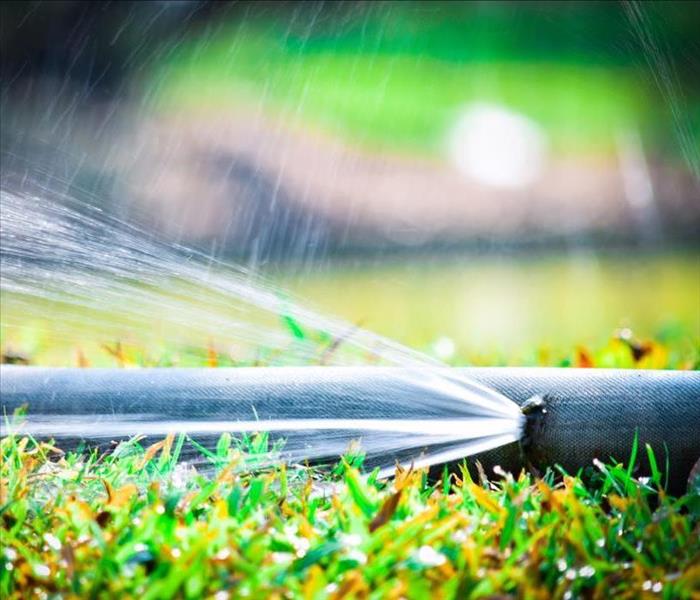 Seen in this light, irrigation maintenance protects a company from possible flooding and the headaches that follow.
Seen in this light, irrigation maintenance protects a company from possible flooding and the headaches that follow.
Landscaped grounds in front of a commercial property in Cheltenham, PA, look good and reflect well on the company. It is all part of a positive brand image. For best results, an irrigation and watering system is needed to keep the flowers blooming and the grass green. With this, though, comes the necessity of regular irrigation maintenance. The hallmarks of an effective maintenance program include the following steps:
Inspection of sprinkler heads, nozzles valves, and pipes
Replacement of worn or faulty components
Communication with the contractor
Adaptation to the changing seasons
Properly maintained, a good system will beautify grounds and lower water usage. Poor maintenance could lead to sprinkler flooding.
Results of Poor Maintenance
For the most part, an irrigation system operates on its own and turns on and off on a programmed schedule. With a bit of irrigation maintenance, this should continue throughout the seasons. Occasionally, though, sprinkler heads break and continue to spray water for hours. This excess spray could harm the landscaping, but if it is near a building it could also seep into the property. Failure to blow out sprinkler lines in the cold months could result in water lines that freeze and then burst. If not discovered quickly, large amounts of water could harm a building, necessitating the need for a qualified water mitigation company.
Effects of Water Damage
Excess water in a building can result in a number of harmful effects. It could saturate walls and insulation and moisten contents such as clothing, furniture, and documents. The longer the damages go untreated, the greater the harm and the more expensive the cleanup. The corrosive power of water has the power to break down materials such as wood and fabric over time. A high level of moisture in a building can lead to mold growth.
Seen in this light, irrigation maintenance protects a company from possible flooding and the headaches that follow.
Do I Need Business Interruption Insurance?
4/19/2020 (Permalink)
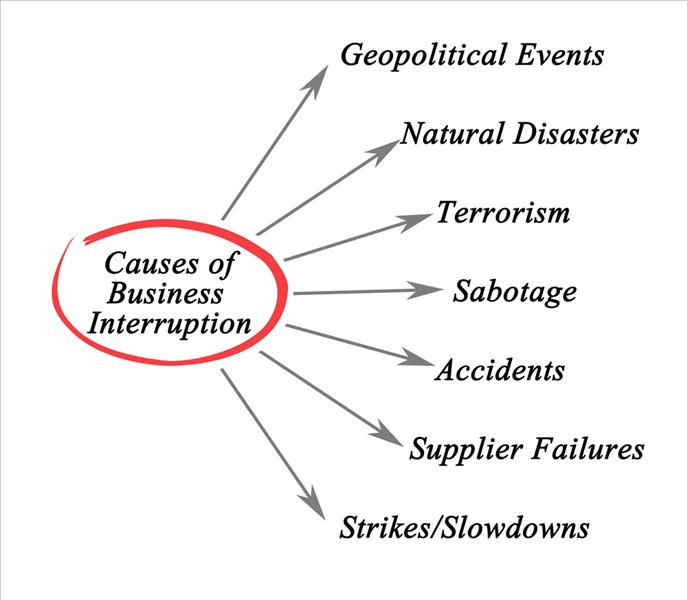 It may be good to purchase business interruption insurance
It may be good to purchase business interruption insurance
Your commercial insurance policy will pay for damages to your physical property in Wyncote, PA while you are recovering from a disaster, such as a business fire. If you have to stop business operations temporarily or relocate while renovations take place, however, your basic policy won’t cover any of the business interruption costs. You should talk with your insurance agent about the need for an additional business income insurance policy.
What Does Business Income Insurance Cover?
This interruption policy can be added to your basic coverage to help you recoup the revenue lost during the business downtime. It’s specifically designed to help a business maintain the same financial position it had before the fire. The following are items typically covered under this additional policy:
Profits - Your agent will look at your financial statements from several previous months to determine how much profit could have been earned during the downtime.
Fixed costs - This includes operating expenses, such as payroll, building rent or mortgage payments, utilities and other costs to run operations.
Extra expenses - Any additional costs will be covered, within reason, if needed for the business operations to continue while the fire cleaning takes place.
Temporary relocation costs - Moving expenses, including rent for a temporary location, can be covered under specific policies.
There is an additional policy that can be purchased to cover your business, called contingent business interruption insurance. If one of your key suppliers has suffered building damage due to an event, such as a natural disaster, and can no longer supply to you, your lost revenues can be recouped.
It’s best to talk with your insurance agent about all of the options available so that you make the right choice for your business. While it may seem unnecessary to purchase business interruption insurance for your property, not having it when you need it most can be devastating to your business.
Tax Relief for Storm Damage
4/3/2020 (Permalink)
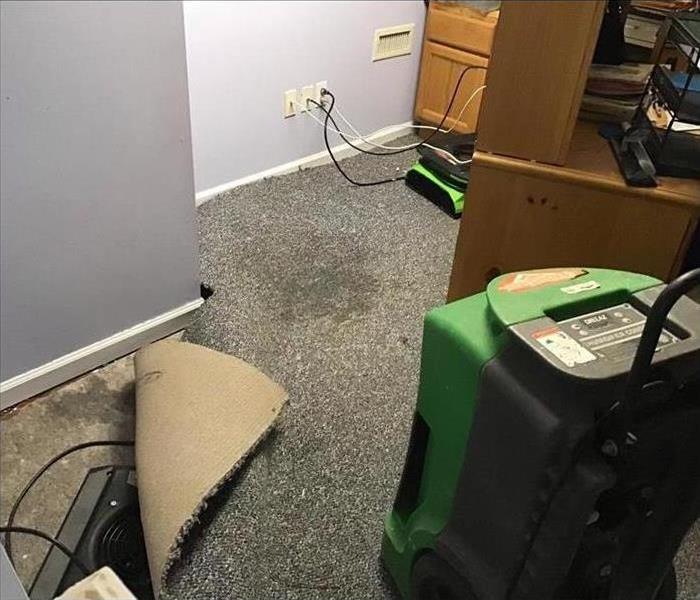 Call SERVPRO after storm damage in Flourtown, PA
Call SERVPRO after storm damage in Flourtown, PA
Tax Relief for Storm Damage
If your commercial property in Flourtown, PA, has storm damage, it may cost a lot to repair the damage, replace ruined items and restore the building to a functional state. Your flood policy likely covers a large portion of the cost of flood mitigation services, but what about the inevitable out-of-pocket costs? It is likely that you are able to write off at least some of the costs when you file your next tax return. Here are three tips to help you do so.
1. Check Disaster Declaration
Whenever there is a large-scale storm, such as a tornado or hurricane that covers a wide area of the country, the President will often declare the areas affected as disaster areas. This declaration helps business owners with part of the eligibility verification. You may also be able to file under whichever recent year gives you the best tax break. A list of federally declared disaster areas is frequently updated on the FEMA website.
2. Know Property Value
The amount of out-of-pocket expenses you are able to deduct for storm damage may depend on the value of your property. With most losses, you calculate the amount based on either the tax basis or fair market value of your building, whichever is smaller. The tax basis is usually the amount you originally paid for the property, whereas the fair market value is its current appraisal. Your tax accountant can help you navigate whether this information is needed when you are calculating your tax deductible expenses.
3. Prove Property Ownership
In order to get a tax break for damage, you must own the property. If you rent your office space, therefore, you are not eligible for this particular tax break. The burden of proof of property ownership is on the filer.
Storm damage can be expensive to repair, even if you have flood insurance. You may be able to get some tax relief to ease the financial burden.
How To Prevent Damage in Your Office From Flooding
3/30/2020 (Permalink)
 By following these steps, you can keep flood damage to a minimum. Start today so you can be prepared tomorrow.
By following these steps, you can keep flood damage to a minimum. Start today so you can be prepared tomorrow.
It can be every property owner's worst nightmare: Coming into your building and seeing water everywhere. Flood damage can cause serious problems for building materials, electronics, documents, and personal belongings. You can take comfort to know that highly qualified flood remediation crews can restore your office. Still, it's even better if you can learn how to minimize the damage in the first place.
Inspect Key Areas of the Building
In some instances, you won't have any control over how and when flooding occurs in your building. A sewage backup, main water line break or massive storm such as a hurricane could come without warning. However, you can reduce your risk of suffering heavy damage by doing the following:
Regularly maintain the plumbing system in your building.
Check the roof annually for weak spots or other defects.
Inspect the rain gutters and downspouts to make sure they divert water away from the property.
Move Items To Higher Ground
You can minimize flood damage by acting quickly and getting materials off the floor. As soon as you notice water coming into your building, get computers, printers, books, files, and furniture off the ground. Flooding will usually start on lower levels, so it's good to move these items as high as possible.
Put Barriers in Place
You can be ready for storm damage in Wyncote, PA, by looking at your landscaping. Planting trees around the perimeter of your grounds can keep the water back if nearby waterways overflow or if sewers overflow. You should also have sandbags handy and place then around vulnerable areas of the building.
Seal Windows and Doors
Go through your building and reseal windowsills and doorframes. You can also apply a waterproof veneer to outside walls. These measures will protect you against shallow flooding.
By following these steps, you can keep flood damage to a minimum. Start today so you can be prepared tomorrow.
Learn the Basics of Protective Equipment for Mold Remediation
3/25/2020 (Permalink)
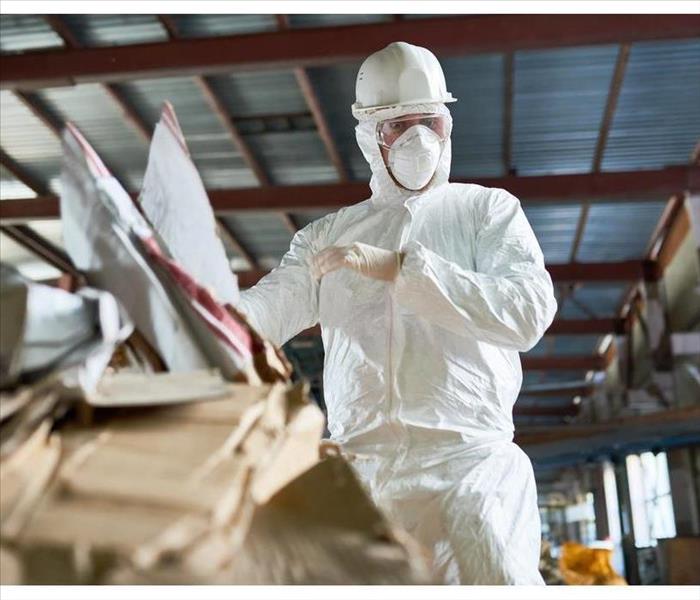 Mold remediators should wear the right PPE before a job
Mold remediators should wear the right PPE before a job
While mold is not always deadly, it is still important for mold remediation professionals to protect themselves when they work. From face masks to shoe covers, they need to shield as much of their body as possible to avoid potential health risks. When these technicians arrive at your residence, expect them to cover the following body parts with the appropriate personal protective equipment.
Hands
Protection of hands is essential since they are both necessary for important functions and are constantly exposed to other people and objects. Mold removers always wear gloves that not only protect their hands from exposure but also prevent spores from clinging on to them and spreading to other areas. Nitrile and rubber gloves are popular choices since their materials are difficult to penetrate. These gloves must also be the right size and fit, as loose gloves can expose skin to spores.
Face and Head
Cleanup professionals should also protect their heads, especially their faces. This PPE consists of multiple items they might need depending on the severity of the mold damage:
- Face masks
- Respirators
- Goggles
- Hair covers
Certain protective gear is designed for different situations. For example, standard respirators protect workers dealing with nontoxic substances, while respirators that cover the entire face are appropriate for toxic environments and advanced mold spread.
Rest of the Body
The crew working on your Plymouth Meeting, PA, house also use protective equipment for the rest of the body. They protect their feet using shoe covers and heavy-duty boots that prevent spore spread. For minor cases, they wear clothing such as long-sleeved shirts and pants alongside head, face and hand protection. Meanwhile, larger mold presence, toxic contents and highly humid areas require remediators to use highly dense Tyvek suits, which cover the entire body.
Mold remediators should wear the right PPE before a job, such as gloves, boots and face masks. Ensure that the people working in your home equip these items to protect everyone involved.
Do's and Don'ts of Using Fire Extinguisher
3/15/2020 (Permalink)
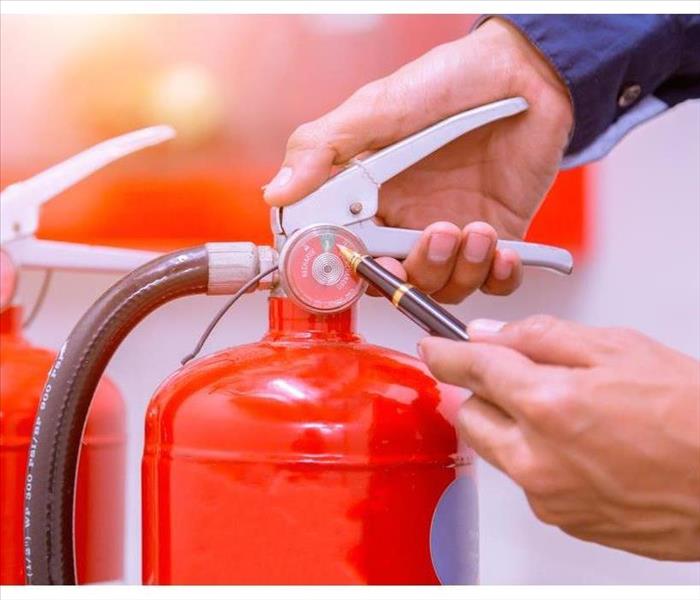 A fire extinguisher is an important thing to have.
A fire extinguisher is an important thing to have.
A fire extinguisher is a key tool in the fight to protect your Cheltenham, PA property from kitchen fires or worse. Fortunately, most home or business fire extinguishers will sit gathering dust for years. But in the unfortunate event that you do need to use your extinguisher, it’s an absolute necessity that you know how to do it effectively. Here are a few do’s and don’ts of using an extinguisher.
How Extinguishers Work
On its face, an extinguisher works by pulling a trigger to release a fire extinguishing material. What that material is can vary but some of the most common ones are the following:
Water extinguishers - these use water to remove heat from the fire
Dry chemical extinguishers - these work by smothering a fire with foam or dry powder
The average fire extinguisher is a chemical one. Here are a few do’s and don’ts of using these devices.
Do Shoot the Base
Shooting wildly at a fire is not the best way to put it out. Instead, you’ll want to shoot the extinguisher at the fire’s base to extinguish the flames quickly. Point and shoot the extinguisher at the bottom of the flames.
Don’t Shoot Indiscriminately
The average extinguisher has only about 20 to 30 seconds of propellant power, so you should use it wisely. That means squeezing the trigger in a controlled way to ensure the extinguishing agent sprays the fire and not the rest of your property.
Do Use a Sweeping Motion
It’s important that when you spray, you use a sweeping motion. Spray across the base of the flames to ensure that the whole fire is covered with the extinguishing agent.
A fire extinguisher is an important thing to have. But it’s even more important to know how to use it. Use these tips from your local fire damage pros and you’ll know how to use an extinguisher should the need ever arise.
Handling a Flooded Basement
3/11/2020 (Permalink)
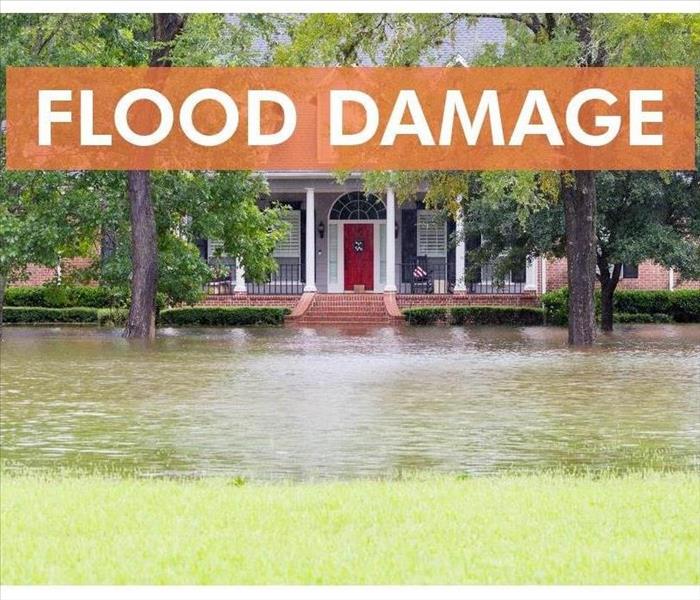 If you've experienced flooding in your home, don't panic.
If you've experienced flooding in your home, don't panic.
Should you find standing water in the basement of your Whitemarsh, PA, home, you may be unsure how to handle the situation. Any time there are conditions that lead to flooding, such as severe weather or a broken pipe, you need to take action quickly to lessen the long-term damage. Here are some tips to handle a basement flood.
Safety
Cleanup
Restoration
Stay Safe
Safety is of utmost concern when you're dealing with flood conditions. Do not attempt to enter a flooded basement yourself. If you have a circuit breaker that is located away from the water, immediately shut off power to your home. If you cannot access the breaker, evacuate your home. When everybody is in a safe location, contact professionals in emergency basement cleanup and restoration. This is a crucial and time-sensitive step to ensure that your home can be properly dried and restored.
Clean Up
If you can safely stay in your home, ensure that all electronic devices are powered off, and start moving wet objects to a dry area. Carpets, rugs, couches, and other porous items need to be removed from standing water and thoroughly dried and sanitized. Professional services are the best way to return your home and your belongings to a pre-disaster state. Recovery from flooding takes time and work, but experts can make the process easier.
Repair and Restore
Since water can enter your home in several ways, it's imperative to find the source of the water in order to prevent additional floods. If the flood was caused by a sewer backup or a burst pipe, contact experts to help with pipe repair. If the flood was caused by severe weather, your home probably has cracks or holes in the walls that allow the water to come in. Creating proper drainage and installing or repairing basement waterproofing may be necessary.
If you've experienced flooding in your home, don't panic. Call professionals as soon as possible to help you get back on your feet.
Safeguard Against Storm Damage
3/10/2020 (Permalink)
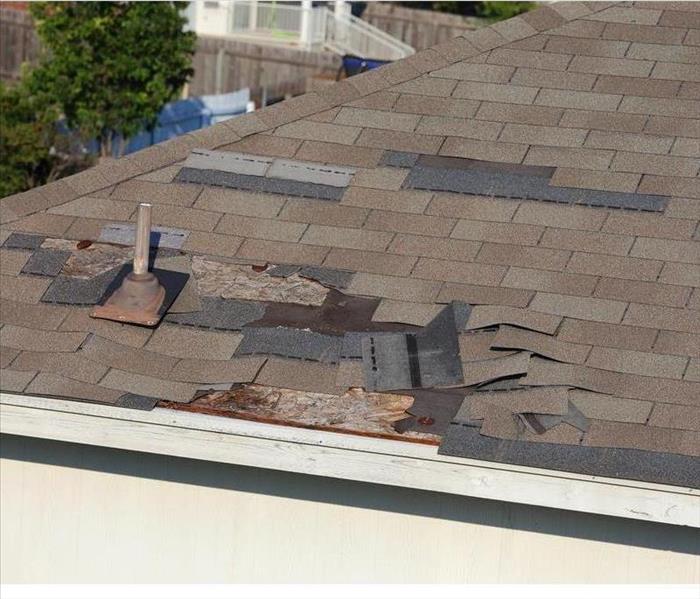 Exterior maintenance should be a priority for property owners.
Exterior maintenance should be a priority for property owners.
Safeguard Against Storm Damage
Regardless of the size of your property, or properties, in Whitemarsh, PA, regular maintenance and inspections can help structures better weather the weather. Along with inspecting the inside for issues including plumbing, water damage and HVAC operations, keeping a building maintained requires exterior maintenance. Property owners should ensure a regular building inspection is on the to-do list.
Below are four key areas to inspect to guard against storms.
Roofs
Hail, high winds and precipitation can do a number on roofs. Although built to last, even a small point of weakness can quickly turn into a major repair.
Check the following during a roof inspection:
1. Ensure shingles tightly attached and fit together, show no signs of tearing or crack and that none are missing.
2. Verify that roof sheathing is firmly nailed down.
3. Check skylights, pipes, HVAC units or other equipment is properly affixed.
4. Inspect gutters for any clogs or gaps.
5. Attics and ceilings should also be inspected for signs of water damage, rot or leaks.
Doors and Windows
Entry points are also key items for exterior maintenance inspections. Cracks or crevices in window or door seals can create an inviting opening for the storm to come inside. Along with ensuring proper, tight installation, upgrading to triple-hinged doors and wind-resistant windows is an option to beef up storm protection.
Foundations
Any cracks or missing pieces of foundation can gradually lead to growing water damage problems, requiring a water remediation expert to restore and waterproof the building. Along with obvious signs in the foundation itself, inspect walls, floors, support beams and windows for signs of air leaks or water damage.
Landscaping
The right landscaping can help keep water from building up around the foundation. Check that there is a proper slope away from the building. Also, trees may add an appealing aesthetic, but they need to be maintained to keep branches from damaging the roof or crashing into windows.
Exterior maintenance should be a priority for property owners. A quick check of the above areas can help you find problems before they turn into bigger ones.
Is Your Sewer System About To Break?
3/9/2020 (Permalink)
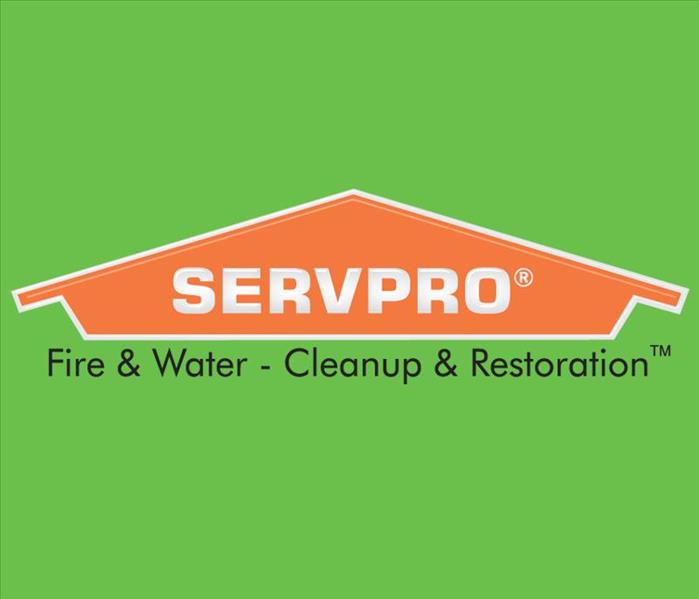 Don't let a blocked sewer shut down your place.
Don't let a blocked sewer shut down your place.
As a business owner in Whitemarsh, PA, keeping the doors open and workers employed is a top priority. You don't want to close up shop because a blocked sewer pipe has burst, establishing a working hazard. Is it possible to know it's about to happen? By keeping a sharp eye out, proprietors might save themselves a great deal of headache, money and time by locating issues sooner rather than later, avoiding a major catastrophe.
1. Watch Your Inside Plumbing
Have you noticed drains clogging more than usual? A commode that doesn't flush easily or works slowly is a sign of a possible toilet overflow. Contact a plumber to complete an evaluation of the pipes. Sometimes it's not always that noticeable. Is there an unusual smell coming from the sink, or do you hear strange noises when fixtures are used? Something could be happening. Therefore, if you notice bulging walls or ceiling tiles, the pipe may have an complication. Have someone out to locate a possible leak within the walls. If not caught promptly, category 3 water could contaminate the premises, requiring the assistance of a water remediation company.
2. Evaluate the Structure
Don't neglect the surrounding yard. Small changes, developing over time, could mean a blocked sewer. For example, have you noticed cracks or changes in the ground? Are problems showing in the stucco or walls? If tree roots or wear and tear affect the foundation, they could also impact pipes. That overgrown system can puncture a pipe line, and the shifting dirt may impact the lines.
3. Inspect Landscaping
Dips, holes or puddles could be an early sign of a leak, increasing the potential of pipe breaks. So, if you notice something changing with your bushes or trees, call out someone to snake the pipes, searching for corrosion or degradation in the copper.
Don't let a blocked sewer shut down your place. Stay aware, inspecting rooms and the outdoors. Minor shifts should be noted and watched. Should they persist or you feel concerned, seek help from professional services.
Pet Fire Safety
3/8/2020 (Permalink)
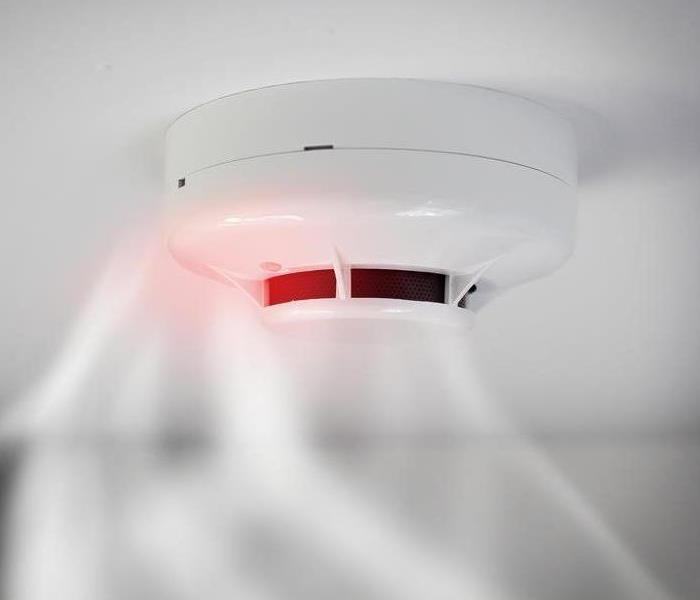 Puppies and kittens are some of the most curious animals when they are babies so take extra precautions.
Puppies and kittens are some of the most curious animals when they are babies so take extra precautions.
The best way to protect your pet from the effects of a fire is to have them incorporated into your own fire safety plan if a fire was to break out. Below are some tips on how to prevent your pet from starting a fire.
Prevent Your Pet from Starting Fires
- Extinguish Open Flames
Animals are generally curious beings and have a tendency sometimes to explore household items, such as a lit candle, that can put both them and your family in danger. Be sure to put out all candles if you will not be nearby.
- Remove Stove Knobs
It is important to remove or cover stove knobs that pets could potentially turn on while you are out of the house.
- Invest in Flameless Candles
As discussed above, candles can be a dangerous item to have lit when pets are around. Investing in flameless candles can be a much safer option and save you from worrying about blowing out candles before leaving a room.
- Secure Young Pets
Puppies and kittens are some of the most curious animals when they are babies so take extra precautions if you have a young pet to avoid potential dangers.
Content By: https://www.redcross.org/get-help/how-to-prepare-for-emergencies/types-of-emergencies/fire/pet-fire-safety.html
How can SERVPRO help during viral outbreaks?
3/6/2020 (Permalink)
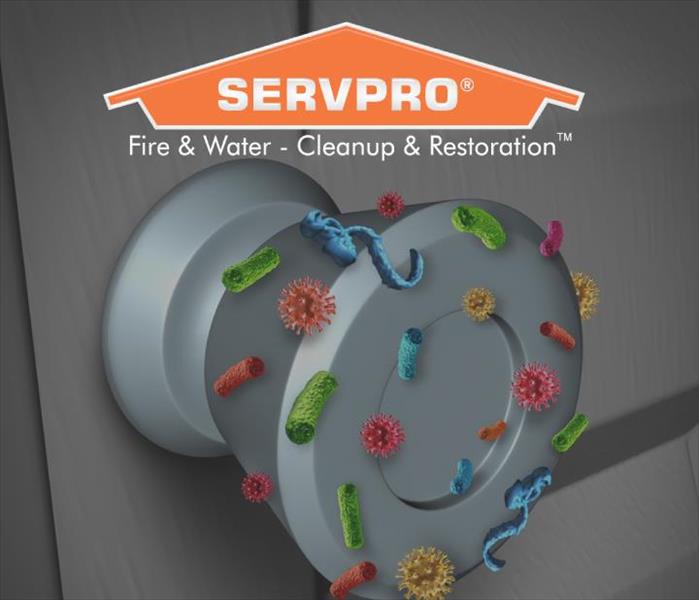 How can SERVPRO help during the viral outbreaks?
How can SERVPRO help during the viral outbreaks?
With the recent viral outbreak and the flu going around, many people are scrambling to ensure their property is protected. There is a consistent rise in business owners/parents/caregiver's interest to ensure that facilities are taking every precaution to prevent any widespread outbreaks. In this article, we will cover how viral strains spread, how you can protect yourself, and how SERVPRO of Whitemarsh/Cheltenham can provide assistance with cleaning and disinfection.
How can I protect myself, my family, my employees, and my customers?
A number of things can be done to protect yourself and others from a virus. Make sure you are washing your hands regularly, covering your mouth when you sneeze or cough, and ensure the meat and eggs you consume are fully cooked. Avoid close contact with those who are displaying symptoms of respiratory illness. With an incubation period ranging from 1-14 days, according to the World Health Organization, it is imperative to schedule commercial cleaning to further prevent the spread of the virus on high touchpoints. Pathogens can rarely be seen or detected with the naked eye; but surfaces, toys, furniture, doorknobs, etc are often carriers for communicable disease. When it comes to decontaminating surfaces and airborne Infectious diseases, it’s important to call on a professional that is trained & certified in biohazard remediation including the disinfecting of infectious disease. Surface cleaning is not enough these days, and unfortunately, the average consumer does not fully understand the products and the chemical components behind the product's intended usage. So many products we use and are familiar with are not used properly and thus get rendered ineffective which is not the case.
How can SERVPRO help during the viral outbreaks?
Our SERVPRO team offers thorough cleaning and disinfection services for schools, hospitals, and commercial properties. Our crews are always ready to go in their PPE to ensure the buildings in our community are safe to enter.
Our disinfectants & virucides are EPA, FDA, and OSHA compliant, they have a very low toxicity rating, and are effective against the most common disease and odor-causing organisms. SERVPROXIDE has demonstrated effectiveness against viruses on hard non-porous surfaces. More product-specific information can be obtained on the TDS & SDS.
Call SERVPRO of Whitemarsh/Cheltenham today to ensure you have a proper disease control prevention strategy moving forward to help support a healthy and safe atmosphere. And should you ever suspect a potential outbreak, we can be onsite 24/7/365 to reduce and potentially prevent any business interruption and ensure the wellness of your students & coworkers.
Maintain Your Commercial Roof To Prevent Storm Damage
3/6/2020 (Permalink)
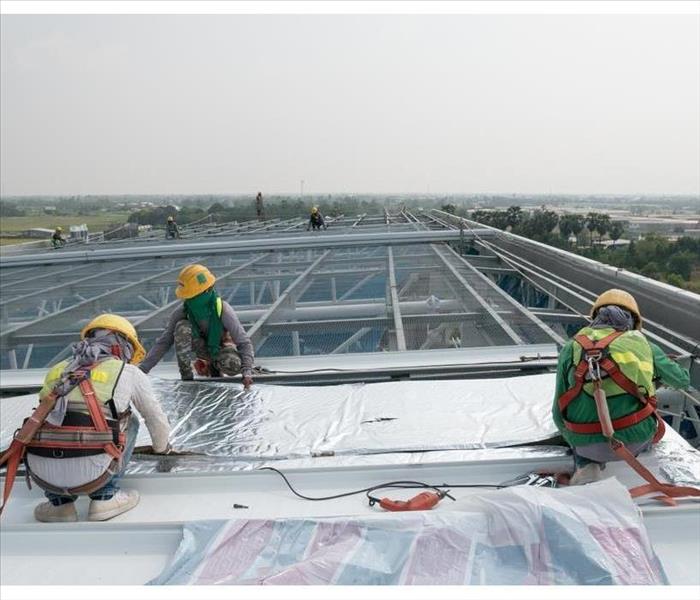 Commercial roof maintenance in Cheltenham, PA
Commercial roof maintenance in Cheltenham, PA
Take These Roof Maintenance Strategies To Prevent Larger Problems
No matter the strength of your commercial roof, harsh elements like wind and water can eventually wear it down and create roof damage. This leaves your business and the people inside vulnerable to the conditions. Even though insurance plans and water damage remediation can help you manage this loss, proactive roof maintenance is the most cost-effective solution. Consider taking these roof maintenance strategies to prevent larger problems.
1. Organize an Inspection
Since roofs withstand all sorts of debris, water contact and wind damage, it is important to organize a detailed inspection at least twice a year. The sooner you can find problems, the faster you can fix them before the damage increases and places your clients and personnel in danger. The roof can be inspected by anyone who knows about the system, such as yourself, maintenance crew or an engineer. Practice the appropriate safety measures during the inspection.
2. Take Note of the Flaws
You and/or the employee handling the sweep needs to find all roof damage. The most common flaws involve cracks and breaks in the material, as well as components that are peeling off. Also, look for debris, especially if it blocks drainage or it is too close to the roof, such as tree branches. You are not able to conduct most of these fixes yourself, so keep a note on the flaws and describe them in detail. A specialist will need the information for roof rebuild or repair procedures.
3. Clear Immediate Hazards
While you cannot resolve all problems without a professional, you can mitigate damage by clearing the debris in the roof. Start by removing trash from the drainpipes, since blockage leads to water build-up, extra moisture, and structural damage. Also, cut any trees with branches near the roof. During a storm, they can fall and damage the location.
Proper and consistent maintenance is the most effective method of combating roof damage in Cheltenham, PA, businesses. Learn about these upkeep tactics to protect your establishment.
5 Things To Do Before an Adjuster Arrives
3/5/2020 (Permalink)
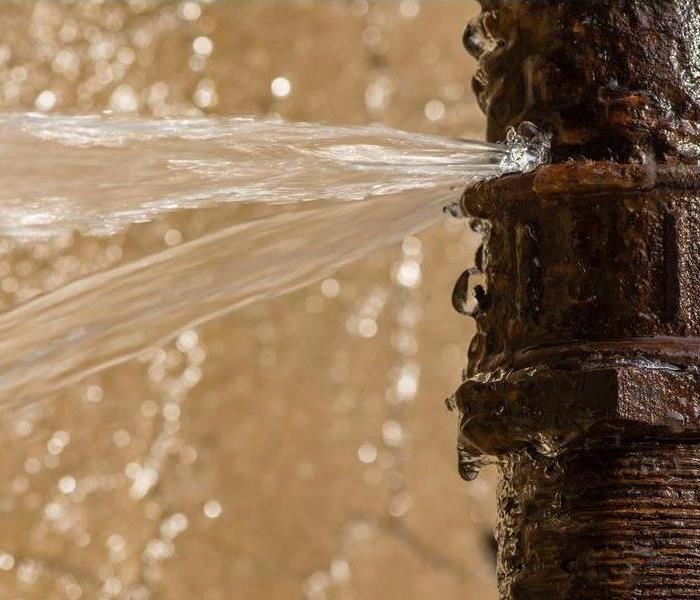 Complete some leg work before the home adjuster inspection. This could help expedite the process and make settlement easier.
Complete some leg work before the home adjuster inspection. This could help expedite the process and make settlement easier.
If you've experienced water damage, you probably called your insurance company in Whitemarsh, PA, requesting to file a claim. This isn't always a quick and simple process, however. Before a check is cut and approval is given, a home adjuster needs to visit the location, determining the extent of the problem. Be prepared. Use the following four tips to make the survey smoother.
1. Read Your Policy
You shouldn't rely on the insurer to tell you how they can help. Instead, before you take any steps, read over your paperwork. Know the deductibles, and be very aware of what is and isn't covered. Have a printed version available, and be prepared to use it as validity for your claims.
2. Take Pictures
As you walk through the premises, snap photos on your phone or with a camera. If possible, have a time stamp on them. In addition, gather former pictures you've taken from before the trouble. This comparison helps authenticate the insurance claim. Keep in mind that you may have compensation for personal items. Therefore, before you toss something in the trash can, shoot a picture of its destruction.
3. Have Inspections
Know what is wrong before they come. It's best to get a few outside quotes and tests, looking for what you may not see. For example, have an electrician look over the place, ensuring that everything is okay. In addition, request an overview from a water restoration company. Keep a copy of all of the estimates and issues to show the home adjuster.
4. Compile a List
Take your information, and write it out. This should include an inventory list for your lost belongings as well as the need for repairs. Mark how much it should cost to purchase replacements. When the adjuster arrives, use this as a guide for your walkthrough, pointing out anything that is not noticed.
5. Save Receipts
Documentation is vital to retrieving what you deserve. If you bought something or paid for a service, keep the receipt.
Complete some leg work before the home adjuster inspection. This could help expedite the process and make settlement easier.
What Is the Difference Between Flood Damage and Water Damage?
3/3/2020 (Permalink)
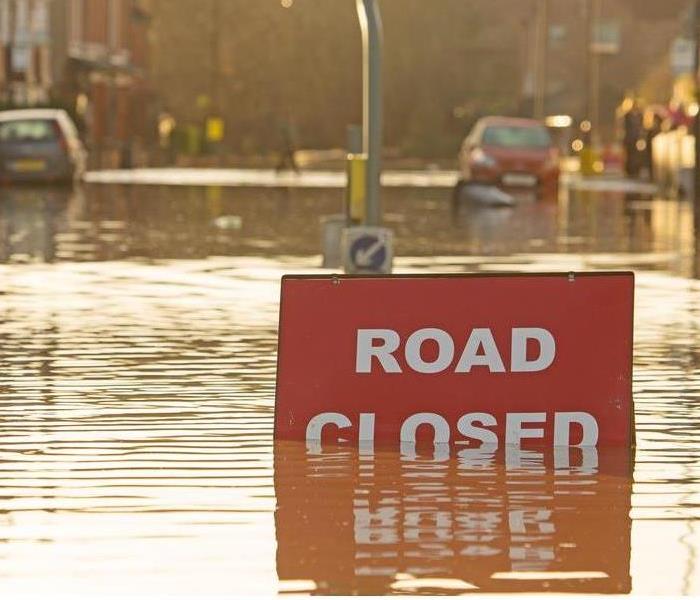 Water is essential to life; however, it is also extremely powerful.
Water is essential to life; however, it is also extremely powerful.
Water is essential to life; however, it is also extremely powerful. When a storm strikes, should you file a claim for flood damage or water damage? Insurance companies do not treat these claims equally. There are a few common sources of water damage:
Broken pipes
Damaged washing machines
Busted water mains
Clogged drains
On the other hand, flash floods can also cause significant damage to a warehouse or office building. What determines the type of claim you should file? There are a few major differences between the claims that you should note.
Flood Definition
A flood is defined by the Federal Emergency Management Agency as a temporary condition that causes partial or complete inundation of at least two acres of land that is typically dry. For example, floods can be caused by an overflow of tidal or inland waters. Other floods might be caused by the collapse of land that sits near the shore. Finally, severe storm damage can also result from a flood.
If your building in Whitemarsh, PA, has suffered damage from any of the sources described above, you are probably dealing with flood damage. Therefore, you should file a flood claim.
Water Damage Definition
The difference between typical water claims and damage due to flooding is dependent on where the water originates. Routine water damage comes from inside the building. This includes ruptured pipes, overflowing toilets, and broken washing machines. On the other hand, flood claims tend to start outside the home. They generally impact two or more properties. Therefore, if you are the only one calling emergency restoration services in Whitemarsh, PA, you are probably dealing with a standard water claim.
Flood Protection
Flood damage can be severe no matter where the issue is located. Therefore, it is important for you to know who to call in the event of an emergency, so you can return to business as normal as quickly as possible.
How To Dry Out a Flooded Basement
2/29/2020 (Permalink)
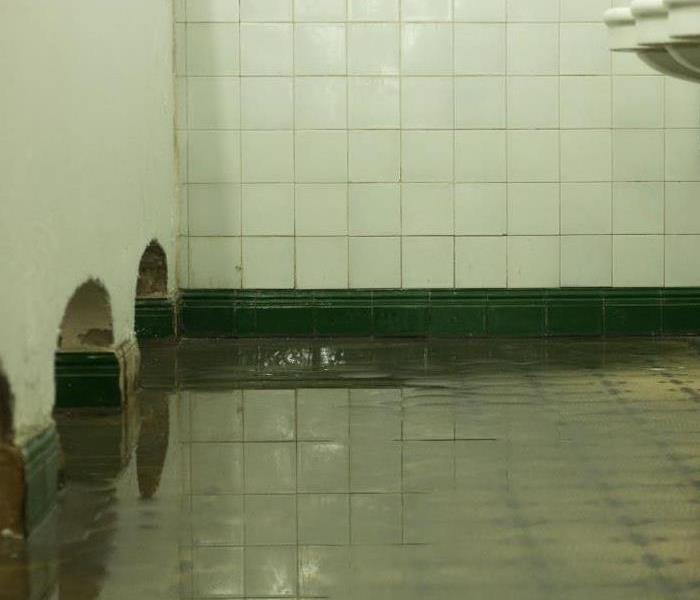 A basement flood can be an inconvenience.
A basement flood can be an inconvenience.
Because they are located underground, basements are prone to flooding. Many homeowners install sump pumps to help remove excess water, but if you have a major basement flood, you may need to follow these steps to dry it out.
1. Take Safety Precautions
Standing water in a flooded basement can be an electrocution danger, so one of the first things you should do is shut off the electrical power to your basement. Floodwaters can sometimes be contaminated by sewage and other toxic materials. You may wish to contact a professional flood remediation company in Whitemarsh, PA, that will have access to the proper protective gear and training needed to remove contaminated water.
2. Locate the Source of the Water
If your basement flood has been caused by floodwaters, you will likely need to wait for floodwaters to recede before attempting to remove the water. If the water is coming from somewhere inside your homes, such as a burst pipe or an overflowing toilet, you will need to shut off the water before you can begin drying your basement out.
3. Remove the Water
Before you do any work, you may want to take photographs of the damage, so that you will have them in case you need to use your flood insurance coverage. You may be able to clean up a smaller flood with a wet/dry vacuum. For larger floods, you will likely need to use a submersible pump. Gas-powered pumps should be avoided, due to the risk of fumes.
A basement flood can be an inconvenience, but if you follow the proper steps you can dry it out and reduce the amount of potential damage to your property. Depending upon the level of severity of the flooding, you may be able to do the work yourself, but for more severe floods it can be a good idea to hire a professional.
Smoke Odor Can Be Eliminated Following a Home Fire
2/28/2020 (Permalink)
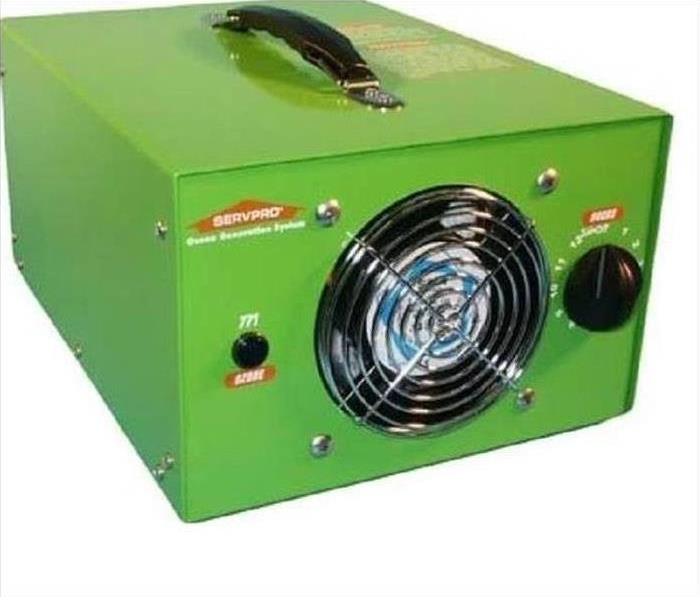 As ozone is released and circulates through a room, smoke residue is oxidized and eliminated
As ozone is released and circulates through a room, smoke residue is oxidized and eliminated
The residual effects of a house fire; scorched, burned, or melted items and the extensive damage caused by the water used to extinguish the fire are painful reminders of a devastating experience. Things can be thrown out, cleaned up or replaced, but a smoke odor can hang on and on as a reminder of what was lost. That is why a thorough smoke cleaning procedure needs to be done if a fire occurs in your Plymouth Meeting, PA home.
How is Smoke Cleaning Done?
The smoky odor of a fire can range from a smell similar to a cigarette to a putrid and foul penetrating smell – even in an item that was never touched by the fire. For this reason, there are processes that can be performed that can help remove the odors. The following are some explanatory terms that may help you understand what needs to be done.
Air filtration devices – This type of device uses a fine mesh filter to remove most of the bacteria and other particles 0.3 microns and larger, including smoke, from room air
Ozone machines – As ozone is released and circulates through a room, smoke residue is oxidized and eliminated
Thermal foggers – A deodorizing solution is blown it into a room, forcing it into even the tiniest cracks and crevices, bonding the solution to the smoke molecules and eliminating the odor
Who Can Do the Deodorizing?
The professionals at fire damage and smoke odor removal service in Plymouth Meeting, PA, would be your best chance of totally removing smoke damage following a fire. They would have access to all of the methods mentioned above and be able to safely use them. This type of service could also help with the cleanup of greasy and bacteria laden soot, which also causes odors.
Smells bring back memories throughout your life, but a house fire is not something you want continuous reminders of. Smoke cleaning can help by completely ridding the premises of the acrid smells and allowing you to enjoy your home again.
The 3 Ps of Fire Preparation
2/27/2020 (Permalink)
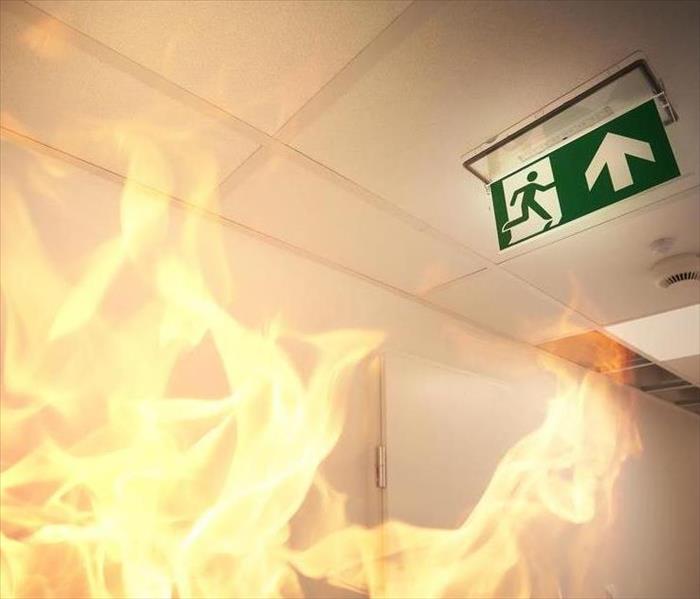 Any business fire can be scary but being prepared can help the situation remain calm and keep people safe.
Any business fire can be scary but being prepared can help the situation remain calm and keep people safe.
Business owners in Whitemarsh, PA, understand the importance of being prepared for anything. While one hopes a storm or business fire won’t cause damage, the unthinkable can happen. Even if the worst doesn’t happen, it’s important to have strategies in place that cover the three Ps to ensure everyone is safe and minimal asset damage happens: Prevent, Plan and Protect.
Prevent
The best way to avoid a business fire is to take preventive measures that reduce the chances of one happening. General fire preparation tips include:
Use only one power cord per outlet that is away from a heat or water source. Ensure any three-pronged plugs are not broken.
Extension cord use should be limited and a short-term solution.
Inspect regularly used tools and equipment that use electricity. Any damage reduces the integrity of the item.
Keep equipment clean to ensure proper airflow and heat dissipation.
Ensure any equipment used is rated for the wattage available.
Verify fuses are the correct size and properly inserted.
Regularly check outlets for excessive heat. If one seems hotter than normal, it could indicate a wiring issue.
Plan
Fire damage can be arduous to cleanup. Developing a fire plan can help the process go more smoothly for restoration professionals. The first step is assessing the risk. A fire department representative can be contacted for a risk assessment. The next step is to ensure protective equipment is available and operational. If the building has a sprinkler system, keep it maintained and have it inspected annually. Ensure the facility has ample smoke detectors and fire extinguishers, and check them regularly.
Protect
If a business fire breaks out, you are responsible for ensuring everyone’s safety. Develop an emergency plan and communicate it clearly with employees, customers, and vendors. Consider appointing someone as a safety officer to ensure a smooth evacuation in case of a fire. Ensure emergency and first aid kits are easily accessible.
Any business fire can be scary but being prepared can help the situation remain calm and keep people safe.
How Does Business Interruption Insurance Help You After a Fire?
2/26/2020 (Permalink)
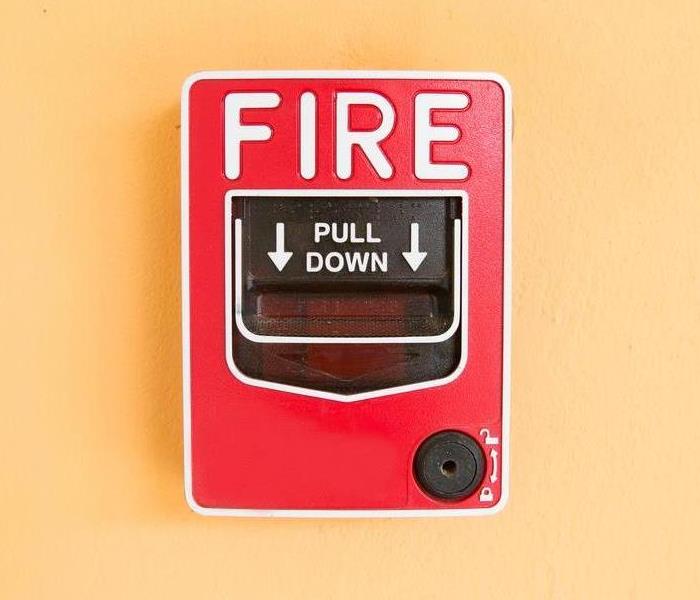 After a business fire, making a strong comeback is crucial to your company’s success.
After a business fire, making a strong comeback is crucial to your company’s success.
A fire can have a devastating impact on your Whitemarsh, PA, business. While you’re going through the recovery process and figuring out the next steps, it’s crucial to ensure that your business is properly protected. Business interruption insurance helps to cover the damage caused by the fire incident and protects your company from severe financial loss. Here are the most significant ways in which interruption insurance keeps your business safe after a fire.
Keeping Your Business Running
When you’re insured, you can continue to keep your business running even as you recover from fire damage. After a business fire occurs, your company will likely have to relocate temporarily due to unsafe conditions. Normally, this would be a major setback for your company; however, an interruption insurance policy can cover all of your lost income and revenue. When you do relocate, you may have to face a number of expenses, such as the following:
Moving expenses
Rent costs
Staffing costs
Real estate fees
In addition to the costs that are associated with moving, there may be several hidden expenses. For example, electricity bills must still be paid even while business activities are put on hold. With business interruption insurance, you don’t have to worry about paying for these operating expenses.
Giving You Peace of Mind
Dealing with a fire is an overwhelming experience. Worrying about expenses and lost revenue can only add more stress to the situation. By finding the insurance policy that is perfectly tailored to your needs, you can have peace of mind during a difficult period. Keep in mind that not all coverage is created equal, so look for the specific policy that addresses your unique goals.
After a business fire, making a strong comeback is crucial to your company’s success. You can allow your business to thrive after a disaster by contacting fire damage restoration experts for a fire cleaning and investing in the proper business interruption insurance.
Cleaning and Restoring Your Home After a Flood
2/20/2020 (Permalink)
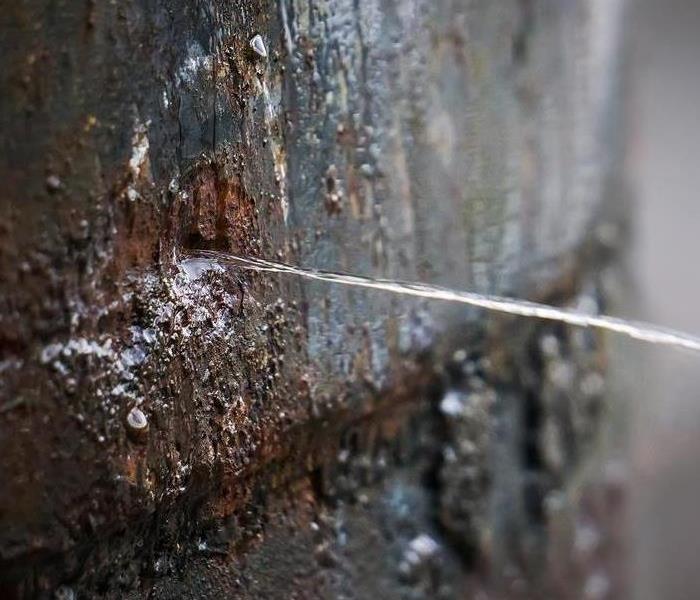 Whether because of a pipe burst, sewer issue or bad weather, floods can find their way into your house.
Whether because of a pipe burst, sewer issue or bad weather, floods can find their way into your house.
Conscientious, responsible homeowners can take measures to protect their property from disaster. Flooding is one of the most common emergency issues people in Whitemarsh, PA, deal with. However, sometimes, despite your best efforts, something such as a pipe burst or sewer backup could occur. To clean up water damage in your house, a proactive approach is necessary.
Leading Causes of House Floods
The more you understand about how a flood may start in your home, the more effective preparation you can make to prevent these problems. Some of the most common reasons for water damage include the following:
Leaky or broken pipes
Overflowing toilet
Sewer backup
Heavy rains
Broken water line
Get It Out
As soon as you notice water in your home, try to identify the source of the flood, turn off the electricity and evacuate. Once you contact an experienced flood cleanup company, you can let the pros take over. A specialist will begin by inspecting the area and coming up with the cleanup plan. The team will extract all water from the house, including anything on the floor, on walls and on furniture.
Dry the Area
A pipe burst can expel a lot of water onto your floors. After removing the water, the technicians will thoroughly dry any wet spots. The team will use dehumidifiers and heavy-duty fans to make sure no moisture was left behind.
Time To Sanitize
Getting rid of water and drying everything isn't enough. The crew will use powerful chemicals and other cleaning agents to disinfect the affected spots. This will discourage the growth of mold and other fungi.
Restoration
Before leaving your home, the flood cleanup company will replace any items crew members had to tear out, such as drywall and carpet. The company will work hard to make your home look even better than it did before the flood.
Whether because of a pipe burst, sewer issue or bad weather, floods can find their way into your house. Luckily, the professionals have effective methods to take care of even the worst water damage.
What Insurance Coverage Pays for Damage in an Apartment Fire
2/18/2020 (Permalink)
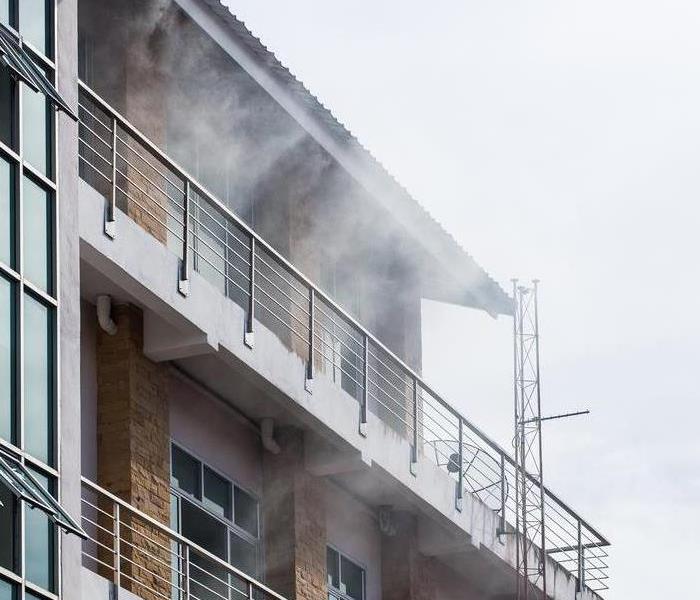 Make sure you review your insurance policy today. Your commercial coverage should come to your rescue if you have an apartment fire.
Make sure you review your insurance policy today. Your commercial coverage should come to your rescue if you have an apartment fire.
If you own an apartment complex in Whitemarsh, PA, it's important to have the right insurance coverage. Just like you would do with your own home, you want to protect your business assets. If an apartment fire damages one or more units, commercial property insurance will pay for your losses. However, your tenants should consider renters' insurance to cover their belongings.
What Property Insurance Takes Care Of
Your commercial property insurance will cover losses due to an accident, theft, vandalism or an apartment fire. The insurance will pay to repair or replace the following (among other items):
Building materials
The roof
Burst pipes
Appliances
Heating and air conditioning system
Limitations
While this insurance will pay for items lost to fire damage, your policy will be void if damage occurs due to your neglect. For example, if you fail to properly maintain systems, components and areas of the building, the insurance will deny your claim. Also, intentionally causing damage such as a fire will not cover your losses (in fact, this could land you in jail).
Contents in Apartments
While apartment fire damage will fall under your commercial property coverage, tenants' belongings will not have this same coverage. People who seek payment for these losses should purchase renters' insurance. These plans will cover items such as furniture, jewelry, books, keepsakes, and other personal belongings. Renters should be prepared to provide a list of what items were lost or damaged. They will also need to estimate dollar-amount losses. An adjuster will verify the claim before the insurance company issues a payment. As the property owner, you are not responsible for paying for these damages. Similarly, you will not have to pay a content cleaning specialist to clean anyone's personal items.
Make sure you review your insurance policy today. Your commercial coverage should come to your rescue if you have an apartment fire.
What You Need To Know About Sewer Cleanup (Just in Case)
2/18/2020 (Permalink)
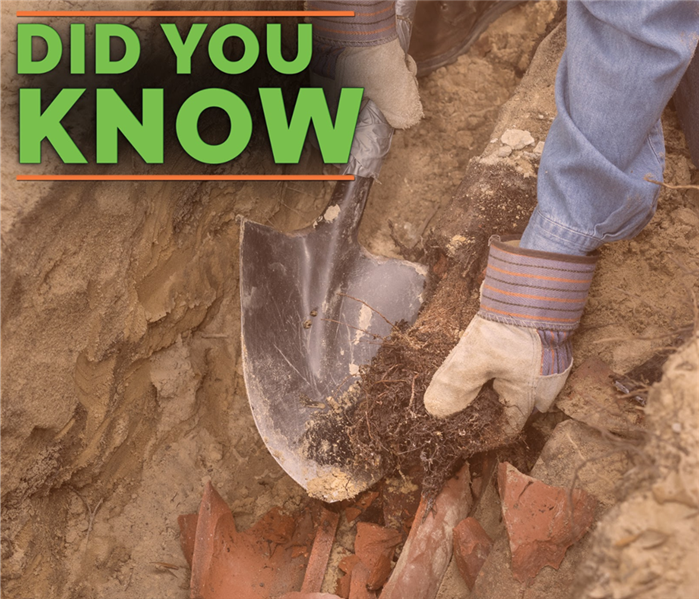 Tree roots are a common villain
Tree roots are a common villain
Here's What You Need To Know About Sewer Cleanup In Your Home
Without warning, a sewer backup can mire your Cheltenham, PA residence in foul-smelling, highly damaging, raw sewage. A flooded toilet can soak floors, walls and possessions with water, if not something worse. With any luck, you'll never have to deal with these headaches, but knowledge is power. Here's what you need to know about sewer cleanup in your home – just in case.
Damage Control
Recovery involves more than pumping out the nasty stuff. Full restoration may include steps such as the following:
- Salvaging damaged possessions
- Repairing areas where mold might grow
- Steam cleaning upholstery or carpets
- Clearing the air with special equipment
The Root of the Problem
Sewer backup is caused by blockage. This can happen anywhere along the pipes that carry sewage away from your home. Tree roots are a common villain. Thirsty roots find their way through tiny cracks or joints in the sewer pipes. In this environment, root systems grow quickly. They can dam the flow of sewage, or even completely clog a sewer pipe.
The obstruction might not be on your property. A hidden problem down the alley or across the street might back the sewage up until it spills out in your basement. A toilet overflow can also be caused by a malfunction in the toilet or the plumbing system.
Coverage Concerns
A thorough sewer cleanup can be a major expense. Not all homeowners or renters insurance policies cover damage from sewer backup or toilet overflow. Some insurance companies charge an additional premium for this service. Your insurance agent may be able to recommend a restoration company that is Faster to Any Size Disaster. Due to the nature of the problem, enlisting experienced pros is often the only completely safe way to handle black water.
Getting Back to Normal
Dealing with sewer cleanup can be a traumatizing event. Knowing ahead of time what you need to do to restore your home quickly and safely can remove a great deal of stress from the process.
The Responsibilities of a Landlord After a Fire
2/15/2020 (Permalink)
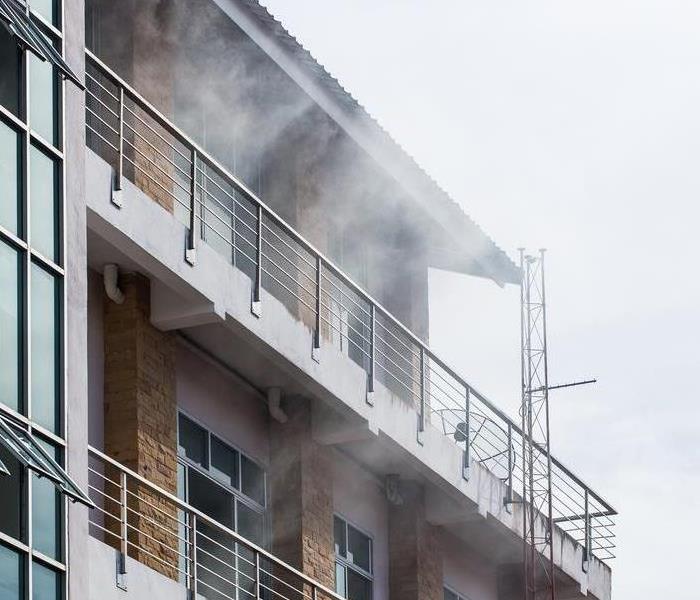 Whenever property you own is damaged, you are likely responsible for the repairs.
Whenever property you own is damaged, you are likely responsible for the repairs.
When other people rent out your commercial property in Whitemarsh, PA, you don't always have a lot of control over the fire prevention or safety measures that your tenants take. As the building owner, though, you do have a few responsibilities after an apartment fire. Use the following checklist to ensure that you're doing everything you can to get your building back in order and safeguard your tenants.
File an Insurance Claim
Your tenants are responsible for their own possessions, but you have an obligation for the upkeep of the property itself. This includes several elements:
Building and entrances
Electrical and plumbing repair
Grounds and landscaping
You should have insurance coverage for any fire damage that occurs to the property you own. Your policy can pay for the services of the fire restoration company you hire to make your building inhabitable again. It may also cover any secondary damage that is directly related to the original covered issue.
Communicate With Tenants
The tenants that are affected by the apartment fire may have a lot of questions. Include them as often as possible in the restoration process. If the fire caused a lot of damage in their unit, consider allowing them to accompany you on a walk-through with the restoration team. You can discuss what repairs are needed and how long you expect them to take as well as the measures you are taking to make sure the unit is secure while it is under reconstruction. If possible, refer them to temporary housing if they are unable to stay in the building. Stay in contact and keep you informed on the progress of the repairs.
Whenever property you own is damaged, you are likely responsible for the repairs. It is also helpful to maintain a good relationship with the affected tenants during the restoration process. Staying on top of all your responsibilities as a landlord can help make this process go more smoothly.
Types of Water Damage To Expect After a Fire
2/10/2020 (Permalink)
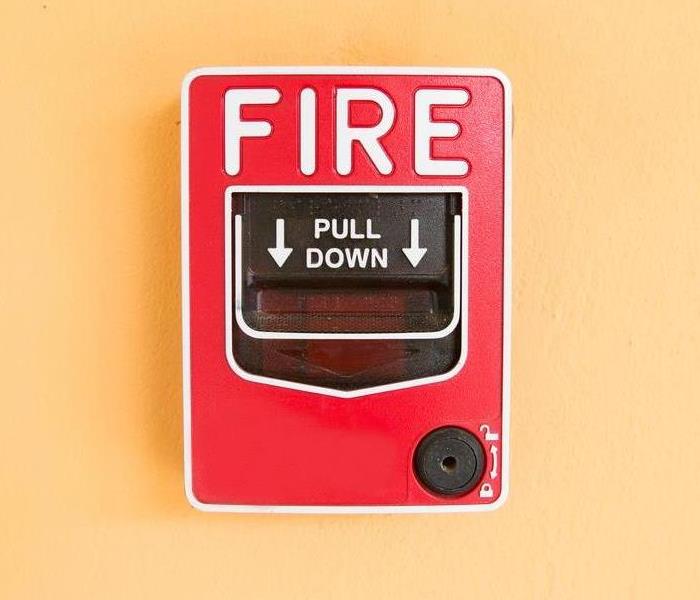 A professional can perform everything from a smoke cleanup to a mold inspection to bring your business back to normal.
A professional can perform everything from a smoke cleanup to a mold inspection to bring your business back to normal.
When your business in Whitemarsh, PA, is impacted by a fire, it will inevitably lead to various types of damage. In addition to the fire and smoke damage, a fire in your business can cause certain forms of water damage. This type of harm typically occurs as a result of firefighting efforts as well as sprinkler activation. No matter how the water damage has affected your business, it’s important to be prepared to address the issue appropriately. Here are the most common types of damage to expect during the water cleanup process.
Damaged Wood
Wood is highly vulnerable to water damage, which means it’s crucial to inspect any wooden surfaces in your business after the fire has been put out. The following types of wooden materials should be examined as soon as possible:
Floors
Desks
Doors
Chairs
Cabinets
Depending on the state of the furniture, you may be able to salvage the damaged wood. However, it’s best to call a professional and have him or her assess the condition of the wood.
Damaged Ceiling
After you’ve checked the wood furniture in your building, make sure you inspect your ceiling right away. If your ceiling displays signs of severe water damage, it may begin to collapse. Be sure to have a professional look at your ceiling during water cleanup to determine the level of damage. Certain types of ceilings may need to be replaced completely for the safety of your business.
Mold Growth
While this isn’t a specific type of water damage, any form of harm caused by water buildup may lead to mold growth. Whether you notice signs of mold in your business or not, it’s crucial to schedule a fire cleanup so that an expert can inspect your building for mold. He or she can identify any traces of mold that you may not have noticed.
During the water cleanup process, emergency restoration services eliminate any signs of damage to your commercial building. A professional can perform everything from a smoke cleanup to a mold inspection to bring your business back to normal.
When Is a Basement Flood Covered by Insurance?
2/9/2020 (Permalink)
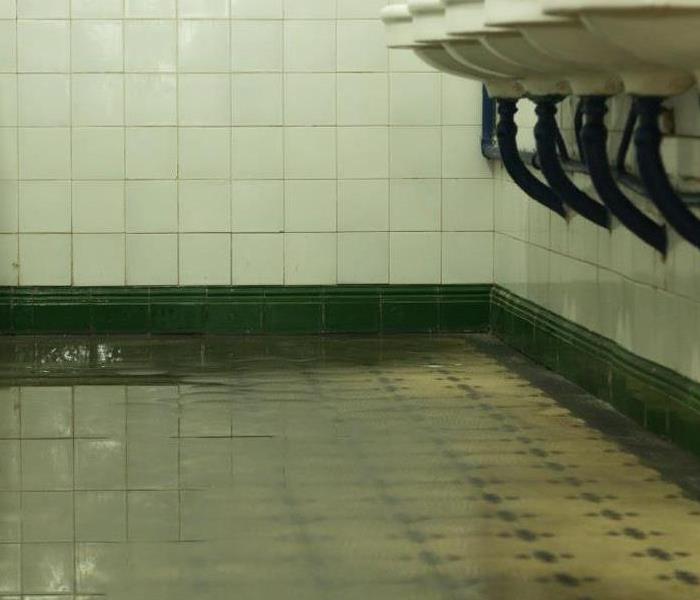 A basement flood may not be covered by your regular insurance policy.
A basement flood may not be covered by your regular insurance policy.
There is nothing worse than coming home to a basement flood after a long day. You may look at all the damage to your Whitemarsh, PA, house and wonder how you are going to pay for repairs.
Your insurance provider can help. However, a flooded basement is not always covered by insurance. Specifically, your insurer won't pay for repairs caused by any of the following:
Flooding
Unresolved maintenance
Outside drain or sewer
What Is Not Covered
If the provider determines that the flood resulted from a leak that you failed to address, your insurance claim will be denied. A homeowner's policy does not cover floods caused by over-saturation, surging bodies of water or major storms, either. The policy also won't pay for damages that result from water backing up into the basement through an outside sewer or drain.
However, you can purchase separate flood insurance from the National Flood Insurance Program. You can also buy sewer coverage as part of your homeowner's policy.
Your insurer won't cover the cause of the basement flood, either. If a washing machine or pipe leak led to the water damage, you will have to pay to repair or replace that item yourself.
What Is Covered
Homeowners insurance typically will pay for water damage to a home that results from an accidental or sudden event. Your policy likely contains both dwelling and personal property insurance coverage. Dwelling coverage deals with damage to the structure of your home, such as the walls and roof. Personal property coverage, meanwhile, pays for repairs to your belongings.
Your insurance may not reimburse you for everything, though. You likely have a deductible that you have to reach before the insurance money comes. Your policy may also have limits.
A basement flood may not be covered by your regular insurance policy. However, if you get additional flood insurance, you should get reimbursement from your provider. You can then use this money to pay for water damage repair services.
The ins and outs of Commercial Storm Insurance
2/3/2020 (Permalink)
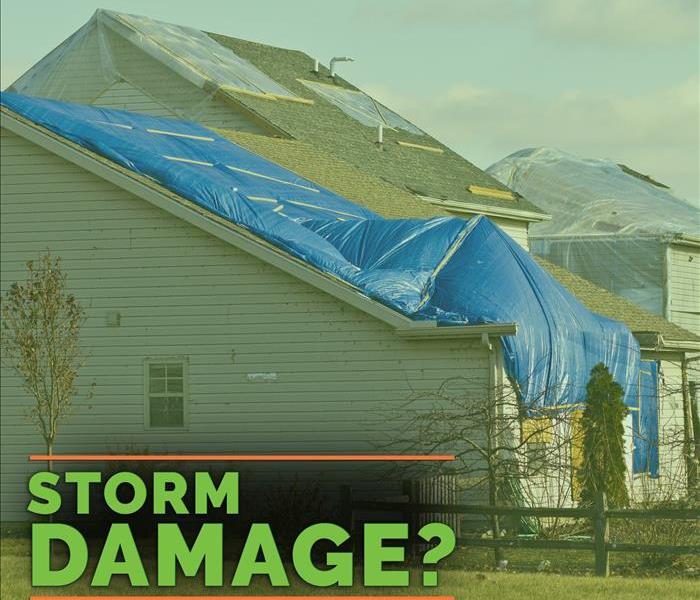 Examine your business and determine whether it makes sense to purchase storm insurance.
Examine your business and determine whether it makes sense to purchase storm insurance.
Any wise business owner understands the importance of having insurance coverage. However, some people in this position forget about commercial storm insurance. If your company operates in an area in Whitemarsh, PA, where floods and other severe are common, it's important to protect your business and your employees. Before you speak with an agent and purchase a policy, it's helpful to understand how it works, what it covers and what it doesn't cover.
Why Get It?
Some people may wonder why they should spend the money to purchase this insurance coverage. After all, isn't commercial property insurance enough? This policy gives you financial protection in the following ways:
It can replace items and equipment you lost in a storm.
It can replace building materials and structural components lost in a storm.
It can compensate your business for the cessation of operations.
What Traditional Property Insurance Covers
Property insurance is important because it protects your business from having to pay to repair damage sustained by accidents or vandalism. For example, if heavy winds or torrential rain ruins windows or siding, the property coverage should take effect. Unexpected failures from appliances, systems and the building structure should also fall within this coverage.
When Storm Insurance Steps In
Regular property insurance plans won't cover damage from large storms such as hurricanes and tornadoes. Also, if a sewer backup or overflowing river brings water into your building, your property insurance policy won't pay for a flood remediation specialist to do the cleanup. However, supplemental storm coverage will protect your business when these incidents occur.
When There's No Coverage
If there is damage in your building because you failed to maintain the plumbing, roof or HVAC systems, neither insurance coverage will accept your claim. Also, if you deliberately cause a flood or other damage to the building, you will not get any insurance help.
Examine your business and determine whether it makes sense to purchase storm insurance. You can find a plan that suits your needs.
How Frozen Pipes Create Water Damage In Your Business
1/31/2020 (Permalink)
 Your business is vulnerable to not just obvious winter hazards, but also water damage caused by frozen pipes
Your business is vulnerable to not just obvious winter hazards, but also water damage caused by frozen pipes
The winter season brings many obstacles and hazards to your business, from slippery ice to heavy snow accumulation. A more unexpected danger involves water damage caused by pipes bursting and leaking their contents. These pipes usually break because they freeze after exposure to cold temperatures. Continue reading to learn more about what happens after pipes freeze, how to handle damage and preventing future frozen pipes.
Consequences of Frozen Pipes
When the water inside pipes freezes and expands, it creates high pressure that tries to escape in all directions. The pressure is strong enough to damage the pipes as it leaves. The frozen water can later melt and leak from the broken pipes to the rest of the Cheltenham, PA, building. This high amount of water can damage your property, slow down productivity and drive away clients. Ultimately, you will have to deal with the costs caused by frozen pipes.
Dealing With Damage from Burst Pipes
Once you detect the signs of water damage, such as weakened structures and mold stains, it is time to take action. Follow these steps to minimize the impact and save your establishment.
Observe the affected area and disable any potential hazards, if possible
Turn off the main water valve and turn on faucets to drain remaining water
Place buckets and containers to collect leaking water
Contact a plumber for repairs and an emergency remediation company for water cleanup
Fast action and preparation can mitigate damage and save money. Keep a contact list of important services at hand.
Preventing Frozen Pipes
The best way to handle winter damage is by preventing it. There are several measures you can enact to keep the pipes from freezing. Have your building inspected for openings that can leak cold air and seal them. During the warmer seasons, insulate the pipes to prevent exposure to freezing temperatures. Finally, let your faucets drip warm water to prevent internal freezing.
Your business is vulnerable to not just obvious winter hazards, but also water damage caused by frozen pipes. You can reduce this loss and even prevent it by learning more about it.
Making Sure You Are Covered for a Commercial Flood
1/29/2020 (Permalink)
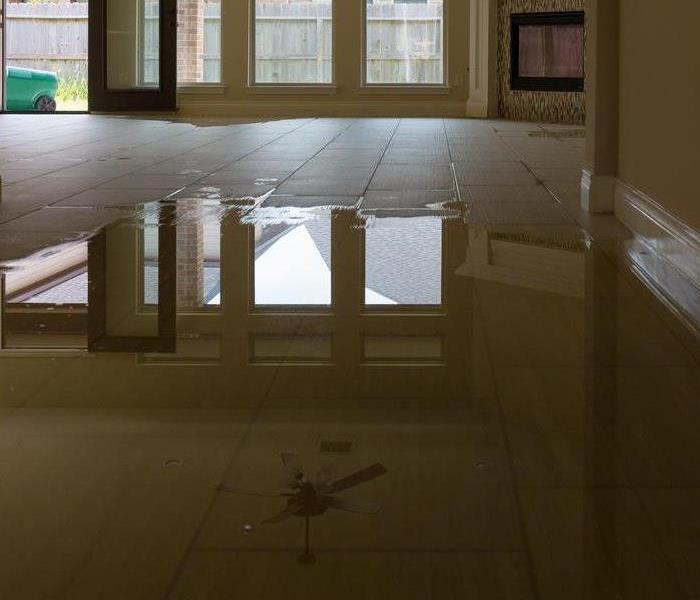 Flood damage is often quite costly, and it’s important to understand your coverage options for various scenarios.
Flood damage is often quite costly, and it’s important to understand your coverage options for various scenarios.
Weather events that cause flooding are occurring with increasing frequency. If your Whitemarsh, PA, location is at risk for flooding or your property has been water damaged, this discussion about commercial insurance coverage may answer some of your questions. Will your business insurance cover flood cleanup and restoration at your commercial facility? The answer is, it depends. Most types of commercial flood damage are excluded from your conventional insurance policy but would be covered under a special flood insurance policy.
Government-Issued Insurance
Commercial flood policies are purchased separately from the government’s insurance program. The source of the flooding determines which type of coverage applies. If any of the following caused your business to flood, a government insurance policy would generally cover you:
Overflowing rivers or streams
Blocked storm drainage systems
Storm surge from hurricanes, severe storms or snowmelt
Broken dams or levees
Broken municipal water mains
You may be required to purchase a government-issued policy if your property is in a high flood-risk area. Your insurance agent will generally be able to help you evaluate and purchase flood insurance.
Commercial Insurance
Storm-related water damage will be covered by your conventional insurance policy if the damage came from above ground level. For instance, if hail or a tree branch breaks your skylight and heavy rain causes damage to your property, your commercial policy would be responsible. Most types of internal water damage, such as broken pipes and leaking appliances, would also be eligible for coverage by your business policy.
Flood Risk
Even if your property is not in a designated high-risk flood area, you could still bear some flood risk and benefit from purchasing flood coverage. If you are located in an area known for heavy snowmelt or significant rainstorms, you bear some risk. Water can back up behind a clogged storm drain and quickly lead to rising floodwaters.
Flood damage is often quite costly, and it’s important to understand your coverage options for various scenarios. Then you can decide whether to pursue government-issued insurance, rely on your commercial insurance policy, or purchase additional flood insurance.
How the Pros Clean up After Large Disasters
1/22/2020 (Permalink)
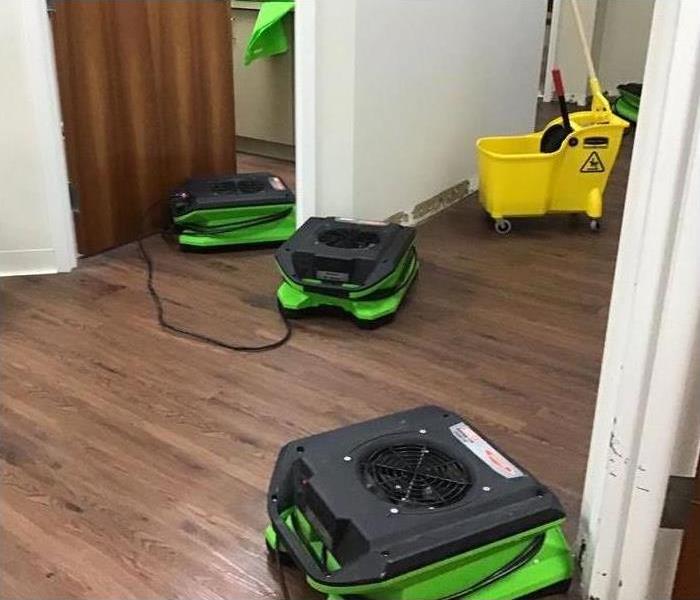 Cleaning up after storm damage in Cheltenham, PA
Cleaning up after storm damage in Cheltenham, PA
Just about every business owner in Cheltenham, PA, will face some sort of cleanup issue in their building at some point. Most of the time, you can handle the job without much difficulty or interruption to your day-to-day operations. What happens in the aftermath of a catastrophic loss such as a flood, fire, earthquake, hurricane or tornado? The rebuilding process would be overwhelming to any individual or company. Fortunately, experienced professionals have the knowledge and skill to handle even the worst disasters.
What the Pros Can Offer
Emergency cleanup specialists are equipped to help restore your business after the most terrible incidents. From storm damage to other acts of nature that destroy building materials, office equipment or personal belongs, the professionals have the expertise you can rely on to salvage your office and make your workplace safe once more. Professional cleanup teams will:
- Assess the extent of the damage and make a cleanup and restoration plan.
- Remove damaged materials and replace them.
- Clean and sanitize affected areas.
Anytime Service
Flooding, fires or other incidents can occur at any time, any day of the week. No matter when you discover such an emergency, you'll need prompt help. The best disaster cleanup teams will be to your office within a few hours of your call. This will be the case whether you call late at night, on the weekend or holidays.
Combining Forces
For the biggest emergencies that cause widespread catastrophic loss, disaster relief companies can mobilize their forces to offer the most efficient help possible. When an emergency affects a large area, companies will send teams from multiple areas to the location. This helps ensure a more comprehensive response. You can have the peace of mind you need to know the right resources will come to your aid.
In the wake of an emergency, you will feel a great deal of stress and anxiety. Fortunately, professional cleanup and restoration crews can ease your mind and rebuild even after a catastrophic loss.
How To Deal with Leaking Bathroom Supply Lines
1/20/2020 (Permalink)
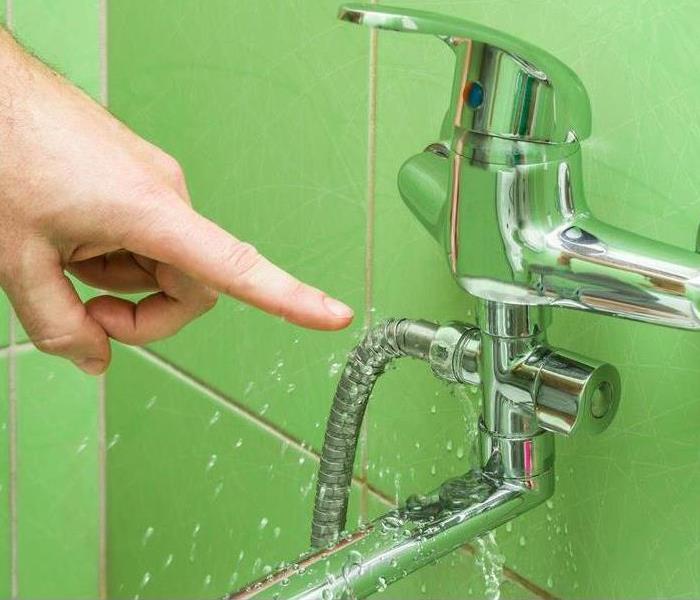 Knowing when to change your supply lines can keep you from dealing with costly leaks.
Knowing when to change your supply lines can keep you from dealing with costly leaks.
The supply lines in your home play the important job of providing water to fixtures and appliances such as sinks, washing machines, or toilets. One of the main causes of a bathroom leak is supply line damage, which can often be prevented by replacing broken lines before they cause water damage. Use this guide if you are running into issues with your bathroom’s water supply lines or plan on replacing them soon.
Replacing Supply Lines
If you notice a supply line leak, you should immediately have the affected supply lines replaced. Problems to look out for include:
Pooling water
Dripping on walls
Rust
Corroded piping
Punctures or cracking
You should also replace supply lines if you are making renovations and installing a new faucet or toilet or if your supply lines are old and outdated.
Addressing Water Damage
It is not uncommon for large leaks to happen unexpectedly and result in extensive water damage. If this happens to you, turn off your water supply and contact a water damage restoration company in Whitemarsh, PA, right away to avoid any further issues.
Choosing New Supply Lines
There are several different materials to choose from when buying new supply lines including plastic, copper, and braided stainless steel. While plastic is often the cheapest choice, it is the most prone to supply line damage. Copper is a more durable material, but you will need to watch out for signs of electrolysis, or galvanic metal corrosion. Many people opt for braided steel supply lines, which are considered a more durable choice and often have a lifetime warranty. However, even these types of supply lines can run into issues and should be examined for signs of deterioration or leaking.
Knowing when to change your supply lines can keep you from dealing with costly leaks. Always contact a professional if you are unsure which type of material is best for your needs or need help identifying common signs of supply line damage.
How To Remove Mold From Air Conditioner Ducts
1/14/2020 (Permalink)
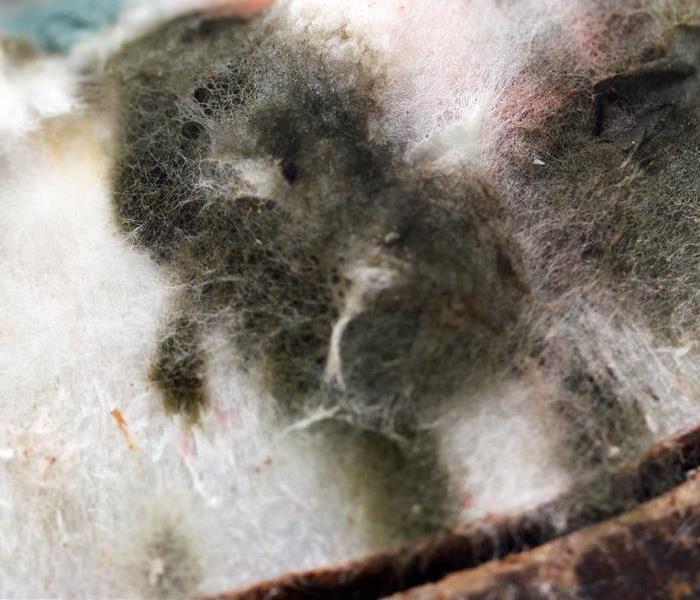 Black mold can be easily identified by a professional.
Black mold can be easily identified by a professional.
As a business owner, it can be shocking to find out that you have black mold circulating throughout your building. However, when addressed appropriately, the situation can often be remedied rather quickly. If you suspect mold in Whitemarsh, PA, there are several steps you can take to ensure the mold is removed from your premises as quickly as possible.
1. Determine if There Is a Problem
If it feels more like springtime allergies inside your office than out in the fresh air, you may have a mold problem. A musky odor is also a sign that mold is lurking somewhere in your building. If you suspect mold, you will need to hire a certified mold expert to assess the situation and give you a definitive answer.
2. Examine the Extent of the Damage
If mold is found inside your air ducts, you will need to check to see if it has spread further. A common place for mold to attack next is the insulation around the ventilation system. You, or the mold inspector, can check this area by gently pulling back on the insulation. If mold is discovered, the material will likely need to be discarded and replaced.
3. Clean the Mold
Since black mold is an organic substance, it will take special products to kill it. The ducts will need to be thoroughly cleaned and some materials may need to be replaced.
4. Remove the Source
If it has not already been identified, the source of the mold will need to be determined. Start by looking for places that gather moisture, such as in bathrooms and around water coolers. Roofs are another common problem area.
Black mold can be easily identified by a professional. If it is found, your best course of action is to hire an expert mold remediation company to safely clean ducts and identify the cause of the problem.
Mold Prevention Measures Must Include the Routine Inspection of these 5 Areas
1/9/2020 (Permalink)
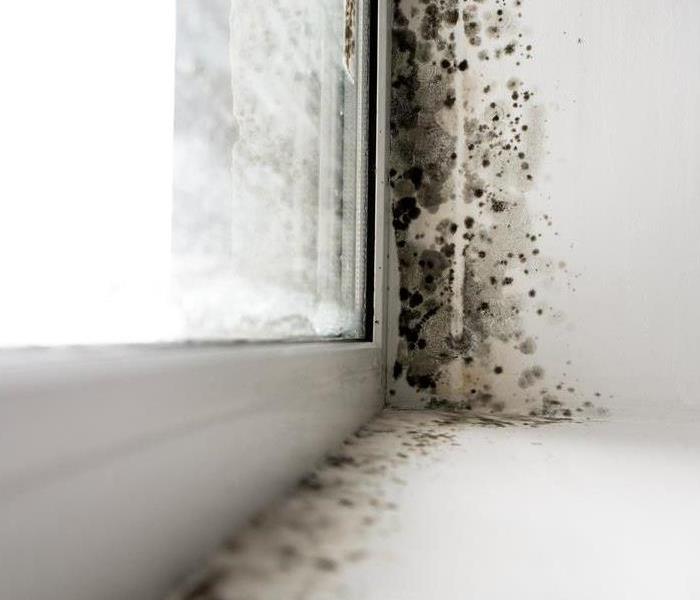 Mold prevention must include routine property inspections, especially of the areas mentioned above.
Mold prevention must include routine property inspections, especially of the areas mentioned above.
Mold prevention is more inclusive than annual facility inspections. If you only walk through your property once per year, then you risk not seeing a potential issue, like water damage, until it is too late and requires a mold removal business in Whitemarsh, PA. Therefore, to limit your risks, it is essential to perform routine inspections of the following five areas.
Property foundation
Roof
Windows and doors
Plumbing
Appliances
Property Foundation
Many business owners do not consider a leaky foundation as a precursor to mold. However, if water is allowed to enter a facility unabated, then mold growth is always a possible consequence. Therefore, make sure landscaping is graded away from the property and that downspouts and gutters are maintained.
Roof
Do you have an attic or drop ceiling that hides the roof from interior inspection? It is necessary to look for signs of wear and water damage to the roof from both the interior and exterior of your building, especially when the goal is to prevent mold.
Windows and Doors
Another item to pay attention to for mold prevention is the seals around your building's windows and doors. Seals age over time and can crack or become worn and ineffective, meaning every time it rains, your property is a little more vulnerable to mold growth.
Plumbing
If you operate out of a warehouse, then you are lucky because much of your plumbing is visible. However, if your property is more traditional, then leaks and other plumbing issues may not be as obvious, potentially leading to a hidden mold threat.
Appliances
Condensate pipes or appliances tucked into tight nooks are often overlooked during routine visual inspections because they are hidden. Therefore, be sure that visual inspections include thorough checks of equipment and machinery. For example, pull out breakroom fridges and check underneath sinks.
Mold prevention must include routine property inspections, especially of the areas mentioned above. While annual checks are an excellent first step, a lot can happen in a year, so to protect your property, increase walk-throughs and visual inspections.
3 Ways to Determine if Mold is Growing in Your Commercial Building
1/8/2020 (Permalink)
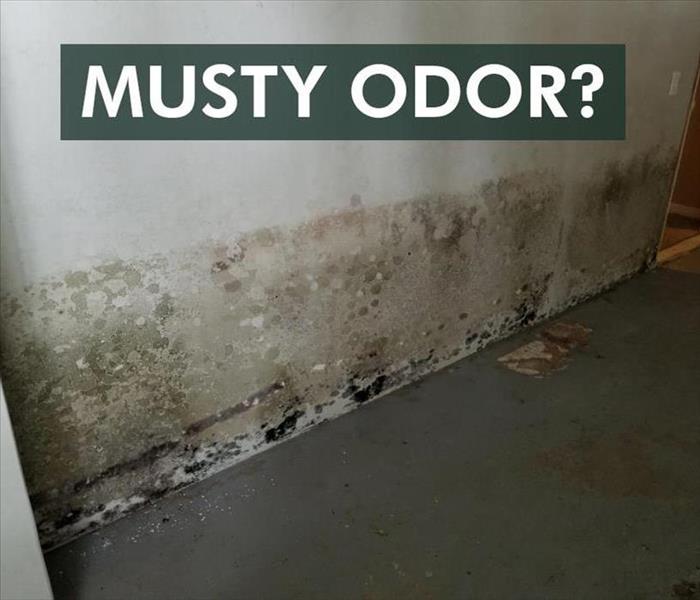 Are you noticing a musty odor in your business?
Are you noticing a musty odor in your business?
Ways To Determine If Mold Is Present In Your Building
Whether it is caused by water damage or high humidity, an excessive amount of moisture can cause mold to grow in your Plymouth Meeting, PA, building. This is a common problem, so if it does occur, there is no need to panic. An indoor environmental specialist can help you remove the fungus and have your business back to normal in no time. Mold isn’t always noticeable right away, but there are a few ways to determine if it is present in your building.
1. Visible Growth
Of course, visible mold growth is the easiest sign to spot. If a large colony has begun to spread, you will often be able to see it. It may show up as discoloration on the walls or ceilings. While black mold may be the first to come to mind, it comes in other colors as well, such as green, orange or white. Some physical signs to look out for include:
- Thread-like appearance
- Slimy or fuzzy texture
- Small spots or clusters of discoloration
2. Musty Odor
While visible mold may be the easiest way to determine growth, it is not always the first sign. In some cases, the fungus might be growing inside the walls or underneath carpeting. When this happens, you might smell the mold before you see it. If you notice a musty or earthy odor, a mold test may be needed.
3. Building Inspection
If you believe there may be mold in your building, the best way to find out is to have an inspection done by an indoor environmental specialist. He or she will have the necessary training and equipment to locate any excessive growth and then determine the best way to move forward.
If the indoor environmental specialist has determined that mold is present, you will need to have the building cleaned and restored. A mold remediation company can do this for you. These professionals will be able to thoroughly remove the growth safely and sanitize the area to help keep it from returning. They will also be able to make any necessary repairs to the building and affected items.
How Commercial Property Managers Should Prepare for Storms
12/23/2019 (Permalink)
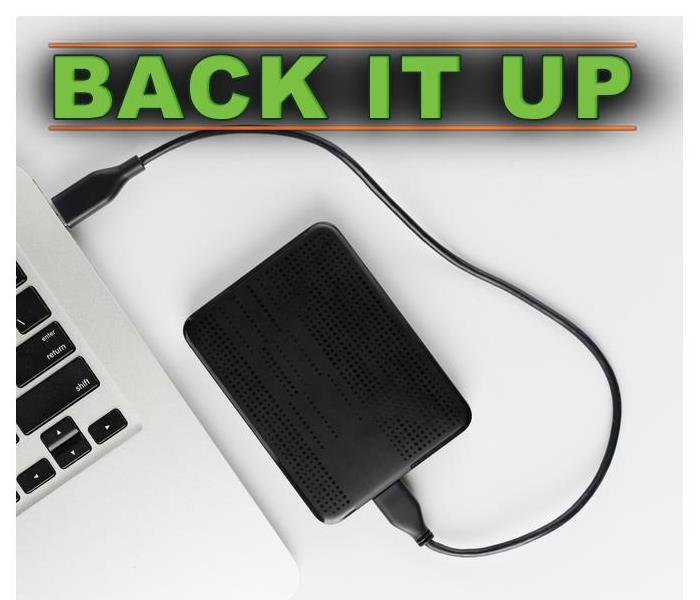 Back up any property files in the cloud
Back up any property files in the cloud
Proper property management is especially important during an emergency. If you are a commercial property manager, you should take the below steps as part of a storm preparedness plan.
Keep an Emergency Contact List
Property managers need to make sure everyone in the building is accounted for following a disaster. You should thus keep an emergency contact list that includes:
- The names of the workers in each office
- The email addresses of these workers
- The cell and office phone numbers of the workers
- The names of employees with special needs who might need assistance during an evacuation
You may also want to document the schedules of each worker. That way, you will know who is and is not in the office building at certain times. Be sure to back up the list so it can be accessed remotely if necessary.
Your storm preparedness plan should also include the phone numbers for local police, ambulance and fire services. Put these numbers next to any public address systems, two-way radios and phones in your building.
You should additionally list contact information for your local commercial building restoration services company. This business can help with flood or storm cleanup.
Educate the Staff
Make sure that all of your staff members understand what to do during a storm. In general, engineers, front desk workers and managers should remain on the property as long as possible to keep the building running and assist with evacuation.
Back Up Important Documents
While flood cleanup experts can fix physical storm damage to your property, restoring intellectual property is more difficult. That is why you should back up any property files in the cloud. You can also keep them in a hard drive that is stored in a waterproof and fireproof location.
A disaster can strike your commercial building at any time. However, by making a storm preparedness plan, you can mitigate the flood damage to the property.
Ideal Mold Growth Conditions
1/24/2019 (Permalink)
Although we all hate to admit it, we all have found mold in our showers or on our shower curtain at least once in our life. You may wonder what are the exact conditions that mold needs to grow? Here are the 4 critical requirements mold needs to grow.
What are mold spores? Mold spores are the very tiny reproductive units of mold and fungi and vary in size from 3 to 40 microns. These mold spores are everywhere, both inside buildings and outside as well and it is perfectly normal! That is why there is no true way to eliminate these.
What does mold feed on? Basically any organic substance can be a food source as they contain carbon molecules. The most popular mold food in homes are wood, paper and organic fibers.
Unfortunately for us humans, mold prefers the same temperatures we do! This means that mold growth can occur in many places in a building, even the fridge!
Many of us know mold thrives in moist areas, preferable in places with a relative humidity of 70%. Areas in homes where water can gather or pool will provide an even better place for mold growth.
Content by: http://www.fsec.ucf.edu/en/consumer/buildings/basics/moldgrowth.htm
How to Help Firefighters Help Your Pets
1/24/2019 (Permalink)
If you have a pet, you know the amount of unconditional love you have for them. Here are some precautions you can take to ensure your pet is safe if an emergency does occur.
- Keep pets near entrances when away from home. Keep collars on pets and leashes at the ready in case firefighters need to rescue your pet. When leaving pets home alone, keep them in areas or rooms near entrances where firefighters can easily find them.
- Affix a pet alert window cling and write down the number of pets inside your house and attach the static cling to a front window. This critical information saves rescuers time when locating your pets. Make sure to keep the number of pets listed on them updated.
Content By: https://www.redcross.org/get-help/how-to-prepare-for-emergencies/types-of-emergencies/fire/pet-fire-safety.html
Winter Storm Harper
1/18/2019 (Permalink)
Winter Storm Harper is predicted to pile on snow and ice from Friday well into the weekend to areas that have, up until now, only experienced some mild winter weather, according to Weather.com.
Winter Storm Harper’s trajectory is still uncertain at this point, however, predictions have the storm moving through the central states and into the Northeast, bringing heavy snow to the Plains, New England, Pennsylvania and New York State in particular.
There will also be a small, weak weather system on Wednesday that will bring some rain and light snow to the Midwest and Northwest, according to Weather.com. But after this system clears, Winter Storm Harper will bring much more extreme conditions.
Here’s what to expect, according to Weather.com:
On Thursday, Harper will bring snow into the Rockies, Sierras and Cascades, then spread into the Northern Plains by nighttime. On Friday, the Rockies will continue to have snow, but so will the Plains — possibly even escalating to blizzard conditions.
By Friday night, the lower Great Lakes, Kansas, parts of Oklahoma and the Texas Panhandle may see some snow, or possibly a snow/rain mix, Weather.com reported. Sleet and freezing rain should be expected for northern Missouri and southern Illinois.
On Saturday, the Northeast gets its fair share of the storm. Heavy snow will be falling in some areas of the Plains still, plus the Midwest and Northeast. People in the Midwest should hunker down for possible blizzard conditions, as strong winds may also be present, said Weather.com.
Be sure to keep an eye on your local weather to ensure a safe weekend!
Content by: https://www.travelandleisure.com/travel-news/winter-storm-harper-heavy-snow-northeast
National Blood Donor Month
1/16/2019 (Permalink)
This January, the American Red Cross celebrates National Blood Donor Month and recognizes the lifesaving contribution of blood and platelet donors. As we begin the New Year, the Red Cross encourages individuals to resolve to roll up a sleeve to give this month and throughout 2018.
National Blood Donor Month has been observed in January since 1970 with the goal of increasing blood and platelet donations during winter – one of the most difficult times of year to collect enough blood products to meet patient needs. During the winter months, inclement weather often results in cancelled blood drives, and seasonal illnesses like the flu may cause some donors to become temporarily unable to donate.
Blood donation appointments can be made by downloading the American Red Cross Blood Donor App, visiting redcrossblood.org or calling 1-800-RED CROSS (1-800-733-2767) to make an appointment or to receive more information. All blood types are needed to ensure a reliable supply for patients.
A blood donor card or driver’s license or two other forms of identification are required at check-in. Individuals who are 17 years of age (16 with parental consent in some states), weigh at least 110 pounds and are in generally good health may be eligible to donate blood. High school students and other donors 18 years of age and younger also have to meet certain height and weight requirements.
Content By: https://www.few.org/national-blood-donor-month/
Biohazard Cleanup
1/9/2019 (Permalink)
Do you ever stop to wonder who has to clean up the scene after a chemical spill or a death/suicide accident?
If not, you are probably like most and lucky enough to not have needed to consider this type of work. However, if you fall into the other category, you know very well that a hazardous scene must be left to the professionals to clean.
Blood borne pathogens, disease, risk of infection and chemical burns are a just a few items to consider when dealing with a biohazard clean-up. Luckily, our team is highly trained and well prepared to protect both themselves and you from any potential harm.
Our team also fully understands that these situations are often extremely difficult and sensitive times in a person's life and therefore demonstrate compassion and empathy while completing the work in a timely fashion.
For more information on biohazard clean-up's, please check out the BIO/Hazmat section of our website.
Associated Builders and Contractors
1/9/2019 (Permalink)
Founded in 1950, Associated Builders and Contractors (ABC) is a national construction industry trade association which represents almost 21,000 chapter members. The goal of ABC is to help its chapter members develop, win work and deliver said work in a safe and ethical manner that creates profit for all parties involved. ABC works hard to better the communities in which they and their members live and work. ABC’s primary activities include but are not limited to; government representation, legal advocacy, education, workforce development, communications, technology, and business development. ABC offers endless opportunities for its members to develop professionally, network and get involved through various committees and events.
SERVPRO of Whitemarsh/Cheltenham saw the benefit in joining such a prestigious association and garnered excitement among a few other SERVPRO affiliates and collectively joined as a group. We have representatives from SERVPRO who are apart of the workforce development committee as well as the young professionals committee. We take advantage of utilizing ABC East’s beautiful facilities to host our meetings and in the future, continuing education classes.
The ABC Easter PA Chapter, of which we are a part of, represents more than 14,000 construction employees who work for more than 450 member companies. SERVPRO saw this as an excellent opportunity to partner with ABC East and offer our Emergency Ready Profiles, free-of-charge, to the many members and businesses.
Content & picture by: https://www.abc.org/ABC/About-ABC
National Law Enforcement Appreciation Day!
1/8/2019 (Permalink)
Tomorrow, January 9th is National Law Enforcement Appreciation Day! We, at SERVPRO value all of our first responders and look forward to celebrating them tomorrow.
History
National Law Enforcement Appreciation Day was founded in 2015 to thank officers across the country for all the daily sacrifices they make for their communities. Concerns of Police Survivors, the FBI National Academy Associates, the Fraternal Order of Police, the International Association of Chief of Police, the Officer Down Memorial Page, Law Enforcement United, the National Law Enforcement Officers Memorial Fund, International Conference of Police Chaplains, National Troopers Coalition only name a few of the long list of organizations supporting inaugural day of National Law Enforcement Officers Appreciation Day. Since then, nationwide many more organizations have joined forces to support National Law Enforcement Appreciation Day (L.E.A.D.) to spread encouragement and respect to these dedicated men and women.
How to Observe
- Change your profile picture on social media to the .jpg image provided at.www.facebook.com/nationalcops
- Wear blue clothing in support of law enforcement.
- Send a card of support to your local police department or state agency.
- Share a story about a positive law enforcement experience on social media.
- Ask children in your community to write letters in support of law enforcement.
- Participate in Project Blue Light - Proudly display your blue light in support of law enforcement.
- Organize an event or a rally in support of your law enforcement officers.
- Advertise your support through local media outlets/billboards.
- Post the public service announcement supplied by C.O.P.S. to your organization’s webpage or social media pages
Content by: http://hopatconglakeregionalnews.com/index.php/news/all-regions/2424-national-law-enforcement-appreciation-day-january-9-2019
Picture by:http://www.michaelmcauliffe.org/2017/01/thank-police-officer-today-is-national.html
Mold, Mold & More Mold!
1/8/2019 (Permalink)
Mold is everywhere.
No, that is not an exaggeration. Spores of mold are microscopic entities floating in the air which can enter your home or business through a cracked window, open door, AC/heating systems and possibly on your pet.
These facts are not meant to scare you. Not all molds are dangerous and it is important to understand that mold can be present without causing harm. Mold remediation is useful for those who are prone to allergies or when discovered in a heavily populated building such as a school.
There are, however, certain types of mold that must be removed immediately.
Toxic Black Mold emits an indistinguishable, fowl smell that will lead you right to its location.
Due to the potential dangers toxic black mold poses, it is important to begin the remediation process quickly. SERVPRO follows a strict process to effectively remove mold from an affected area.
The process:
- Mold Containment-the affected area is sealed shut as to not release spores
- Air Filtration-cleaning the air of spores
- Removing Mold and Mold-Infested Materials-some materials must be thrown away
- Cleaning Contents and Belongings
- HEPA processes -used to remove mold/mold spores, clean and seal.
For more about our mold remediation process and about mold in general, visit our mold page.
Content & picture by:https://www.oldhouseonline.com/repairs-and-how-to/mitigating-mold
Ultrasonic Cleaning!
1/8/2019 (Permalink)
How does the cleaning work?
It's all about bubbles!! According to Morantz, "These bubbles are created by sound waves as those waves move more water. This is known as Cavitation." Cavitation is the formation of bubbles in water.
With the Cavitation process, the bubbles collapse which happens a million times per second (AKA A LOT). This heat & pressure is what gives the machines such cleaning power.
What can you clean?
The beauty of Ultrasonic Cleaning is how much we can actually clean! Examples of what we can clean lists as follows:
- Content Restoration (stuffed animals, toys, knickknacks, mold remediation)
- Medical Cleaning & Infection Control (trays, bed frames, key boards, surgical equipment)
- Electronics (computers, tvs, telephones)
- Parts (automotive parts)
- Janitorial & Maintenance (chandeliers, oriental rugs)
We want to make sure your belongings are properly taken care of, so we want to make your time of stress as painless as possible. It's as easy as letting your Lead Crew Chief know you want items cleaned!
If you want anything cleaned, call us at (610)-834-5405!
Content By:http://ultrasonicmachines.com/about-ultrasonics/how-does-ultrasonic-cleaning-work/
Frozen Pipes!
12/27/2018 (Permalink)
4 Signs of Frozen Pipes
With the weather continually dropping, frozen pipes become a concern that all homeowners should be aware of. Aside from the lack of running water, frozen pipes are dangerous because of their potential to burst. If they do burst it will create a larger ,more dangerous problem. Here are four signs that your pipes may have frozen:
- Low Temperature: Obviously the weather must drop low enough for water to freeze. When the temperature drops below 32 degrees Fahrenheit is when you should start to take precautions to avoid freezing pipes.
- Frost on the Pipes: This one may seem obvious as well but you should always be checking your pipes when it gets colder.
- No Water is Coming Out of the Faucet: If the water from your faucet is running low, just dripping or is completely dry then your pipes may be frozen.
- Strange Smells: When a pipe is frozen there is nowhere for the odor to go other then back where it came from. This is why you may be smelling an odd smell from your drains when your pipes are frozen.
Content by: https://www.thebalancesmb.com/how-to-tell-if-your-pipes-are-frozen-2124985
Cleaning Puff Backs: A Cold Weather Dilemma
12/27/2018 (Permalink)
The colder weather is upon us and your heaters are soon going to be roaring back to life. For many of us, our heating systems will turn on flawlessly and get to work toasting our freezing feet. But for many others, the consequences of having left your heater sit unattended and inactive throughout the warm-weather months; can leave you with a costly and time-consuming mess.
Puff Backs are a result of a misfiring in your furnace. This misfire causes an explosion of soot and debris that shoot back into your home leaving your walls, furnishings, carpets and many other household items, coated in a difficult-to-remove film. The explosion of soot brings to the forefront an underlying, usually simple, problem with the mechanics of your furnace such as a valve or filter in need of replacement.
However, even though the mechanical fix may be relatively simple, you won’t realize just how many things can be affected in your home by a puff back until you have one happen. The soot somehow finds a way into the smallest nooks and spaces of your home leaving you with a very difficult mess to clean up.
The best thing for you to do in this situation is to call in the professionals. The soot and debris are not only hard to clean up but may be dangerous without the proper knowledge due to the chemicals released during the explosion.
SERVPRO has a very unique, hands-on approach to dealing with puff backs which we tailor to every incident. If a puff back occurs on a porous material/surface, for example, then we are able to perform a more abrasive wet-cleaning process. However, if the soot has landed on a non-porous material/surface, then our highly-trained techs will spend the time strenuously cleaning your walls and surfaces with a dry sponge ensuring that everything in your home returns to its pre-damage condition.
Some things you may be able to do to prevent a puff back include;
Ensuring your oil-heating system is free of dust and debris
Inspect and provide service to your heating system before you need to use it
If you hear strange noises or begin to see any soot residue around your furnace, call your heating company immediately
If you are unable to perform those steps or if you find yourself standing in an inch-deep pile of soot and debris, call SERVPRO today and we’ll send our crews out to help get your house looking brand new!
Content by:https://inspectapedia.com/heat/Oil_Burner_Puffbacks.php
Firefighter Crisis: Townships Urge Governor, Lawmakers to Take Action
7/13/2018 (Permalink)
 Become a Volunteer Firefighter
Become a Volunteer Firefighter
The volunteer fire company is a long and cherished tradition in our commonwealth, dating back to 1736 when Ben Franklin founded the nation’s first all-volunteer force to fight blazes in Philadelphia. For nearly three centuries, communities have relied on volunteer fire companies to protect property and save lives. Today, this volunteer model is in jeopardy. Across the state, local fire companies are struggling. Volunteers are dwindling. Costs are soaring. Training requirements have intensified. With donations and volunteers harder to come by, the future of the local fire company, long intertwined in the fabric of a community, looks grim. Without real, viable solutions to address this volunteer shortage, many local stations may be forced to close their doors. That means one thing: Pennsylvania is on the verge of a public safety crisis.
Time for action
Recently, township officials from across the state passed a resolution at the 96th Annual Educational Conference of the Pennsylvania State Association of Township Supervisors (PSATS) demanding that Gov. Tom Wolf call a special legislative session immediately to address the volunteer crisis facing local fire and emergency management services. Rep. Steve Barrar, chair of the state Veterans Affairs and Emergency Preparedness Committee, has embraced this call for a special session. Recent initiatives to tackle the crisis, including the bipartisan Senate Resolution 6 Commission, which has been tasked with studying issues affecting first responders, are a good step but they’re not enough, said Shirl Barnhart, PSATS immediate past president and a member of the SR 6 Commission. He noted that the deadline for the commission’s report is November 30, which coincides with the end of the legislative session.
“Instead, local leaders are imploring the legislature to act now, before General Election Day, and give this crisis the attention it deserves,” Barnhart said. “We’ve ‘talked the talk’ for long enough; it’s time to ‘walk the walk.’”
Consider these sobering facts:
Volunteers at fire companies across Pennsylvania have dropped from 300,000 strong in the 1960s and ’70s to below 50,000 today.
At least 75 percent of fire companies are struggling with manpower at a time when the state’s population is aging. The average age of a firefighter is 50-something, and people are busier today than they were decades ago.
Communities would have to raise taxes almost $10 billion a year to switch to a paid model for fire service, according to the office of the state fire commissioner.
Gov. Tom Wolf recently declared the opioid abuse problem in Pennsylvania an emergency disaster. Programs and funding have been dedicated to ending this deadly epidemic.
“As local officials who are witnessing the lethal consequences of opioid addiction in our communities, the members of PSATS support this commitment,” Barnhart said. “However, we also believe we have been dealing with the volunteer fire and EMS crisis for far longer. It’s time that our hard-working fire companies and volunteers receive the same attention and recognition from Harrisburg.”
This call for action isn’t intended to distract from the current opioid crisis. Instead, it is related. First responders are on the front lines of the opioid battle every day. If communities expect emergency personnel to respond to overdose calls, they can’t afford to lose any more foot soldiers in this war.
Too important to lose
Whether it’s helping at the scene of an overdose or putting out a house fire, volunteer fire and emergency responders keep the commonwealth’s communities safe. While local leaders are doing their best to keep this volunteer model alive, Barnhart said, they need help from the leaders in Harrisburg. PSATS and its members are urging the state legislature to immediately enact real and feasible solutions, such as allowing variable training standards for rural, suburban, and urban areas; granting a tax incentive for employers who permit employees to respond to calls while at work; and providing a fix for out-of-control insurance rates at the State Workers Insurance Fund (SWIF). If Pennsylvania doesn’t find real remedies soon, the day is not far away when someone calls 911 for help, and no fire company responds.
“We must make sure that never happens,” Barnhart said. “Our volunteer fire companies are simply too important to lose.”
(Excerpted from a Townships Today Newsletter)
Fireworks on the 4th: Celebrate Safely
7/2/2018 (Permalink)
Fireworks are synonymous with our celebration of Independence Day. This is the first Fourth of July in Pennsylvania since the laws governing the purchase of fireworks have been relaxed. Currently, any adult with a PA driver’s license can purchase some pretty high powered and dangerous fireworks. Yet, the thrill of fireworks can also bring pain. On average, 280 people go to the emergency room every day with fireworks-related injuries in the days surrounding the July 4th holiday.
Remember, fireworks can be dangerous, causing serious burn and eye injuries. You can help us prevent fireworks-related injuries and deaths. How? Follow these safety tips when using fireworks:
- Never allow young children to play with or ignite fireworks.
- Avoid buying fireworks that are packaged in brown paper because this is often a sign that the fireworks were made for professional displays and that they could pose a danger to consumers.
- Always have an adult supervise fireworks activities. Parents don't realize that young children suffer injuries from sparklers. Sparklers burn at temperatures of about 2,000 degrees - hot enough to melt some metals.
- Never place any part of your body directly over a fireworks device when lighting the fuse. Back up to a safe distance immediately after lighting fireworks.
- Never try to re-light or pick up fireworks that have not ignited fully.
- Never point or throw fireworks at another person.
- Keep a bucket of water or a garden hose handy in case of fire or other mishap.
- Light fireworks one at a time, then move back quickly.
- Never carry fireworks in a pocket or shoot them off in metal or glass containers.
- After fireworks complete their burning, douse the spent device with plenty of water from a bucket or hose before discarding it to prevent a trash fire.
- Make sure fireworks are legal in your area before buying or using them.
Remember that fireworks have caused a lot of household fires. If you have a fireworks mishap resulting in fire damage, call SERVPRO of Whitemarsh/Cheltenham for fire restoration services. SERVPRO of Whitemarsh/Cheltenham wishes everyone in the area a safe and fun Fourth of July!
Hurricane Preparedness in Our Area
5/30/2018 (Permalink)
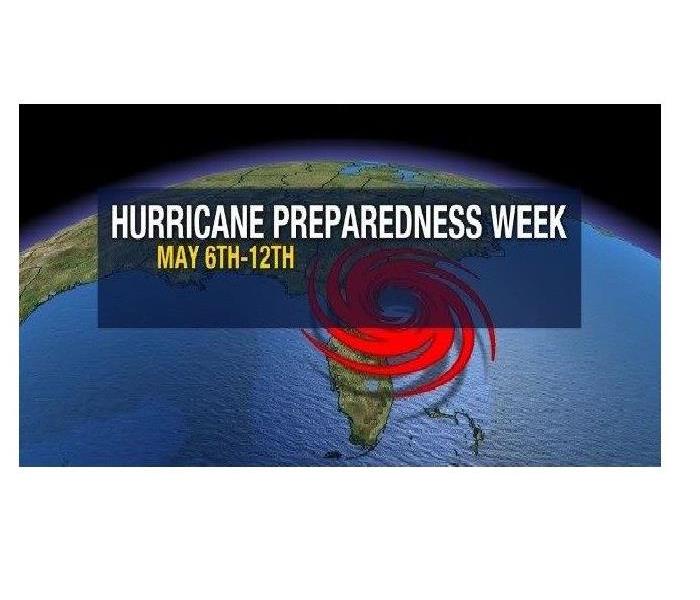 National Hurricane Preparedness Week May 6-12
National Hurricane Preparedness Week May 6-12
Hurricane Preparedness - Be Ready
While we are not located close enough to the ocean to feel a hurricane’s full effect on a regular basis, hurricanes always pose a wind and water damage threat to our property. Two keys to weather safety are to PREPARE for the risks and to ACT on those preparations when alerted by emergency officials. According to the FEMA, we can prepare for a hurricane by following this four stage guide:
Gather Information
Know if you live in an evacuation area. Assess your risks and know your home's vulnerability to storm surge, flooding and wind. Understand National Weather Service forecast products and especially the meaning of NWS watches and warnings. Contact your local National Weather Service office and local government/emergency management office. Find out what type of emergencies could occur and how you should respond.
Contacts
Communications is important during a weather emergency. Keep a list of contact information for these resources:
Emergency Management Offices, County Law Enforcement, County Public Safety Fire/Rescue, State, County and City/Town Government, Local Hospitals, Local Utilities, Local American Red Cross, , Local TV Stations, Local Radio Stations, Your Property Insurance Agent
Plan & Take Action
Everyone needs to be prepared for the unexpected. Your friends and family may not be together when disaster strikes. How will you find each other? Will you know if your children or parents are safe? You may have to evacuate or be confined to your home. What will you do if water, gas, electricity or phone services are shut off?
Supplies Kit
Put together a basic disaster supplies kit and consider storage locations for different situations. Help community members do the same.
Emergency Plans
Develop and document plans for your specific risks. Protect yourself and family with a Family Emergency Plan. Be sure to plan for locations away from home. Pet owners should have plans to care for their animals. The Centers for Disease Control & Prevention offer information on animal health impacts in evacuation shelters.
Evacuation
Review the FEMA Evacuation Guidelines to allow for enough time to pack and inform friends and family if you need to leave your home. FOLLOW instructions issued by local officials. Leave immediately if ordered!
Consider your protection options to decide whether to stay or evacuate your home if you are not ordered to evacuate.
When waiting out a storm be careful, the danger may not be over yet. Be alert for Tornadoes, as they are often spawned by hurricanes. The calm "eye" of the storm – it may seem like the storm is over, but after the eye passes, the winds will change direction and quickly return to hurricane force.
Recover
Wait until an area is declared safe before returning home. Remember that recovering from a disaster is usually a gradual process.
Resources
Here are some additional resources for Hurricane Preparedness
- Refer to the Federal Emergency Management Agency's (FEMA) gov/hurricanes for comprehensive information on hurricane preparedness at home and in your community.
Prevent Frozen Pipe Burst
12/26/2017 (Permalink)
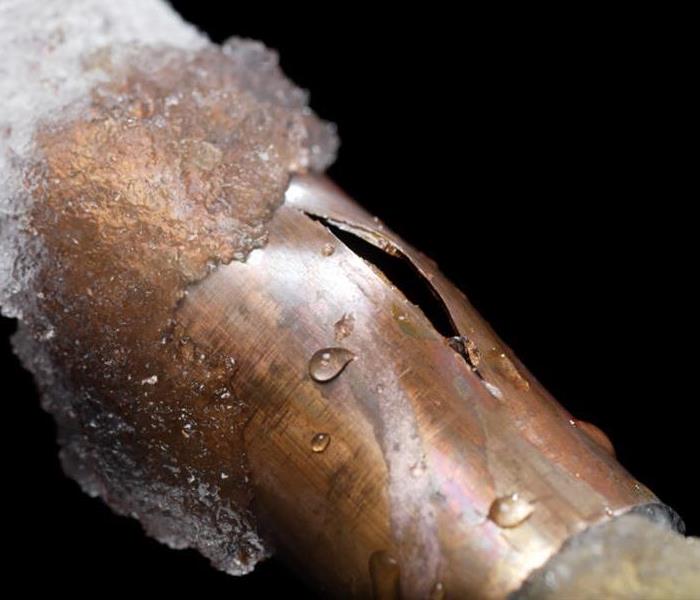 Frozen water pressure burst pipe.
Frozen water pressure burst pipe.
How to Protect Your Pipes in Cold Weather
How to Protect Your Pipes in Cold Weather
Frozen pipes are a tangible risk during winter in the Philadelphia,PA area.When the thermometer dips below 32°F, water begins to expand as it freezes. By taking a few steps now and during winter storms, you can prevent the costly damage caused by frozen and burst pipes. Here are a few tips on how to protect your pipes in cold weather.
Insulate Exposed Pipes
Pipes that are most vulnerable to freezing are exposed to severe cold. These include outside pipes such as water/lawn sprinkler lines or outdoor hose spigots. Unheated areas like crawl spaces, basements, attics, and garages, can also pose a risk to your unprotected water lines. You should insulate all hot or cold-water pipes that run through these areas. You may even want to insulate any exposed hot water pipes inside heated areas of your home to conserve energy and keep the hot water at desired temperature.
Products designed to insulate water pipes include pipe sleeves, heat tape, heat cables, or similar products readily available from your local plumbing and home improvement stores.
Add Insulation to Your House
Having adequate insulation in your attic, basement, crawl spaces, and even your garage can help maintain a higher temperature in your home. As a bonus, your heating usage could be reduced from prior years. (Saving your family money)
Drain Outside Lines
You should have your homes irrigation system drained and blown out before the freezing weather sets in. Follow the manufactures instructions or hire an expert to do this.
Prevent Frozen Pipes
When winter weather has arrived, let water from your cold line drip from faucets that are fed by exposed pipes. Running water is less likely to freeze.
Open cabinet doors in your kitchen and bathrooms to let warmer air reach your plumbing. If you keep cleaning supplies under the sinks, you may wish to relocate them away from the reach of kids.
If your best efforts result in a frozen pipe burst and that frozen pipe bursts damaging your home call the professionals at SERVPRO Whitemarsh/Cheltenham (610)909-6690
"Like it never even happened."
Understanding the cause of Christmas tree Fires
12/19/2017 (Permalink)
 Be safe gather with family and enjoy your beautiful tree.
Be safe gather with family and enjoy your beautiful tree.
SERVPRO of Whitemarsh/Cheltenham wishes one and all a very Merry Holiday Season. Be safe at home and on the road.
Facts about home holiday fires
- One of every four home Christmas tree fires is caused by electrical problems.
- Although Christmas tree fires are not common, when they do occur, they are more likely to be serious. On average, one of every 32 reported home Christmas tree fires results in a death compared to an average of one death per 143 total reported home fires.
- A heat source too close to the tree causes one in every four Christmas tree fires.
- The top three days for home candle fires are Christmas, New Year's Day, and Christmas Eve.
- Candles start two out of five home decoration structure fires.
SOURCE:U.S.FIRE ADMINISTRATION
Smoke and soot clean up
12/18/2017 (Permalink)
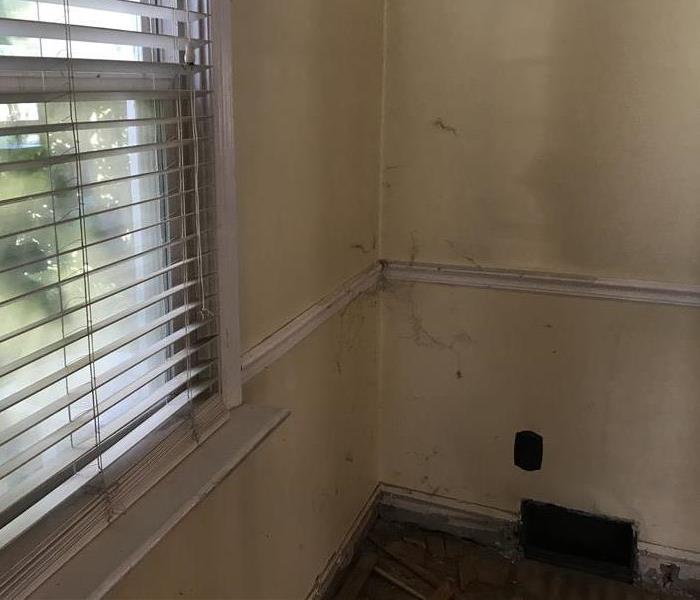 Smoke damage from a Dryer fire .The fire originated in the basement and effected every room in the home.
Smoke damage from a Dryer fire .The fire originated in the basement and effected every room in the home.
Smoke and soot are very invasive and can penetrate various cavities within your home, causing hidden damage and odor. Our smoke damage expertise and experience allows us to inspect and accurately assess the extent of the damage to develop a comprehensive plan of action.
Smoke and soot facts:
- Hot smoke migrates to cooler areas and upper levels of a structure.
- Smoke flows around plumbing systems, seeping through the holes used by pipes to go from floor to floor.
- The type of smoke may greatly affect the restoration process.
Different Types of Smoke
There are two different types of smoke“wet and dry. As a result, there are different types of soot residue after a fire.
Before restoration begins, SERVPRO of Whitemarsh/Cheltenham will test the soot to determine which type of smoke damage occurred. The cleaning procedures will then be based on the information identified during pretesting. Here is some additional information:
Wet Smoke Plastic and Rubber
- Low heat, smoldering, pungent odor, sticky, smeary. Smoke webs are more difficult to clean.
Dry Smoke Paper and Wood
- Fast burning, high temperatures, heat rises therefore smoke rises.
Protein Fire Residue Produced by evaporation of material rather than from a fire
- Virtually invisible, discolors paints and varnishes, extreme pungent odor.
Our Fire Damage Restoration Services
Since each smoke and fire damage situation is a little different, each one requires a unique solution tailored for the specific conditions.We have the equipment, expertise, and experience to restore your home from fire and smoke damage. Call today. Its the first step to professional restoration by SERVPRO "Like it never even happened."





 24/7 Emergency Service
24/7 Emergency Service








































































































